Kasim’s traditional Goblin upbringing instilled two primary convictions in life: of the incomparable value of treasure over everything else and the utmost importance of ceaselessly acquiring it. Kasim hence taught himself in the arts of grave robbing and theft from a young age, and always kept his ear pressed close to the ground – wherever rumors of treasure spread, there Kasim would try his luck.
For all of Kasim’s innumerable enemies throughout Aurelica, it must have the merchant convoys around the Crisas Desert that despite him most as his burgeoning group of goblin thieves have plundered the routes to their heart’s content with magical sleights of hand as to frustrate the most determined guards. Moreover, Kasim is only the most talented of this group of talented thieves covering such specialties as underground tunnel digging and explosive manufacture. Thus, Kasim and his merry band soon accumulated a surprisingly large fortune in just a few years.
Kasim’s band soon graduated to the richest isolated organization within goblin territory, rich enough to force even their supposed leader, Gubeg, to extend the hand of cooperation. Yet Kasim is no fool, and quickly realized Gubeg’s natural cowardice and over-reliance on the beast Horace makes him vulnerable to a change of government. Kazim has hence begun to plot alongside many of the other factions of Crisas for a way to assert himself as the goblin’s rightful leader.
 Want my gold?
Want my gold? 
Long gone are the days since the Bantus of Crisas held sway over Aurelica from the seat of their vast empires, or built magnificent structures imbued with magic rarely seen since ancient days. Centuries have come and gone, leaving little else but the sacred Ramoz Temple, still standing tall as an impressive sight to match the setting sun, and the occasional desert ruin. Today’s Bantus are few in number and, like Garrell, mostly devoted to the quiet patronage of ancient tradition from within their secluded Sacred Temple.
Garrell is a proud inheritor of the ancient customs of his Bantu elders, the which he has spent countless years honing with martial vigor within the sanctum of his people’s temple in Crisas. He, like many other Bantus, see the cultivation of mind over matter and the physical body as a means of unlocking the greatest power of all: the corporeal manifestation of one’s spirit in physical form, which the Bantus call the “Makuna”. Decades of training did not disappoint. Like many of his people’s greatest warriors, Garrell at last unlocked an extremely powerful manifestation of his inner spirit – a four-armed avatar of fire and power.
Garrell awoke from the blinding incarnation surrounded by a pool of fire, which radiated outwards from his slumped body on the floor. He stood, eyes aflame, hair flowing upward as if by a magnetic force and behind him the terrifying visage of the four-armed Makuna. Garrell turned his eyes to the horizon beyond the temple windows as he considered the power of his burning avatar. He now had the strength to venture forth and deal with Crisas and perhaps Aurelica as he pleased. But should he come in the manner of an avenging angel or a force of salvation?
 It burns! The Power of Makuna!
It burns! The Power of Makuna!
Hector is perhaps not so much a warrior as a belligerent force of nature, an aggressor among aggressors and a truly warlike man. Obsessed with combat and competitions, Hector defeated the strongest warriors of his native tribe before venturing further afield for more worthy foes, a pathway that inevitably took him, alongside many others of such an aggressive bent, to the “Holy Land” of gladiators – the Bloody Arena. The other warriors of Hector’s tribe had always spoken of the place in legendary tones, telling of its era of glory and the unequalled strength of the warriors there from across Aurelica. Regardless of the source of these stories, the sometimes ill-maintained Arena filled with desperados, slaves, exiles, and general lowlifes did not and could not live up to such glorious expectations. Hector finally arrived at Crisas after some time to discover a far more commercial and cost-focused organization than he had expected. A dream is a dream, however. Hector signed himself up, determined at least to conquer every challenger here as he had done for his own people. A new legend was born on that day, one in some ways more substantial than stories of the Bloody Arena’s might – for Hector soon after dominated all competition and made history as the Arena’s longest reigning champion!
 Nothing can stop me!
Nothing can stop me!
Gubeg, the chief of the desert goblins, obtained his crown by being more ruthlessly cunning and more cleverly deceptive than his only somewhat less crafty brethren, many of whom were sacrificed to Gubeg’s ascension. Such is the way of goblinkind. Gubeg possesses one advantage that those under him lack: a very powerful, poisonous little pet nicknamed “Horace”. Gubeg stumbled into a dangerous mantar lair on a poorly directed hunting expedition, but was lucky to escape both with his life and a small mantar egg on the verge of hatching, which became Horace.
The mantar are a rare, cold-blooded, and somewhat worm-like rotund species capped with horns and fish scales which inhabit the southern and western areas of the desert. The creature would be harmless enough were it not for the deadly poisons concealed behind their fangs, which can even kill an orc with one bite. Gubeg effectively adopted the orphan Horace by maternal imprint upon the creature’s birth, who has since become extremely attached to Gubeg as his dangerous animal bodyguard that Gubeg can also parade around his fiefdom upon his back. Goblins are, as a general rule, a somewhat disloyal race, and so it is perhaps thanks to Horace that Gubeg has lasted uncommonly long in his position.
 Better you die than me!
Better you die than me!
An unlikely leader in some sense, Urzag found himself in the position of Warchief of the Horde after narrowly defeating his former friend and warchief Orakh in a desperate struggle to save his people from the corrupting Dark. To his brothers, Urzag possesses far too many human qualities: compassion, a slight touch of introversion and unwillingness to fight. Yet his love and concern for the Horde and breadth of vision cannot be denied, and thus Urzag’s less “orcish” qualities can be tolerated. Urzag’s long journey to the rank of War Chieftain has provided greater insight than typically afforded the average ruling orc, a skillset he put to good use in the first challenge of his new reign: the invasion of the Azure Dragon. Urzag led Bruszakk and the other brothers in a great battle against Azure the Great, who had an unfortunate penchant for feeding on orcs and goblins. The mighty band eventually slew the dragon, with Urzag delivering the final blow. In true orchish fashion, Urzag then bathed in the dragon’s blood, confident that he is increasingly becoming the strong leader his warriors require.
 I was born to fight.
I was born to fight.
Former Warchief of the Horde, Orakh’s rule over his people can be characterized largely by his obsessive desire to return to their ancestral home – the Windtalker Plains, which is today firmly ensheathed within the territory of the Hirschbach Empire and guarded by its near-impregnable Solar Fort. Such ambitions would have remained mere wishes had it not been for an extraordinary new power revealed to Orakh by the Duke Nicklaus, who had made it his diplomatic mission to convert Orakh and his Horde to the Duke’s side in his battle against the Empire. Nicklaus revealed such power to Orakh at the Isle and burial place of the Holy King Carlos that would “easily allow your Horde to grind that cursed Solar Fort into powder”. And Orakh knew it to be true.
Nicklaus had found a willing recipient and, in time, Orakh and his brothers came to possess this dark source of power too under the guiding hands of his strange and terrifying High Priestess Valeria. Imbued by the power of the Chaos Shard, which Orakh had consumed into his body to wield the same power controlled by Nicklaus and Valeria, Orakh found himself transformed into the most powerful Warchief the Horde had seen in generations. Orakh realized he and his Dark-turned brethren now had the unquestionable ability to take back their ancestral lands and destroy the cursed Urzag, the last remaining thorn in his side.
 Death to traitors!
Death to traitors!
Barely a millenia old, it would normally be unthinkable for such a young Ice Dragon Princess to ascend to the position of Queen. These are not normal times, however, since the rapacious hunters of the Hirschbuck Empire have brought her kin to the brink of extinction. Hydrissea has often been tempted by Savanna’s path of vengeance, and yet seems to possess more forgiveness then her years would suggest. Unwilling to walk the Dark path of her esteemed friend, Hydrissea has instead withdrawn her people into the recesses of Dragonscale Marsh and away from prying eyes. Yet the Ice Dragons pseudo-retreat from politics has proven short-lived as a new darkness threatens once again to destroy all of Aurelica…
 Feeling chilly?
Feeling chilly?
Asrina was marked for suffering from her very birth as an outcast among the elves for her partial dragon heritage as well as an outcast among the dragons owing to her dishonorable half-breed status.
Asrina may have realized her lowly social status, but certainly not the full depravity of the dragon High Priestess Savanna’s plan for her life, one of the few the members of her adopted clan who treated Asrina with any kindness, until much later. Asrina had in fact been marked from birth for a very unusual ceremony handed down through the dragon clans for generations, and which demanded a sacrifice every thousand years to the ancient Dragon God in return for the gift of greater power than had been bestowed upon any of the other races in Aurelica. It was thought that the lack of a sacrifice, were it not met, would immediately call down the wrath of this divinity upon the entire species, and yet could be easily averted by the offering of a sacrificial lamb of sorts.
Thus, Asrina had been groomed from birth as the outcast of her tribe to fulfill her role in this ancient ceremony, marked before her birth by the previous High Priestess, and for her part Savanna felt partially responsible for Asrina’s unenviable sacrifice and an occasional moment of pity for the young lady destined for the flames. Yet somehow the sacrifice did not eventuate. A new and powerful faction never yet seen during the days of the dragons arose in Aurelica – the Hirschbuck Empire, and with them a powerful and dedicated contingent of mages specializing in hunting dragons. These dragon hunters had wiped out much of High Priestess Savanna’s people before her very eyes, prompting the once pious priestess to join the dragon liches in a desperate bid to save her people through a union with the Dark.
News of Savanna’s departure from the Light prompted Asrina to locate and plead with her former Priestess to turn back to their Dragon God. Savanna couldn’t care less about the Dragon God’s sacrifice or pleasing her wayward charge at this point, and bluntly revealed the true nature of Asrina’s ultimate fate had the empire’s Dragon Hunters never invaded their land. Asrina left her presence deeply shaken, determined to investigate the truth of the matter. True enough, the terrible destruction of her people had in fact saved Asrina from an even worse fate at the hands of her supposed kin. The invasion had liberated her to decide her own fate, neither elf nor dragon, nor beholden to anyone else in Aurelica…
Ultimately, Asrina survived the date that was supposed to have been the day of her sacrifice, on which there was no evidence of the Dragon God’s displeasure. Quite the reverse, in fact, as Asrina was struck by a bolt of lightning on that day which left her essentially unharmed and with a suite of new magical powers. Newly strengthened by her additional magical sensitivities, although greatly confused by their source and nature, Asrina is determined to turn the hatred for her former people, who would have rather sacrificed her than incorporate her into the community, into a campaign of destruction against all dragonkind…
 The dark fire consume you!
The dark fire consume you!
The cold-blooded Lizardmen dwell in the dense swamps of Dragonscale Marsh where thousands upon thousands of eggs are laid, incubated, and then hatched in vast birthing pools regulated by the humidity of the inhospitable bog. Tens of thousands of eggs can be expected to introduce new lizardmen to the ranks of the Hive with each birthing cycle. None could identify their parents, and would most likely appear indistinguishable from one another to the human eye outside of the physical differences associated with the four-tier Lizardman cast system. Lizardman eggs hatch randomly into one of four broad castes: Lizardmen, Lizardmen Brutes, Channelers, and Spectrals. Those born into the ordinary and Brute castes are effectively beasts of burden with very limited critical thinking skills. Channelers are capable of independent thought and can wield primitive magics, but the Spectral lizardmen are the brains of the Hive.
The loss of all Spectral Lizardmen over centuries of war with the dwarves dealt an enormous blow to the Lizardmen, giving the dwarves free rein to mine further and further underground and poison the adjacent Marsh with more and more toxic runoff and acidic smog. The recent birth of Ztlin has dramatically improved the Lizardmen’s fortunes, the first Spectral in nearly a century and probably one of the most powerful Lizardman sorcerers of the last thousand years.
Anointed the title of the “Great Prophet” by the Lizardmen soon after his birth and abilities became known, Ztlin, a figure of worship and veneration among his people, has led the Lizardmen out of their dark hiding places and into several successful engagements with the dwarfs. As a Spectral, Ztlin is capable of much more complex thinking than the lower castes, who are naturally obedient to their superior. Ztlin has in fact unified the Hive into an unbreakable unity through the aid of Channelers who telepathically convey his commands to the lower caste Brute and ordinary Lizardmen. Ztlin’s incredible telekinetic powers do not even require conscious intervention: a telltale sign of Ztlin’s ponderous meditations is a wall of shimmering energy that Ztlin’s mind automatically generates to shield itself from potential intrusions when vulnerable. This power can be channeled into violent electrical storms that have been known to tear well-made dwarven armor from their bodies like leaves blown by the wind. For all intents and purposes, the dwarves may appear to control the Mountain Kingdom, but Ztlin might already have the strength to flush these noxious inhabitants out with a concentrated strike with his increasingly massive army. Ztlin is nothing if not a careful planner and must be assured of victory beforehand. His forces have been steadily moving through the mines, attacking peripheral settlements while cutting off escape routes or trapping fleeing warriors with magic. Dwarves can only watch on in horror as contact is lost with one outer settlement after another, and from which no survivors return to tell of what happened. Ztlin knows the hour is coming when the Mountain Kingdom will once again belong entirely to the Lizardmen.
 I....am...TRUTH!
I....am...TRUTH!
The Fallen Dragon High Priestess Savanna has made a name for herself as an implacable enemy of the Imperial Hirschbuck Dragon Hunters and one dragon these predators truly fear.
A member of Aurelica’s oldest race of cold-blooded creatures with a history far more storied than even the oldest of human empires, Savanna spent many of the first few millennia of her existence following what she believed to be the Lord Dragon’s ancient will in protecting Aurelica and the human race, its younger denizens. Long still might the peace between humans and dragonkind have endured without the rise of Aurelica’s first true superpower, the Hirschbuck Empire with its endless army of fanatical Dragon Hunters able to strike at even the most powerful dragonkind. Vast hunting parties from the Imperial City soon culled great numbers of the ancient race.
The cruel slaughter laid the seeds of Savanna’s dramatic change. Slowly but surely, Savanna began to realize vengeance might be a necessary evil against the might of the Empire. It was this very path that has since drawn Savanna into the Dark One’s embrace, the life of a Dragon Lich, and an uneasy partnership with Nicklaus, who shares her hatred…
 Death will find you soon enough!
Death will find you soon enough!
The subterranean darkness under the rocks of the Mountain Kingdom conceal an ancient species known in the human tongue as “Lizardmen”. This peculiar species of cold-blooded reptiles lives in vast, subterranean habitats that no light has touched, close to the beating heart of the planet’s warm, magna core. Thousands upon thousands of eggs are laid, incubated, and then hatched in vast birthing pools regulated by the humidity of the deep underground and heat from the distant rivers of magma. Tens of thousands of eggs can be expected to introduce new lizardmen to the ranks of the Hive with each birthing cycle. None could identify their parents, and would most likely appear indistinguishable from one another to the human eye outside of the physical differences associated with the four-tier Lizardman cast system. Lizardman eggs hatch randomly into one of four broad castes: Lizardmen, Lizardmen Brutes, Channelers, and Spectrals.
Brutes are by far the physically strongest and largest of their species, capable of great acts of physical strength and none moreso than Mulhex, who towers above even the strongest of the other Brute Lizardmen. Mulhex’s mighty exploits against the hated dwarves of the Mountain Kingdom include the destruction of an entire battalion of well-armed dwarven scouts, which Mulhex achieved by laying extremely still in the deep ice for such an extraordinary length of time that even the Dwarven patrolmen became convinced of the safety of their surroundings. Nightfall came and Mulhex prepared to attack the sleeping patrol only to discover that his tail had effectively frozen into a block of ice. He ripped it off and then fell upon the sleeping warriors with fury in a battle from which few, among them future Elder of the Coldsteel Clan, Lordrec, escaped.
Mulhex brought the severed heads of the dwarves before the Lizardmen at the Hive, and Ztlin the Prophet declared that a notable marvel had been performed among them. Ztlin crafted a tail of shimmering ice and bestowed upon Mulhex a symbol of strength – the “Spear of the Prophet”. Mulhex has since achieved many further victories for the Lizardmen soldiers under Ztlin’s command, who has declared that the appearance of such a mighty Brute to be evidence enough of the gods’ will for the Lizardmen to finally drive the dwarves out of the Mountain Kingdom altogether.
 Bear the brunt of my anger!
Bear the brunt of my anger!
Yolanda sat cross-legged in an isolated corner of the Sacred Temple of Dawn. The complete silence was interrupted only by the rhythmic noise of her breathing as she focused her mind inward in deep meditation. Her spirit might as well have been in another world and, in a very real sense, it was. “Oh Light of the Dawn that I love and serve with all my heart, your most loyal follower pleads for your help! Our land, which has already endured much torment, is about to be struck by a fresh disaster of extraordinary brutality. I humbly ask for more power to withstand the Chaos and protect Aurelica.” Yolanda strained anxiously to hear whatever answer may come. She was sorely pressed.
“What power you have is enough.” A pure, gentle voice drifted into Yolanda’s consciousness with the unmistakable signature of the Goddess of the Dawn herself. “Is it enough? I feel completely helpless against the raging Chaos.” “Yolanda, you are a practitioner of the highest order in Light magic. You are a wielder of sorceries powerful and terrifying. They carry not only the power to save but also purge the evil of Chaos.” “Yet how do I make more effective use of such powers?” Yolanda replied in her mind’s eye. “You need not seek beyond the borders of what you have, Yolanda. Your powers are sufficient. You have styled yourself as the protector and healer of others until now. Perhaps you have forgotten you are more than a trustworthy guardian, but a fearsome warrior. Remember, the Light can both save and destroy.”
“Do not fear the all-consuming fire channeled by your Inner Light. Release it in full! And you will become a Sword of Judgment.” Yolanda suddenly became aware of the air against her face, the hardness of the floor, and her own breathing as she felt her spirit return, answer gained. The Goddess had revealed an alternative pathway Yolanda had little explored. No longer should Yolanda feel obligated to serve as the protector of all life. She must listen to what her Goddess had said. Clearly, the Holy Light had tremendous destructive power too. She must seek to become not just Aurelica’s protector, but Judgment Incarnate of the Light in the great war to come!
 All flesh will see
All flesh will see 
Flarence is the legendary lead dancer of Ruby Tavern, whose extraordinary skills and beguiling beauty has captivated the minds of the islands’ cynics on more than one occasion, particularly during their raucous annual festivals.
Many an unhappy drunk or degenerate gambler has passed a slightly more pleasant time on the pirate island of infamy thanks to Flarence’s presence, which would not be so curious were she not so talented an outlander who seems to be in search of someone or something.
The reality is Flarence is the Mysterious fifth leader behind the Island’s secretive ruling organization: The Hive, and in charge of intelligence gathering. Of course, Flarence is a popular topic of gossip for other reasons too, not least for her enigmatic relationship with the Ruby’s owner, Pluto, which unreliable witnesses have sworn involves late night dances and explains Pluto’s merciless, no-holds-barred treatment of any man that would dare besmirch Flarence’s good name.
 My next performance:
My next performance: 
Opal was fortunate enough to be born into a family with an unusually dignified pedigree – both her parents were captains within the Hirschbuck Empire’s Capital Guard. This imbued Opal’s early life with an extraordinary sense of parental expectation, reinforced when Opal was a mere 4 year old toddler with a dedicated training regimen combining military discipline, swordsmanship, and martial arts into the finest military education the imperium could offer as to hopefully transform Opal into one of its finest warriors. Her father’s crushing defeat in the Imperial Jousting Tournament at Lasir soldier Vance’s hands, whose magical abilities proved physical skills would never produce the mightiest warriors in the empire, proved a rude awakening. This revelation culminated in Opal’s transfer to the Imperial Academy, where her exhausting martial arts training would now be complemented by spellcasting.
Opal’s physical dedication and natural intelligence soon won plenty of admiration at the Academy. Yet Opal found something else as well: her first taste of freedom outside her family’s rigorous strictures. Alone and far from her overbearing father, Opal was free to discover other interests besides fighting.
It was in the Magical Artificer course at the Academy where Opal showed the most talent, earning the appreciation and friendship of her powerful mage-lecturer, Ankor. Ankor nurtured Opal’s talents toward the crafting of the unique magical weapon she still uses today – a ranged lance imbued with such unusual energies as to have quickly earned her a very fast captaincy in one of the empire’s border guard regiments.
It often happens that the fastest way to lose one’s dreams is to achieve them, and so it proved for Opal whose stint as guardswoman and chaperone to some of the most important, or corrupt, aristocratic families in the empire or imperial house quickly gave rise to a sinking feeling of despair in Opal’s heart. Opal’s unique magical education had allowed her to reinterpret many of the Guard’s enforcement actions as tyrannical plays to reinforce the status quo that rode roughshod over the peasantry. The noble ideas that Opal’s father had inculcated into her of loyalty to imperial house and empire began to fissure under the weight of cynicism. Opal found herself reexamining the Guard’s real role in the empire. Opal’s cognitive dissonance finally came to a head one day when her subordinates visited her chambers to find their captain had skipped town. Opal had finally seized the opportunity to leave the empire and its mechanisms of oppression behind…
 Fire away!
Fire away!
Boolin is a member of the Tachonians, a highly sophisticated civilization whose technology is largely built on an extremely powerful network of energy crystals providing nearly limitless cheap and accessible power.
Boolin and several of her colleagues at the Interdimensional Teleportation Laboratories Incorporated Lab No. 5 on Collan Street experienced a massive industrial accident some time ago, leading to the formation of a nearby interdimensional rift that deposited her and several other members of her team into the world of Aurelica with no way home and in a place lacking even the rudimentary understanding of subspace atomics.
Boolin and her compatriots have ultimately decided to make the best of the new lives by setting up shop in the Free Cities, where their unusual wares dazzles less sophisticated citizenry familiar only with the arts of magic.
 How does it feel to get
How does it feel to get 
Tia is known by many honorifics among the Talinese: the “Ruler of Talin”, the “Great Reformer of Talin”, and even the “Light of Talin”. Such titles must constitute an impressive pedigree given that Talin is one of the most distinctive and conservative of the human kingdoms of Aurelica – a strongly matriarchal society governed by one of the oldest continuing sets of traditions anywhere in the world, lying in the far southeast of Aurelica’s main continent. In a generally male-dominated world, women in Talin Society occupy all of the major seats of power – economic, political, cultural, and military positions in Talin society are all controlled by women. These Talinese traditions are also reinforced by several other unusual customs, such as an unspoken requirement on men to remain in the house of their bride upon marriage, and that women will remain in their parent’s household forever.
Outsiders may see Talin in rather less welcoming terms: a xenophobic, hyper-traditionalist matriarchy that has chosen to sacrifice the economic wellbeing of their people to maintain a distinctive cultural identity, ruled under the stultifying hand of a council of elderly matrons. However, Talin’s inward focus is as much a result of military considerations as tradition. Talin’s rulers are obsessively concerned with limiting their people’s exposure to foreign societies, powers, and different social structures in order to maintain as much social homogeneity and obedience is possible. The powers that be in Talin also place a high emphasis on martial arts and physical fitness, including compulsory service in the Talin Guard, all of which have contributed to a very hierarchical structure organized around several great Talin Houses or clans.
Tia’s ancestry can be traced back to Talin’s original founder – Anna Animalaya, and she has remained close to the center of power in Talinese society owing to her relationship by marriage to Talin’s previous ruler before her ascension. Tragedy struck Tia and her sister at a young age with the untimely death of their parents, the sisters thereafter raised in the queen’s household. The former queen quickly recognized Tia’s talent, who became the court’s chosen successor. Tia immediately faced a large set of problems at the head of her new kingdom: civil disturbances within and privateering without, the encroaching armies of the Hirschbuck Empire on Talin’s border, the stratified social structure of Talinese society leading to discontent among the lower classes, and constant shortages of supplies owing to Talin’s lack of trade with external powers – not to mention the ever-present threat of forced abdication should Tia try to address any of these issues in a way not approved of by the other major houses.
Rather than take heed of her own safety, Tia launched herself and the kingdom into a dizzying series of reforms in almost all areas of Talinese life alongside her co-descendant of Talinese royalty and “Lunar Blademaster” Imogen, her closest confidante and virtual co-ruler. Aware of the potential danger to her life posed by these reforms, Tia organized a course of study for her sister with the Academy of Magic in the Hirschbuck’s Imperial Capital where she would remain safe if Talin’s politics turned sour. Nathalia proved a quick study at the Academy, where her Coldsteel armor from Queen Anna and Frost Blade drew plenty of admirers from the Wizarding Halls. Nathalia returned later and, alongside Imogen, provided Tia with the backing needed to implement her vision for Talinese society.
Tia abolished many sinecure positions held by the nobility in order to fill their ranks with new talent; she opened Talin’s ports up to commerce with other cities and encouraged trade with the nearby Free Cities and city-state of Pegasus in order to provide greater employment and a lift in material living standards; she instituted free and fair reforms to the Talin Civil Administration to remove the bias against male examinees and the influence of connections and clout on civil service appointments to hasten Talinese development. Tia’s burning ambition to see Talin transformed into a modern and prosperous society drove a substantial improvement in the people’s living standards and won her the favorite of all her many honorifics: “Light of Talin”.
 At your service.
At your service.
Evera’s background, how she came to piracy, and where she acquired her “Sword of Thorns” and “Rose Fire” have remained a mystery since the day she appeared out of nowhere at the head of four pirate galleons to defeat a relatively powerful Imperial Navy expedition in the “Battle of the Gulf of Fire”. Evera’s name has since become synonymous with the “Rose of the Black Night” of Pirate Island throughout the entirety of Aurelica. The Mysterious Evera gained a seat on the “Council of Four” governing the affairs of the Pirate Island soon afterwards, and remains one of its most feared occupants. A lady of uncommon beauty, Evera has found no shortage of suitors, fair and foul, from among the pirates’ ranks, one of whom infamously went to the trouble of establishing a giant statue in the main town center to win her affections, which was then blasted apart by her musket as she declared, “A barrel of gunpowder is worth much more than a man’s love, and it will take much more than stones to win my heart”. Far from dissuading potential suitors, Evera’s confidence has only served to further confirm her reputation as the Island’s most eligible and yet most unattainable woman…
 Death is in bloom.
Death is in bloom.
The Halo of Dawn is a truly ancient organization. Even its chroniclers are unsure of exactly when it was founded or by whom, but there is little doubt as to its mission: to protect the peoples of Aurelica from the encroachment of the Dark One. The organization is well known and has been frequently called upon throughout the centuries to aid various kingdoms in their battles against the Dark. Most members of the Halo of Dawn work secretly behind the scenes to better perform their essential tasks. Some members, however, do choose to reveal their identities publicly, the most prominent of whom must be the Archmage of the Sacred Light, Yolanda.
Yolanda is one of the most powerful archmages in Aurelica, and probably its most powerful “Light” practitioner, a school of magic inherited from her mentor and well-placed to deal with the Dark.
Yolanda was born and raised a member of the Bantus many centuries ago on an entirely different continent. She was known as a light-hearted and inquisitive child, gifted in magic but unwilling to restrain herself to the animus magics practiced by her Paladin brethren due to her obsessive study of magic for its own sake. Her inquisitive nature as to its deep mysteries eventually led her to charter passage to the Hirschbuck Empire, where she enrolled in the Imperial Academy of Magic. Yet even their professors were unable to satiate her curiosity, and she began to explore other magical relics and notable mages around Aurelica. Her journey eventually led her to Sylvia, the mother of her apprentice Evelyn who, like Yolanda, shared a passion for research except, in Sylvia’s case, orientated entirely against the Dark One. The pair became inseparable.
Yolanda and Sylvia’s journey eventually led them to a small town on the outskirts of Talin that Sylvia suspected had been corrupted by the Dark. The pair were awoken from a troubled sleep to find themselves surrounded by aggressive villagers, that had been twisted somehow into darkling shadows of their former selves.
Yolanda realized that a portal to another plane lay open and exposed to the air within the village’s chapel courtyard. Invisible to the eye of the non-magic user, she could observe dark beams of poisonous energy snaking through the air, spreading a corrupting influence over all flesh. A blood-curdling scream came from somewhere deep within the Rift-world, and a pair of claws and demonic figure emerged. The young sorcerers knew their combat skills were about to be put to the ultimate test.
Yolanda deployed all her knowledge of the arcane to wound the demonic creature, which somehow shrugged off her attacks as if almost harmless, fully recovering from any blow of lightning or fire in seconds of regeneration. The Dark energy from within the portal appeared to be granting the demon renewed strength, and Sylvia barely managed to weave a protective enchantment of Light magic to keep the creature at bay. But time was running out. It was then that an overwhelming burst of Light magic enveloped the town, and burned the demonic creature to a crisp. Another mage? But who could possibly wield such magics? The new arrival dispelled the Dark around the village and returned the Rift back to whence it came. Thus was Yolanda inducted into the Halo of Dawn by her new archmage-mentor, and devoted to the same great work of saving the world.
 Miracles happen to those who don't give up.
Miracles happen to those who don't give up.
There is little doubt the new Queen of Talin could not have carried out so many impressive reforms were it not for the backing of her close friend Imogen, a Lunar Blademaster in the ancient ways and fellow descendant of Talin’s founders, and who worked behind the scenes to shore up her Tia’s powerbase. Imogen’s devotion to her queen is not without hesitation, however. As a disciple of the Lunar Blades, Imogen is well-aware of the story of the oath sworn by the first Lunar Blademaster with Queen Anna Animalaya to create a matriarchal society characterized by female empowerment. So the story goes that Talin’s founding as a matriarchy in Aurelica’s northeast was written into its founding moment.
Imogen differs from her queen substantially in temperament also, the coldness of years of harsh training in the Lunar Blademasters having tempered her propensity to smile, displayed particularly against Tia’s ebullient positivity. After all, Talinese folk myths have always held a special connection exists between the definitively female Goddess of the Moon and those women called into the rigorous life of a Lunar Blademaster, a profession said to be inaccessible to all men who lack the blessings of the matriarchal Lunar Goddess. There is no doubt that some strange sorcery is at play as this mysterious order of female ninjas can seemingly annihilate powerful enemies with odd, moon-shaped blades. Female empowerment is as much a source of pride as responsibility to the traditionalist Lunar Blademasters responsible in large part for Talin’s safety over the centuries.
It was Imogen perhaps more than any other of the new queen’s closest aides and advisors who worked behind the scenes to ensure her friend’s hold on power remained intact throughout her titanic reformations of Talinese society. A traditionalist at heart and representative of a highly traditional organization, Imogen could not disguise her growing discomfort with Tia’s pace of reform, nor her organization’s founding mission to ensure Talin’s matriarchy. Unlike some of her brethren, Imogen does however recognize that certain aspects of Talinese society needs to change, and supports and respects her queen’s desire to do so. Unfortunately, Imogen’s doubts have only continued to grow as Talinese society grows increasingly unrecognizable to many of their elders and similar to surrounding cities.
 Destruction knows no boundaries.
Destruction knows no boundaries.
The Order of the Holy Citadel claims to embody the “still-living will” of the Goddess of Light over Aurelica and dispense her boons to the rest of humanity. In their retelling, the Goddess never fell to earth during the War in Heaven, but remains present to guide and protect her pious followers.
Although the Holy Order shares the same roots with the Halo of Dawn, the two organizations have long since parted ways due to what the former considers the Halo of Dawn’s “unorthodox” embrace of powers outside the pure Light. One of the first steps of the first Archcleric of the Holy Citadel, Vane, was to declare any so-called “alternative guidance” and belief except in the Goddess herself an “anathema” to be wiped out. Vane’s chance to obtain religious purity came quickly enough when the two groups splintered.
As Vane’s Holy Citadel had come from the Goddess of Light, so too did he insist his clerics must unshackle themselves from any other power. The power of the Light must be enough; if it wasn’t, then it must be amplified by arcane ritual. Thus, the Holy Citadel organized great assemblies of clerics to magnify Aurelica’s Light element. However, as the rituals grew and magnified the strength of the Light, so too the Dark followed – particularly within the hearts of humankind. Of course, this was known only to the highest members of the Order – and then hoped against rather than openly admitted.
Time has whittled away at the Holy Citadel’s once-mighty edifice, today officially run by the kind-hearted and devoted Archcleric Rachel. She has only started to suspect the truth of her Order’s terrible choices throughout history and her role as a figurehead to its cynical factions. Nevertheless, Rachel is determined to replace the Order’s fervent propaganda and indoctrination machine with concrete actions to protect the land on behalf of the Light. She has also begun to realize the ill-effects of the Order’s rituals to augment the power of the Light, and would see the practice investigated and halted. For this reason, whatever true power of the Goddess resides in Aurelica can surely be said to reside by her side.
Archcleric Rachel may represent little more than a figurehead to the most powerful factional rivals – Edicris of the old guard conservatives and Urion of the pro-imperialists. Each seeks to use Rachel’s popularity to advance their own ends. On the other hand, Rachel has wisdom far more remarkable than her years and the courage to stick to her convictions in both the Light and her own sense of right and wrong above such petty squabbles. Indeed, her objective is nothing less than reforming the entire Order from within.
 The True Light
The True Light 
Before Nero finally ascended to the Hirschbuck Empire throne, not one member of the royal family had ever cared about this lowly son of a commoner. In the eyes of everyone, he was but a small pawn in a power struggle for the throne. Of former King Reinhardt’s 11 princes, both the seventh prince, with the backing of the imperial High Exchequer, and the first prince, who enjoyed close relations with the Holy Citadel, held an overwhelming advantage in this treacherous battle for the throne.
Nero was able to live a life in the royal court despite being the son of a concubine simply because of his special status as a “child born on the eclipse moon”. But still, no one but the superstitious Reinhardt believed the Master Astrologer’s words that “a child born on the eclipse moon was destined to possess formidable but destructive power.” Perhaps it was this prophecy that changed Nero’s fate.
He grew up accustomed to living alone under the contemptuous eyes of the powerful without anyone caring if he lived or died. To keep him safe during the cruel power struggle, his mother, an ordinary maid, began serving Princess Maisie, the highly favored mother of the seventh prince. She was a proud and domineering woman who showed great disdain for Nero and his mother while pretending to accept them only to show Reinhardt a picture of her generosity and kindness. Nero recalled that his mother would spend her daytime hours enduring miserable torture and humiliation under the court of Princess Maisie only to ensure he could accompany the seventh prince in receiving tuition at the magic and palace Academies. By night, she would doggedly order him to practice his spells, combat and all the other skills needed to make him stronger.
Ultimately, when Nero awakened the power of ice from his bloodline during a brutal and bloody battle, he realized that the Astrologer’s prophecy had always been true. Nero, who had rested dormant for many years, finally reached the moment to strike back. With Reinhardt seriously ill, those who had indifferently despised him in the past would pay for their actions…
 Soldiers hear not the cry of ants.
Soldiers hear not the cry of ants.
Geironul was once a mighty paladin of the Order of the Sacred Temple, inducted by baptismal ceremony into her Order by the Sacred Spear as its wielder with the imprint of the Order’s patron, the Divinity of Fire.
Geironul is no stranger to the savagery of field, having been rescued by a Temple paladin from her first battle at the age of 10 after which her induction soon followed. It was an era of darkness in which the powers of Chaos seemed on the cusp of prevailing over Aurelica, and during which Geironul solemnly swore to protect her land with all her strength against the Dark.
Geironul fought well, above and beyond the call of duty, but sadly lost her physical body and strength in the battle that claimed her. She should have died, but didn’t. The Sacred Spear provided a passageway of survival. What Geironul found on the other side was not death, but a long slumber in the Void.
Geironul felt herself alive a millennia later, strength restored. She immediately knew why she had been brought back: to guard Aurelica once more.
 Meditate on your sins, fiend!
Meditate on your sins, fiend!
Once the most distinguished female general in the empire, no noble nor official could hold a candle to her. She became a hero drawing everyone’s praise for her efforts to defeat the incoming invaders at the border. However, as fate would have it, she could have never imagined that it would be her integrity and self-restraint that would make her a thorn in the side of quite a few nobles.
To keep the family’s smuggling business from being discovered, Lydia had tried to bribe the iron-faced female general countless times, but was always turned away. However, one night she had to fight her way her way out of the situation, scarred and bruised. She was forced to blend in with a group of lowly slaves to escape her pursuers and was eventually sold into the Imperial Gladiator Arena.
Knowing that even if she did escape, there was no place for her in the Empire, she adorned an iron-faced helmet and became a rising star in the arena under the name Darcy. From then on, the Empire lost a valiant female general but gained a brave and ruthless woman fighter in the arena..
 I'm your worst nightmare.
I'm your worst nightmare.
As the last person remaining from the former city of Talinfall, Urion is one of a kind in many ways. Having survived, or rather – being the cause of, the downfall of Talinfall. Urion has lived a life of scrutiny.
Urion’s life started when he was created in a lab by Edicris and Gloria. Edicris and Gloria both were dedicated to channeling the powers of the Titans. Urion is the first being to be created purely out of Light Energy, aside from the Titans.
 Time for your baptism of light!
Time for your baptism of light!
Lydia is the daughter of the former High Exchequer of the Empire. She inherited her father’s position at a young age and so was appointed Manager of Finances of one of the wealthiest houses in the Empire while still in her late teens. The wealth associated with Lydia’s position has afforded her ample opportunity to give into every vice associated with greed imaginable, and Lydia has continued to build the family’s fortunes by engaging in morally ambiguous or unethical trade untouched by the other houses, chief among them her enormous trade in orcish slaves, which has quickly made her family perhaps the wealthiest in all Aurelica. Of course, with great wealth comes great friendships. The few enemies who would dare oppose Lydia will be silenced if not by the promise of vast wealth, then at the bidding of one of thousands of assassins or disloyal subordinates willing to take her offer.
Lydia’s family has come to symbolize the concentration of Imperial wealth in the hands of a very small number of aristocratic houses, a trend that appears set to continue as Lydia turns her able money management skills and administrative eye to the acquisition of new races and new territories for the Empire to expand her family’s “business” to the farthest reaches of Aurelica.
 The price is your life.
The price is your life.
Garnet spent most of her early days locked away within her adoptive parent’s estate due to the sickly disposition with which she had been cursed, with little else to do but study the piles of astrology scrolls and instruments littering her parents’ study due to their prestigious position as court astrologers. Garnet’s adoptive parents soon began to resent the needs of their sickly girl, a coldness soon reciprocated. The mother eventually gave birth to a son, Garnet’s “younger brother”, who thenceforth became the sole recipient of the entire household’s attention. It was on a routine astrology consultation that Muriel, the wife of a local duke, spied out the seemingly-insignificant Garnet from the large banqueting hall, and was immediately struck by her quiet and mature disposition. She found herself rather astonished the girl had not been introduced, something about whom reminded Muriel of a child she had lost years ago. She could not help but approach Garnet and, warmly extending her hands, asked: “Would you like to come with me? I’ll take you to see more of the world than these four walls.” Garnet was no fool and knew her options at home were decidedly limited. She agreed and, oddly enough, departed with Muriel the same day on the condition she be allowed to bring her astrology implements. Muriel quickly realized Garnet had the ability to become someone truly extraordinary without her sickly physique, and thus went to great expense to commission a mechanical marvel from the hands of renowned dwarven forgemaster Harbeg Moltenfire which, with a little magical help, transformed Garnet’s body into a half-copper, half-magical contraption capable of protecting her from the dangers of the outside world. Garnet’s adoptive parents never realized the true source of her sickness: tremendous magicks within Garnet’s body were simply too great for her human constitution to withstand, also explaining her aptitude for magical astrology. Muriel, delighted with her new “project”, drew upon her considerable resources to provide an excellent mage’s training with the benefit of Harbeg’s protective sheath. A strange symbiosis has since formed between Muriel and Garnet over the years. Garnet is happy enough to act as Muriel’s assassin on points of aristocratic business as long as she can spend the remainder of her time studying the stars.
 Thus ends your story.
Thus ends your story.
It was Valeria who turned my father into the Dark. I had always cherished the hope that something could bring him back… but now must acknowledge its futility.
I am not only a daughter of Nicklaus, but a descendant of the Priestesses of the Light and, like my mother, entrusted with a sacred obligation to protect our land. My father’s quest for revenge will never be satisfied until Aurelica lies in ruins. I still love my father even as I condemn his actions. I do not want to fight my father, but this is the cup that has been given to me – and a fight is all but inevitable.
Yolanda once told me it is better to store up strength to fight against the Dark One than to expend it to bring a soul back from his grip, but now I find myself unable to do either. I can feel the Darkness has snaked its way inside of me somehow. The connection I have to the Sacred Light through my mother is still inside, and yet when I try to commune with it I find it escapes my grasp. What is happening to me?
Yolanda has asked me to find an heirloom left to me by my mother – it is not just token of her love, but a tool that can help me channel my connection to the Light. Lasir’s crown tells me who I ought to be, the banners on the Holy King’s Isle tell me in what I should put my trust; the great longsword of Crisas what courage means; and the golden armor of the Dwarven Kings what it means to protect others.
I could not have awakened my inner Light without the support of my loyal friends, who gave me wings at my back. It is time to raise our swords against the Dark One! Onward!
 May the sword of the Light strike the dark!
May the sword of the Light strike the dark!
The visionary statesman known to later generations as the “Holy King Carlos” was the founder of the Kingdom of Lasir, yet his untimely death still left his people relatively unprepared for the incursions of other powerful city-states. Lasir eventually crumbled in time to might of the up-and-coming Hirschbuck Empire, which had quickly expanded into the neighboring kingdoms with overwhelming might. The former superpower of Lasir had been reduced to a mere vassal state of the empire and Nicklaus, a direct descendant of the Holy King, was forced to curry favor with the imperial court from a young age in order to guarantee his people’s safety.
Nicklaus proved a capable right-hand man to his fatherly duke: strong, confident, and keen of mind with grand ambitions of recovering Lasir’s lost glories. Nicklaus even develop something of a following among the Imperial Guardsmen during his long stint as a Captain in the Hirschbuck Regiment as appropriate to the son of a ruler of any subservient vassal state. Nicklaus’ military command, experience on the field and the statecraft offered by his trusted advisor, the High Pontiff Valeria, saw Lasir’s fortunes rise quickly in comparison to its “mother” empire and engineered its upgrade to a “duchy republic”. Unfortunately, the Duke’s newfound popularity later became a wretched thorn in the side of the young new Emperor Nero, who was keenly aware that the internecine squabbles of the Court could make his position highly vulnerable at the first sign of weakness. The Emperor hatched a plan to deprive the Duke of his wife and daughter, and then had him removed from imperial command and his regiment in humiliating fashion. Even then Nicklaus’ fate had been somehow bound up already with the dark power beyond the seal near his ancestor’s tomb – whether because of the deeds of the Holy King or some other reason. Nicklaus began to hear faint voices, whispers in the dead of night encouraging him on a path of vengeance and further and further away from the ideal concept of the ruler set down by the Holy King. The sword of the Imperial Guard hung perpetually over the Kingdom of Lasir like a knife at the people’s throat, and so desperate was Nicklaus for a solution to his troubles that he gave ear to Valeria’s most sacrilegious and terrible scheme.
 Bend the knee! This world is mine!
Bend the knee! This world is mine!
The Duke Nicklaus’ betrayal of the Hirschbuck Empire would hardly come as a surprise to any noble with a keen eye for current affairs. The new Emperor Nero of the Hirschbuck Dynasty had already built up a reputation for resentment against the descendants of the Holy King and their duchy by the time the vassal state severed itself from the empire in open rebellion. Yet the Emperor had underestimated the strength of Nicklaus’ determination, and there was much mourning in the Imperial Capital on the day of the Declaration of Severance among generals and soldiers wiser than he.
Yet the might of the empire prevailed, and Lasir soon found itself bereft of more than half of its former territories. It was at this despairing juncture that High Pontiff Valeria of the Order of the Sacred Fire found an opportunity to move her long-awaited suggestion: a visit to the Isle of the Holy King Carlos in the hope that some great power may have been locked away in his tomb. The expedition forced its way to the dark magical seal near the Holy King’s sepulcher and immediately made two discoveries: a rift had been opened here at some point in the past into our world from a plane of pure, chaotic energy and that, secondly, any force to wield such an energy would become effectively invincible! This was reason enough for Nicklaus to dabble in a magic that he did not understand to save his people and avenge himself on the hated Hirschbucks.
 Your judgment day has arrived!
Your judgment day has arrived!
Valeria is the High Priestess of Lasir, Pontiff of the Sacred Fire, and the highest ranking official in the land with the exception of the Duke of Lasir himself. Valeria’s control over the Order of the Sacred Fire, a religious organization founded by the Holy King Carlos himself during his battle against the Dark One, conveys unquestioned legitimacy to her authority. The people of Lasir can be confident that the Order, worshippers of the Sacred Light and Fire, will continue to guide the kingdom on its way forward through these difficult times and that the Duke has the loyal support of his High Priestess in the defense of their people.
Valeria played the part of a loyal emissary of the Order for many years before her ascension to the Pontificate – travelling Lasir, spreading the Light of the Sacred Fire to the people, hearing civic complaints, resolving issues, and recruiting more acolytes.
Her decades of service were finally rewarded many years later with a coronation as the new High Pontiff to the acclaim of the people and her colleagues, delighted at the prospect of such a pious new leader of the Order. Nicklaus quickly recognized Valeria’s keen eye for politics and economics, and Lasir began to prosper greatly under Valeria’s various reforms, eventually earning a promotion from vassal state to “Duchy” within the suzerainty of the Empire. Valeria appeared as nothing if not a pious servant to the great Duke Nicklaus at court during this time, and even he perhaps did not realize the true extent of Valeria’s power in Lasir and just how many of her objectives were quickly coming to fruition.
“Hear the will of the Goddess and be guided, oh poor souls, oh lost travelers!”
 Do you know who I am?
Do you know who I am?
The dark ship on dark waters had travelled many leagues to dispatch its cursed cargo into the quiet stillness of the sea. It was believed physical distance and extremity could do away with the artifact where destructive spells had failed. As the sailors above gleefully rowed back, another presence beneath jumped for joy. Liberation!
The enchanted armor given the name “Andre” was a product of arcane brilliance as frustrating to the inferior sorcerers that superseded its creator as it was impossible to replicate or nullify. Unable to destroy the artifact, the other mages decided to dispose of it where evil could never reach. Little did they realize the same method had been followed many times in ages past and, as fate would have it, the same coordinates in this instance.
The “Megalodon”, the bloodthirsty shark-like sorcerer near where the armor landed, was now a white carcass of bones attached to a chain on the ocean floor. Yet he had learned the secret of maintaining conscious beyond the physical in his day. The “Doomanchor”, attached to the other end of the chain, had been meant to bind the entity to the ocean trench according to the early human sorcerers who had crafted it. Although weakened, Megalodon’s powers were sufficient to perform a simple transmigration. He immediately entered the enchanted armor and, more fortunate still, realized its elemental attunement also granted control over the Doomanchor. It was a surprisingly decent weapon.
“Your forefathers may be dead, but I will not forgive you, humans, for centuries of captivity! Prepare to meet your doom!” Megalodon lifted the Doomanchor with Andre’s hands in triumph. Revenge would be simple and sweet…
 No one
No one 
A daemon commander from the ancient world, Balberith existed before the continent of Aurelica was formed and will likely persist after its destruction. A cunning Emissary of Chaos, Balberith is a far more dangerous opponent than virtually any other known creature. His two scimitars are enchanted with demonic energy to strike fear into weak-kneed opponents and his wings of bone are themselves dangerous blades, although few could survive an encounter with Balberith to inform others of this fact.
Little is known about Balberith except that at some point he was defeated during the War in Heaven, and cast down into Aurelica, where he worked tirelessly to grant the Dark One unfettered access to our plane of existence. Balberith soon gathered numerous Dark-aligned species into an unholy legion, which he flung against the dwarves of the Mountain Kingdom and their “impregnable” fortresses surrounding the Rift.
While Darklings threw themselves against the battlements, Balberith soared to the ramparts and made a cruel slaughter of its defenders and their mechanisms. The dwarves looked on in horror as Balberith’s army leveled the so-called “key” to the Mountain Kingdom, the Bastion Gate, exposing the Rift and the dwarven cities to the Hand of Chaos.
Yet the dwarves did not fight alone that day. For the first time in many millennia, the Titan of Iron personally intervened in the affairs of mortals. The Titan cast Balberith into the Rift after extracting the daemon’s heart, which was to be kept safe by the ruling Molten Clan. The Titan then strictly charged his servants with the safeguarding of both the Rift and now “Heart of Fire”, warning the dwarves that neither the Dark One nor Balberith must ever be allowed to set foot once again in Aurelica without dire consequences.
 This is how your world ends!
This is how your world ends!
Ciara’s early life was characterized by an absurd mix of privilege as a member of the nobility and powerlessness as a woman living under the highly patriarchal society of the Hirschbuck Empire. As Ciara noted with bitter irony, commoner imperials and peasantfolk were often blessed with freer, more independent lives than the relative highborn. She came to appreciate this fact through the loveless marriage forced upon her mother and the tragic death of her betrothed sister. Ciara knew that any hope of relieving her plight would have to come through magic – the ultimate meritocracy that allowed spell casters of any background to transcend their circumstances. Ciara spent long nights obsessively studying the magical arts, building a powerful skill set that could realistically grant her an independent life within the harsh Imperial society. Ciara’s drive and determination did not go unnoticed by High Priestess Valeria, who took the most unusual step of seeking a private audience with Ciara in her chambers at the Academy. Valeria revealed the full extent of the power she could access simply by bending the knee to the Dark One, an offer the desperate and somewhat ruthless young noblewoman was only too eager to accept. Her father’s ham-fisted attempt to cement the family’s fortunes by marrying Ciara off to the same cruel prince whose disrespect had been the original cause of her older sister’s death became the grim occasion by which the public learned of Ciara’s frightening new powers. Ciara played the part of an obedient aristocrat by attending the engagement banquet. She chose her acceptance speech as the moment to reveal her newly acquired skills, unleashing a hellfire of fire magic against her betrothed’s family which the royal house guards were powerless to prevent. This infamous massacre forever cut Ciara off from the society of her birth. She fled the Imperial Enforcer Mages under cover of night and threw herself upon Valeria, who took the aspiring but rather bloodthirsty young mage under her wing. Ciara has pledged herself to Valeria and to the Dark, and even now works in the shadows on behalf of Nicklaus and his grand plan.
 Darkness has chosen me!
Darkness has chosen me!
When people tell stories of the legendary companions of the Holy King, perhaps the first member of his inner circle to come to mind is the Great Archmage Micah, who fashioned the legendary enchantments on his holy tomb, or perhaps the now cursed black dragon Agulis, flying high in the sky? Fewer commoners will be aware of his other trusted aide, Abaddon who Dwells in Darkness a terrifying figure wielding a grim reaper’s scythe who often struck fear into the hearts of the King’s enemies.
If we can say the Holy King brought the True Light to Lasir, then Abaddon did the same from the shadows, removing Carlos’ enemies and clearing obstacles away so that his greater purpose could be fulfilled. As Abaddon said himself, he moved among the people like a reaper during those heady days when Carlos was founding his kingdom, enabling Carlos’ plans by the terror he would inspire. Abaddon’s own identity and past have likewise been concealed in darkness, behind the black armor and gruesome mask with which he shields his face or choice of weapon in combat.
Perhaps only those who have tasted of the true terror of the Dark One can appreciate the lengths that Carlos felt he had to go to in order to protect the people from this apocalyptic, world-ending threat, no matter the human cost. Times were certainly different then. The Dark ran rampant through Aurelica, turning men into beasts with all the unstoppable motion of a tidal wave. Abaddon, a pious priest in the service of the Goddess, had taken refuge with some of his people in her chapel and, while praying for protection, came face to face with the power of the Dark’s servants who began massacring his companions. He struggled valiantly with his loyal band of clerics, and had almost fallen when Carlos and his disciplined soldiers arrived.
Abaddon’s prayers had been answered in miraculous fashion, from which point he began to see Carlos as a kind of Son of the Light held aloft by the Goddess. So great was Abaddon’s devotion to the Goddess and her “Anointed One” that his faith remained even throughout the less than noble acts the Holy King took in defense of his Kingdom – murder, execution, and blackmail were seen as necessary to uphold the fraying civil and social order. Abaddon served without complaint as one of Carlos’ most trusted right-hand men behind the shadows, a man of faith to a Holy King who had none, as Carlos often said: “The Goddess may not save us. We have to rely on ourselves, and that is exactly the kingdom I’m going to be building for them.” Carlos’ increasing ruthlessness as king was met and matched by Abaddon’s dark presence behind the scenes “for the greater good.”
 There is no surrender, only death!
There is no surrender, only death!
Young Gangelo was born into an aristocratic family in the Imperium and rose to prominence for his talents in alchemy, particularly original research. However, Gangelo’s pursuit of new recipes changed his life forever when a new concoction suddenly exploded, flattening his estate, seriously injuring Gangelo, and killing most of the members of his family except his younger brother, Agzul, whom Gangelo awakened to find had barely survived.
A desperate Gangelo spared no concoction, experimentation, or school of black magic in his attempt to save his brother’s life, and finally succeeded in creating a new host for Agzul’s barely functional, fading body: a human, semi-insectlike creature to which Gangelo could safely transplant Agzul’s vital organs.
The creature, half-Agzul, half-monstrosity, managed to stand and move about with some independence, but discovery of Gangelo’s “experiment” forced the Imperium to prosecute and imprison the wayward alchemist as a threat to “public safety”. Agzul escaped the Imperium’s attention and teamed up with another unorthodox “scientist” named “Desmond”. The pair ultimately succeeded in breaking Gangelo out of prison, providing him a new life as Soulplunder’s chief alchemist.
 There is no escape from the plague.
There is no escape from the plague.
Desmond graduated a young healer mage from the Imperial Academy with specializations in healing, potion-making, and summoning, and quickly became highly a sought-after expert. If Desmond’s clients could complain about one thing, it was perhaps that he tended to focus only on those patients least curable or closest to death, a strange habit that began to arouse a general suspicion owing to the unexpected deterioration in many of his cases, which could not be explained by the use of ordinary healing magics. Desmond had, in fact, been experimenting on his sickest patients with entirely new, unpredictable concoctions. Desmond’s first brush with expulsion occurred at the hands of a colleague who threatened to expose him upon the discovery of the unethical potion experimentations. Desmond managed to delay his colleague’s report to the authorities with an artful appeal to his compassionate practice of euthanasia for critically-ill patients, but then took the opportunity afforded by nightfall to quietly slip in and assassinate his colleague.
This was only the first in a series of inexplicable events at the hospital that raised general suspicions Desmond’s way. Indeed, Desmond began to sense that he was not long for the medical profession. It is true that Desmond had initially only experimented on those subjects that were, for all intents and purposes, merely hours or days away from certain death, but he felt that even this defense would not win over his colleagues and he had, moreover, also taken a peculiar, twisted delight in the act of accidental murder on several occasions. Desmond realized that he truly enjoyed the feeling of absolute power over people and, in later months, had become truly careless with the types of victims to which he had directed his experimental concoctions.
The day finally came when Desmond was forced to flee as a fugitive from the Empire, but his magical prowess ensured that he remained an elusive target to the Imperial Guard who were often frustrated by his ability to summon a flock of crows seemingly at will to evade capture. Desmond spent years hiding in the far-flung Eastern and western border regions until the prospect of treating an endless host of ill patients attracted him to Pegasus once news of the plague outbreak reached his ears. Desmond found his services as a doctor in high demand once more in Pegasus, and has been thrilled ever since at the prospect of donning his raven skull mask and applying cruel enchantments to despairing plague sufferers.
 Fade away into oblivion!
Fade away into oblivion!
The taurens are one of the few races in the diverse group known as the “beastmen” of Bloodbeast Jungle to possess an affinity for elemental magic, making taurens effectively the Jungle’s exclusive shamans among whom the Elder Shaman Blackthorn may be the most talented.
Blackhorn is a kind-hearted tauren with the strength of an oak tree and compassion to match, with a natural talent for leadership that stems for his concern for all the creatures of the jungle. Blackhorn’s devotion to the forest has been rewarded in equal measure by the favors of Gaia and the Goddess of Nature, who have liberally bestowed upon him the ability to summon thorns, thistles, the protective powers of nature and woodland creatures. Blackhorn’s reputation for wisdom and philosophical insights has earned him the respect of other leaders, even those far beyond the jungle such as the ordinarily haughty elves of the Astral Forest and the diverse races of Crisas Desert thanks to Blackhorn’s willingness to lend a hand to those in need. He is known far and wide today as the “Kind Master” of the jungle.
 Mother earth bless us.
Mother earth bless us.
The mighty Astral Guard has a long and storied history from before even when the elves began their long migration from Phoenix Mountain, and is open only from the most elite of elven warriors, the movements, decisive actions, and devastating military precision of which has saved the elves of the Astral Forest from potential enemy advances on numerous occasions.
The commander of this legendary outfit is none other than Tashir, a warrior with only around a millennium of experience in the ways to her people, making her a relative newcomer to the Guard compared to her typically longer-lived brethren. Tashir cannot be considered the finest swordswoman, strongest markswoman, nor physically most impressive captain, but any such physical shortcomings are more than compensated by her extraordinary intuition on the battlefield and ability to preserve the lives of her fellow guards, allowing her unit to dominate opponents on many occasions even when significantly outnumbered.
Thus was Tashir selected as commander of the Astral Guard by the sacred starlight artifact. Tashir’s bravery and skill on the field have been a significant part of the reason why life in Sylvan Forest and even areas near Bloodbeast Jungle has become significantly more peaceful of late.
 My starlight will take you to the hell.
My starlight will take you to the hell.
The young Bachelard lived a rather isolated existence alongside his frail and sickly mother on the periphery of the Leopard Clan of Bloodbeast Jungle who prize strength and power above all else and hence found little place for the mother and her son in mainstream society.
A mighty warrior himself, Bachelard’s experience of ostracism provided something an unusual outlook on life and unlikely friendship with fellow outsider Alessia, a human girl taken in by the Chieftain as an act of kindness, but who likewise had trouble integrating. Bachelard spent much of his days as a youth exploring Bloodbeast Jungle with the frail girl, a friendship that might have blossomed into something more were it not for a cruel incident that forever separated her from the Leopard Clan. Years passed as did the vividness of Bachelard’s memory of her.
Even a poor specimen of Leopard Clan strength, such as Bachelard’s mother, could not stop the young cub and now perhaps mightiest Leopard warrior of his generation from winning considerably greater popularity among clansfolk who had in earlier years been happy enough to ostracize the two. Bachelard found himself the recipient significant attention, envy from his male peers and interest from females impressed at his extraordinary feats of strength. Yet Bachelard had in some way grown cool to the favor of his clansfolk and, perhaps from his earliest experiences as an outsider or the unusual friendship of his youth, pined for a life outside the Jungle and to recapture something lost with the departure of his childhood human friend.
 I'm relentless.
I'm relentless.
Godfery is an ancient entity known by some as the “wildman” or “wiseman” of Sylvan Forest, respected by beastman and elves alike for his gentle temperament, insight, and the occasional peacekeeper role he has been forced to play between the other races.
Perhaps the enigmatic Godfery was once also like one of the hot-blooded younger races, prone to conflict and to the resolution of disagreements by magical spellcasting, but the millennias have taken away Godfery’s harder edges as he is slowly come to understand the significance and importance of maintaining a peaceful forest and thus has taken upon himself the role of the forest’s secret guardian, and frequent “indweller” of the Starlight Altar.
If any mortal is likely to know of his true nature and origins, it may perhaps be Virgil who, along with his fellow warriors, was saved from the hands of the dark elves by one of Godfery’s infrequent interventions into the affairs of other races during the terrible elvish civil war around the time of the destruction of their Phoenix Mountain. Godfery acted behind the scenes, recognizing the threat the dark elves and the Chaos Rift posed to the rest of Aurelica, and provided invaluable insights that allowed Virgil to gain the upper hand during the bloody conflict. At most other times, Godfery is more of a neutral arbiter or bystander to conflict unless it impinges on what he regards as the “side of nature”.
Thus, did Godfery intervene during Virgil’s momentous sacrifice to collapse Phoenix Mountain on his own body in a desperate effort to destroy the Chaos Rift and block the demons’ endless access to the Elvish Realm, which he accomplished by helping Virgil complete his inexpertly-woven spell in such a way as to achieve its desired effect. Godfery also assisted Virgil by keeping his spirit back on the mortal plane, thus allowing Virgil’s associate, Mytheasia, the ability to retain Virgil’s essence in physical form, a most unusual feat.
Godfery returned, as he always does, after this intervention to his quiet home in the forest, although he has been known to play occasional chess games with Virgil’s spirit from within the Starlight Altar on the occasional visit. Thus Godfery has made only a handful of interventions into the mortal realm over the last millennia, although recent events with the renewed rise of the Dark One and Soulplunder may force Godfery’s hand once more.
 Show them the real power, My birdies!
Show them the real power, My birdies!
There is no doubt that Siress is a very powerful dark elf albeit without the allegiances her racial epithet would imply. Unlike her sister Santis, a devotee of the Soulplunder cult, Siress holds little reverence for the Dark One or his powers on account of his numerous failures over the millennia to gain an enduring foothold in Aurelica. To Siress, heady promises of endless life or infinite power associated with these sects pale in comparison to the more enduring promises of self-reliance.
Siress’ philosophy thus conflicts substantially with her sister’s, forcing the two to part ways as Siress – a perpetual loner thanks to her dark elven heritage – seeks ways to strengthen herself against all others. A lengthy exploration in search of ancient, powerful magical artifacts led her at last to an abandoned temple deep in the Jungle of Neftafar containing a sacred alter and a serpentine-shaped sword upon it. Siress became aware immediately after touching the artifact that she may have made a grave mistake as the energies within sprang into her with a power that even she, a lifelong sorcerer, could not control. Siress’ body fell unconscious as her mind entered a perpetual nightmare in which she found herself slowly drowning on a stormy ocean surrounded by never-ending blasts of lightning. In her mind, she imagined that the artifact, perhaps represented by the storm or perhaps by the water, arcing bow after bow of electricity into her drowning body, each one carrying the pain of a thousand Fireburner stings. The water began to suck her deep beneath the waves, but she knew that the enchantment woven around the artifact would take her life if she allowed herself to give up. No! She struggled for air and the chance to take vengeance against all those who had oppressed her.
Weeks passed in this agonizing nightmare, months even. She could not be sure as it appeared to be on a different plane to her mortal body. Eventually, something within her began to absorb the strength of the lightning flashes that arced down upon her defenseless body. She realized the flashes were not punishments from the artifact but individual gifts of power. Siress eventually opened her eyes. She was once again back in the temple under the altar, thirsty, emaciated, starving, sword in hand. She steadied herself and stood up. The sword glowed, and made a full circle before resting once again in her hands: her powers recognized, her strength restored. The only question remaining was what to do next. Siress would need to spend some time in the temple, studying this ancient civilization and the sorceries of whoever had crafted such a weapon. She would need to wield it perfectly for her in the coming battles.
 I’ll drag you straight to hell!
I’ll drag you straight to hell!
Any elf today would no doubt identify High Priestess Mytheasia as the strongest magic user amongst her people and their greatest living leader. Mytheasia has devoted her life to the elves and indeed all races of Aurelica more broadly with her prodigious magical powers, kindness, compassion, and charisma. She has served for years as a custodian of the Deep Magic of the greatest elven sorcerers and guide to her people through many difficult periods.
Mytheasia was marked from birth by the Protector Goddess of the elves according to legend, who anointed her forehead with a horned mark representing the Spirit Tree – and a token of the Goddess’ blessing upon her. Whether it is for this reason or not, Mytheasia has always enjoyed far greater access to sources of natural magic then her peers, as well as a rare skill to communicate with and command the plants and creatures of the forest.
The elves underwent a period of terrible suffering during their long campaign against the Dark One, culminating in an elven victory over the forces of the Dark at the Battle of Phoenix Mountain. Their homeland destroyed, the elven “Phoenix King” Virgil and his closest advisor Mytheasia made the decision to migrate eastward to Sylvan Forest. The forest’s new masters had to immediately decide what to do with the existing inhabitants of the woodlands and other refugee races from the War Against the Dark, including numerous beastmen who faced their own struggles. The decision was made to leave East Sylvan to the beastmen, which became known as “Bloodbeast Jungle”, who agreed to help protect the forest from any further incursions from the Dark, whereas the elves would settle into West Sylvan Forest, which soon became known as the “Astral Forest”. Trouble began almost immediately afterwards as the servants of the Dark sowed discord amongst the new beastmen arrivals, eventually turning many into twisted versions of their brethren – the so-called “Chaos Beastmen”. Mytheasia made the decision to risk elven lives to prevent the Dark from gaining a foothold in the nearby Bloodbeast Jungle, but the elves were badly stretched by a secondary incursion of dark elves. The Astral Guard eventually prevailed, but the conflict had taken a terminal toll on Virgil the Phoenix King, who fell into a deep slumber within the Starlight Altar. Elven leadership therefore passed to the High Priestess Mytheasia, who now had the dual responsibilities of chief sorcerer and leader of the elves.
Mytheasia used her knowledge of arcane sorcery to construct a great artifact in East Sylvan – the “Moonwell”, with waters to heal the forest from the long war against the Dark, and which gave rise to East Sylvan’s more common name today – the “Astral Forest”. The elvish population, decimated by the war against the Dark and terrible losses at the Battle of Phoenix Peak, began to recover amid the longest period of prosperity and peace their people had yet known. The younger elves know little today of the horrors their parents once battled, now more than a millennia in the past. As Mytheasia surveys the prosperous elvish state, in which her younger brother Antinua is also a major leader, she cannot shake the feeling that the days are coming when her people will need to summon their Phoenix King once more from the Altar.
 I must protect the forest.
I must protect the forest.
A blinding flash and tremendous roar from the Starlight Altar nestled within Sylvan Woodlands summoned the elven people with one accord. Its great entrance rolled open with a groan as the assembled people beheld the sight of their once and future king: Virgil. Virgil’s physical body may have been destroyed centuries ago by invaders, but his spirit had been saved in incorporeal form within the Altar thanks to the High Priestess, bound to a protective slumber. Years of pious prayers from Sylvan’s remaining elves were answered with a heavenly sign portending his reawakening. One of the night’s stars dislodged itself unto the altar, its energies filling the enchanted space as a new, improved set of armor began forming around a representation of Virgil’s slumbering spirit. The entity wrapped within gradually woke under its extraordinary power . “Praise the Astrals who have seen fit to protect our righteous king!” The elves chanted as the king re-ascended his throne with wings of outstretched light declaring, “All who dare trespass upon the Elves and Sylvan Woodlands shall be destroyed!”
 The Light teach you!
The Light teach you!
Thor of the werewolves and Wolf Clan Chieftain is a mighty although reclusive warrior-leader happy enough to remove himself from the affairs of other races except insofar as the dignity of the Wolf Clan is at stake. To this end, Thor, like many of his fellow werewolves, possesses a set of extremely aggressive instincts that, when triggered under the right conditions (such as on a full moon) lend his kind near-supernatural strength at the expense of higher-order faculties. So great is the sheer “brawn” gifted to these werewolves of the clan that the ability of a wolf to trace his or her bloodline back to a bearer of this power has become a mark of great honor, from whose stock the Chieftain of the four great tribes is perpetually chosen as in the case of Thor’s predecessor, uncle Volka. Volka himself arranged Thor’s succession with high hopes on account of Thor’s extraordinary stature among the clan brethren in combat. Of course, Thor’s very “unwolflike” tendencies, such as frequent solitary strolls or swims through forests, lakes, and under the moonlight as would have made any less capable wolf an object of suspicion, were readily overlooked. Strangely enough, Thor has always considered the matter of his chieftainship and werewolf bloodline with ambivalence—a source of pride to others but consternation or even occasional revulsion to Thor himself. The insane fits of anger and transcendent strength with which Thor has been afflicted since a young cub when he would destructively dominate the playfield, gave him a tremendous sense of fear at the prospect of losing all sense of reason at a moment’s notice if the bloodthirsty instincts were to be triggered. Thus, Thor has had to convey a different outward image of his chieftainship than he may sometimes feel.
 Fresh blood!
Fresh blood!
Young Rick refused to inure himself to the daily prejudices his fellow ratmen of the Sylvan Woodlands seemed resigned to, a powerful spur for Rick to learn the arts of combat as the clearest means of proving the worthiness of his people. Rick failed to transform himself into the ultimate warrior but did succeed in the assassin’s arts far beyond the other beastmen’s wildest dreams. Perhaps now the ratman can have more of a voice in Jungle politics with such talent at the table. What Rick lacks in strength and brawn, particularly in comparison to the mightiest fighters of the other races, such as Thor, he more than makes up for in agility, trickery, speed, and cunning. Rick has learned how to master the shadowy dash and knife from the darkness, with which he has conquered many foes both personal and tribal. Yet Rick is not unaware of his powerful need for greater protection. Rumors of mighty artifacts crafted at the hands of the dwarves of the Titan Icelands have drawn his attention and now to his latest, greatest adventure…
 Don't blink
Don't blink 
Brand Forgeguard is the Stone King over the Mountain Kingdom, appointed by the Dwarven Council, responsible for the safekeeping of the Titan Icelands and the dwarven race, and last in a long line of respected kings. Brand also successfully navigated his people through a grave crisis 100 years ago, which has only strengthened his belief in the Titan-given right of kings to rule with absolute authority for the sake of the greater good, although this inflexible approach to rulership has not proved popular with some, particularly Hassel, Chief Elder of the Molten Clan. The Forgeguards have produced many of the Mountain Kingdom’s finest warriors over the centuries since Ineras Forgeguard served as personal bodyguard to the first Stone King, George Moltenfire.
Although centuries-old by this point, Brand himself is an extremely capable dwarven warrior determined to exemplify in himself the same strict martial ideals required of his soldiers or, as he often says, “Power comes not from words, but from the edge of the axe”. The crown lies heavy on Brand’s head, and he sometimes can’t help but reflect longingly on the days of his youth and the nights spent in revelry in the taverns under the snowfalls. Yet harsh reality must consign such pleasures to the idyllic realm of youth…
 Bow before your king!
Bow before your king!
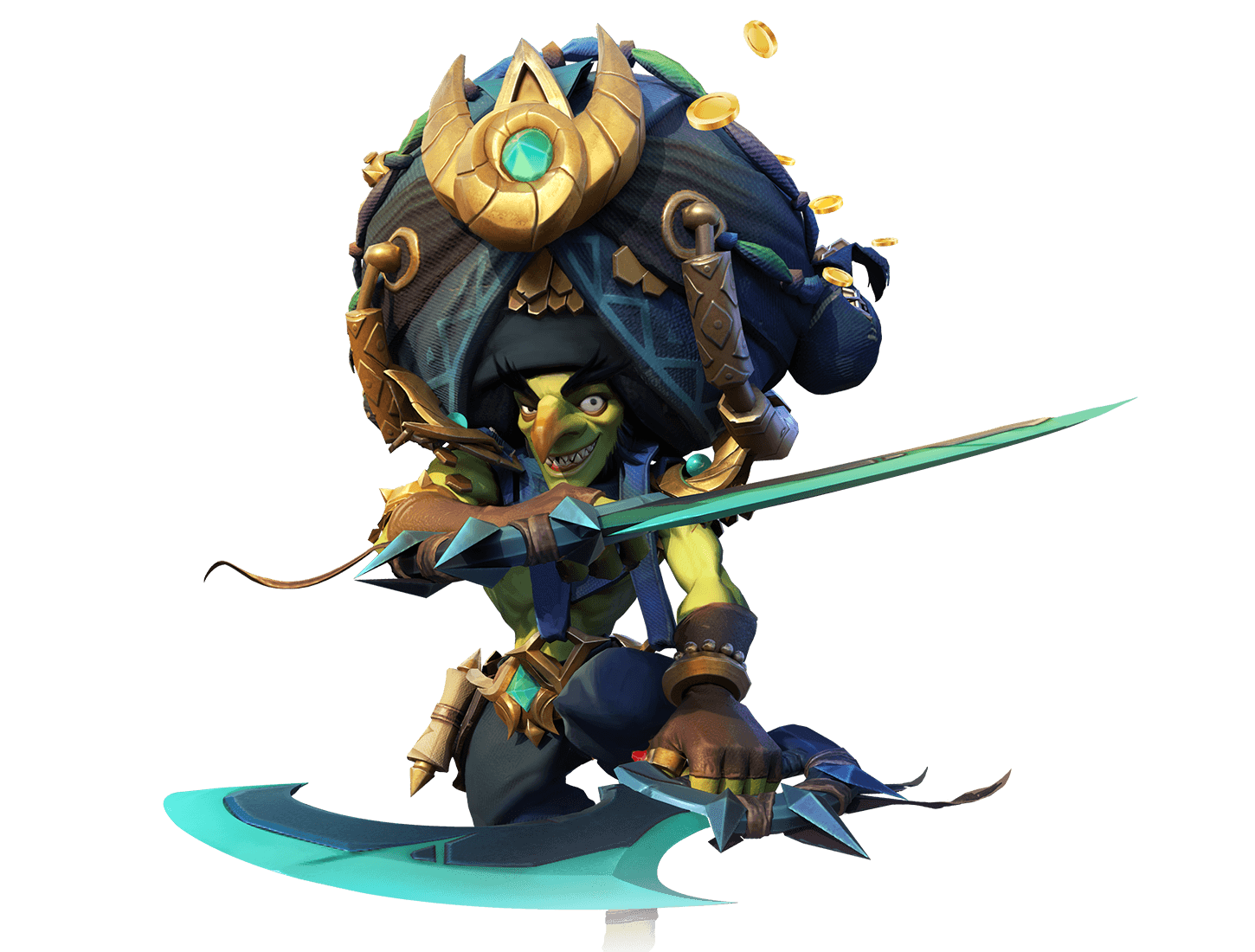
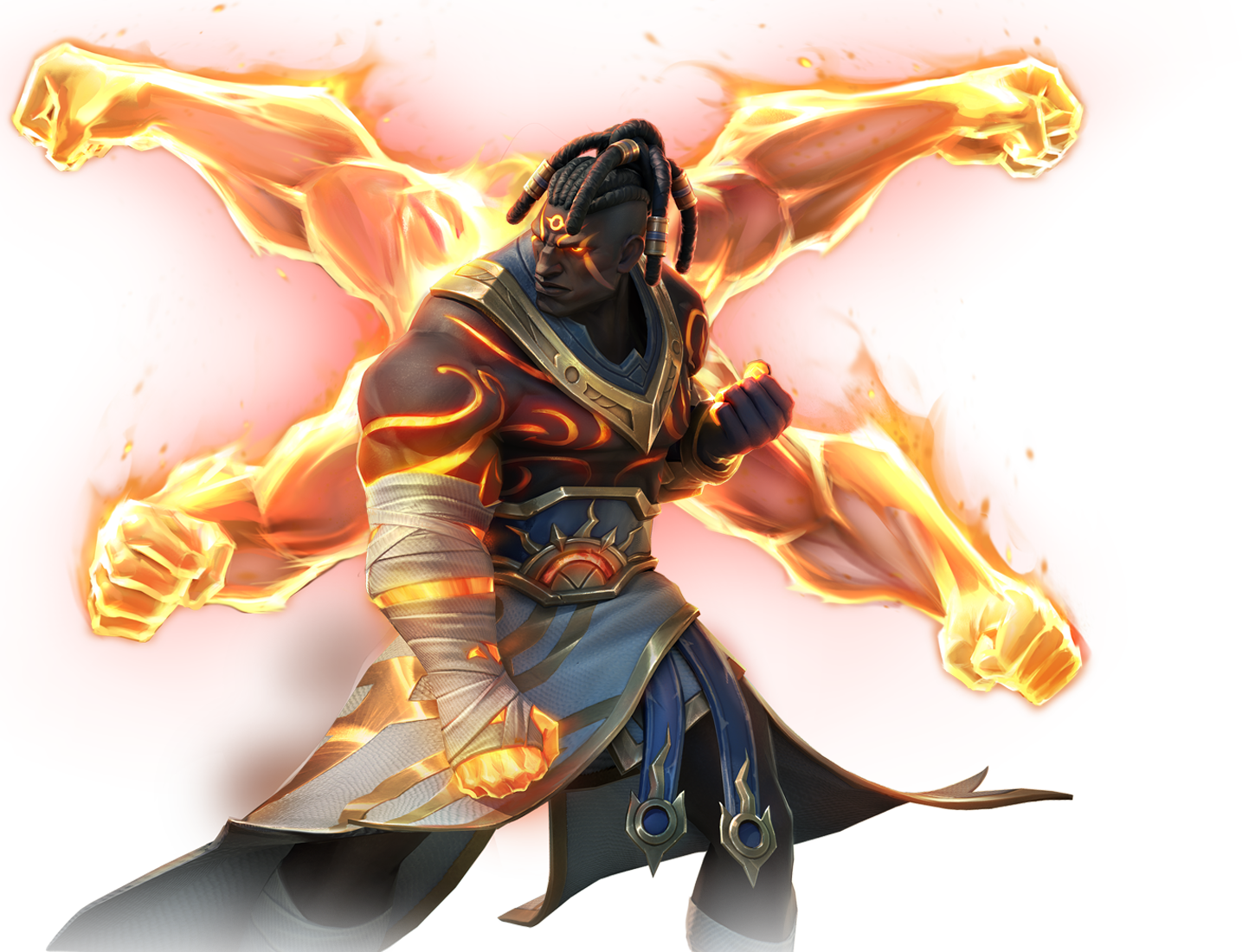
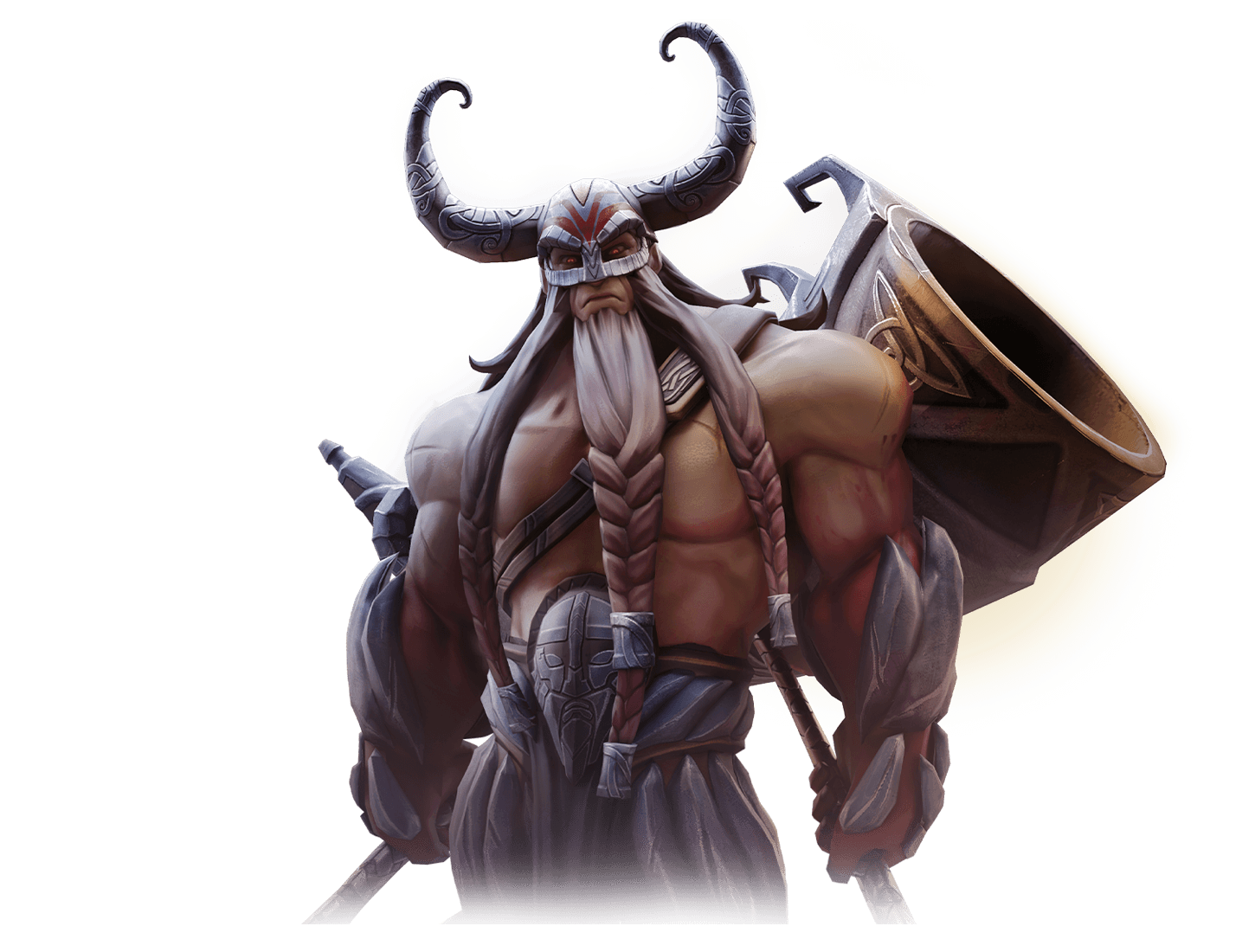
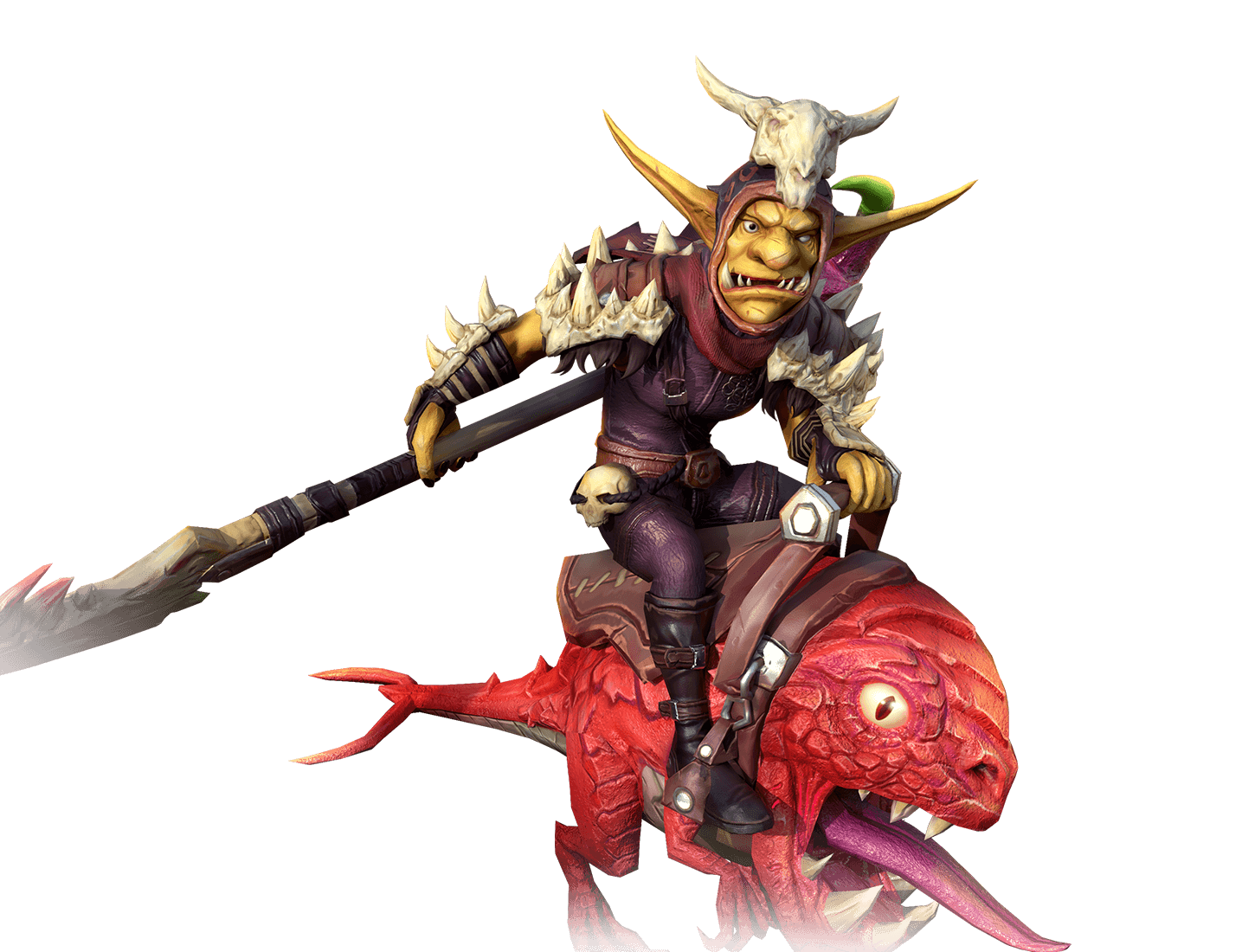
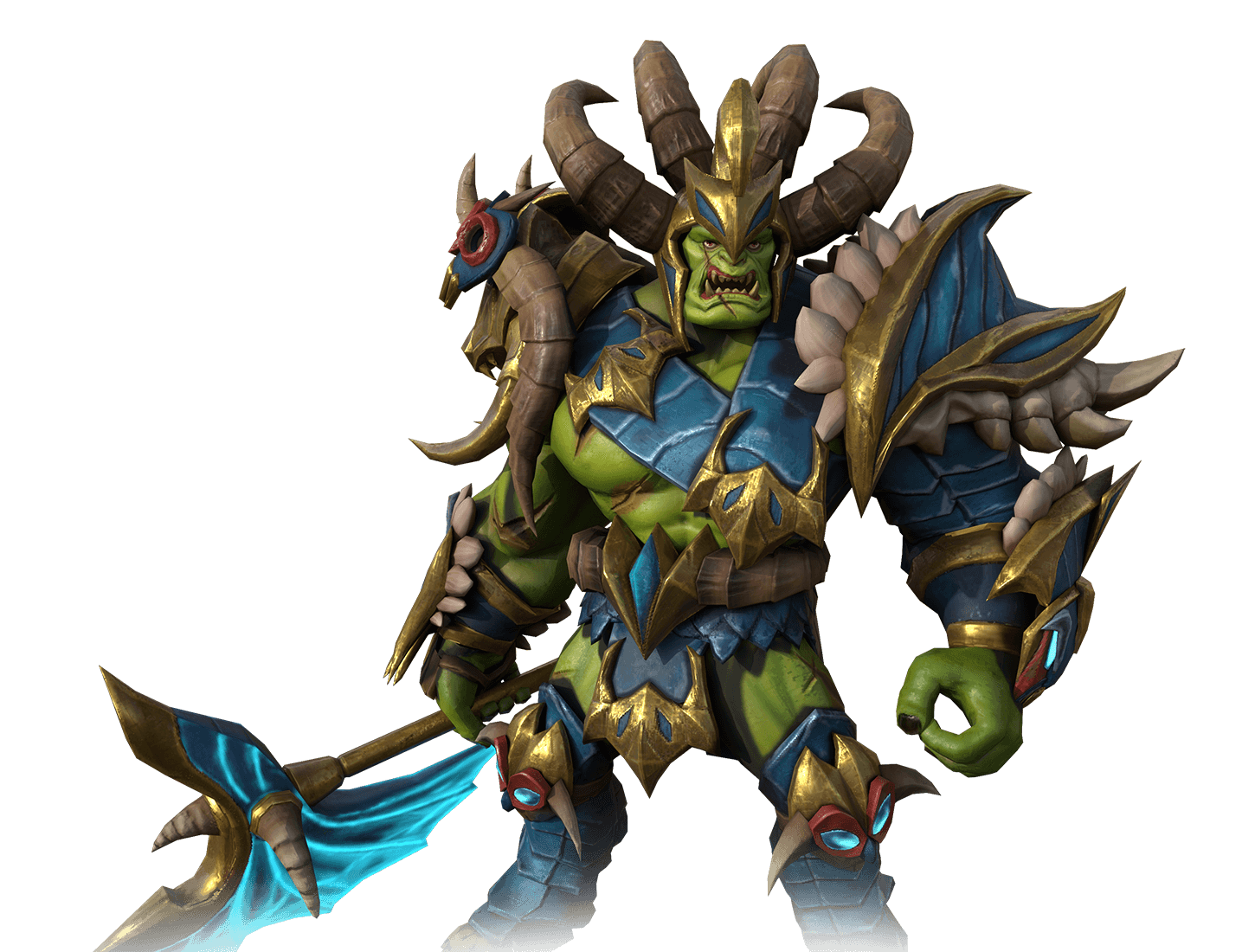
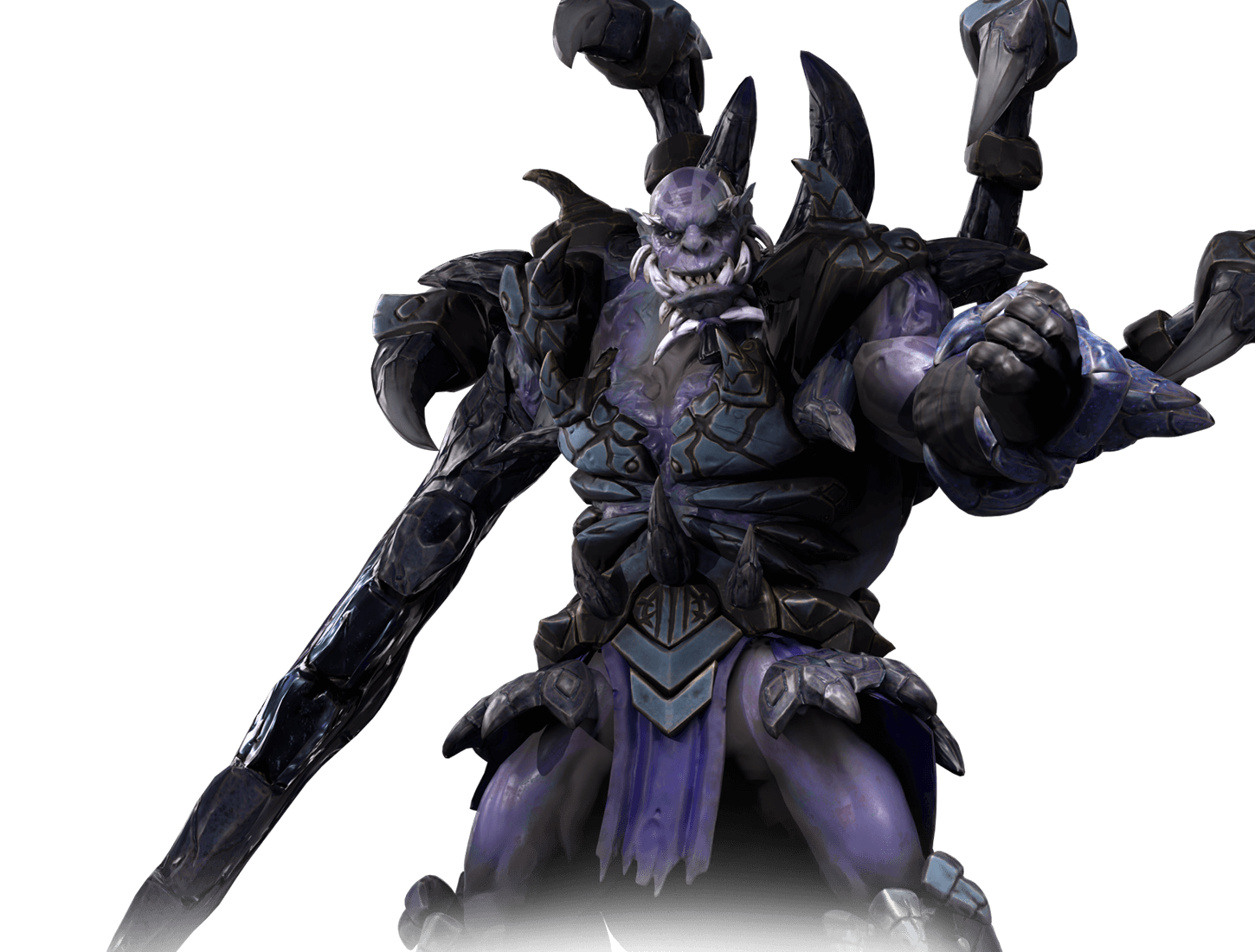
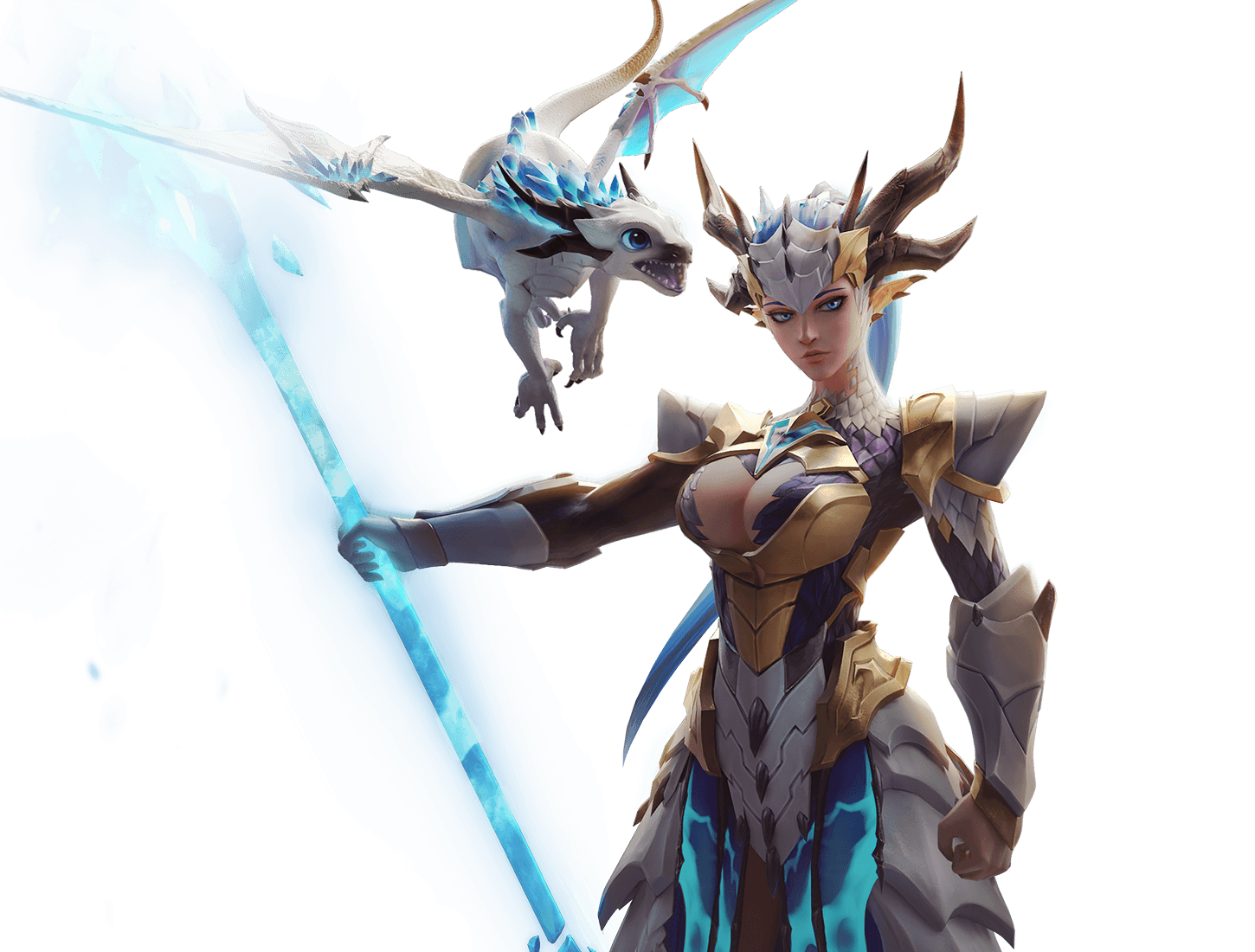
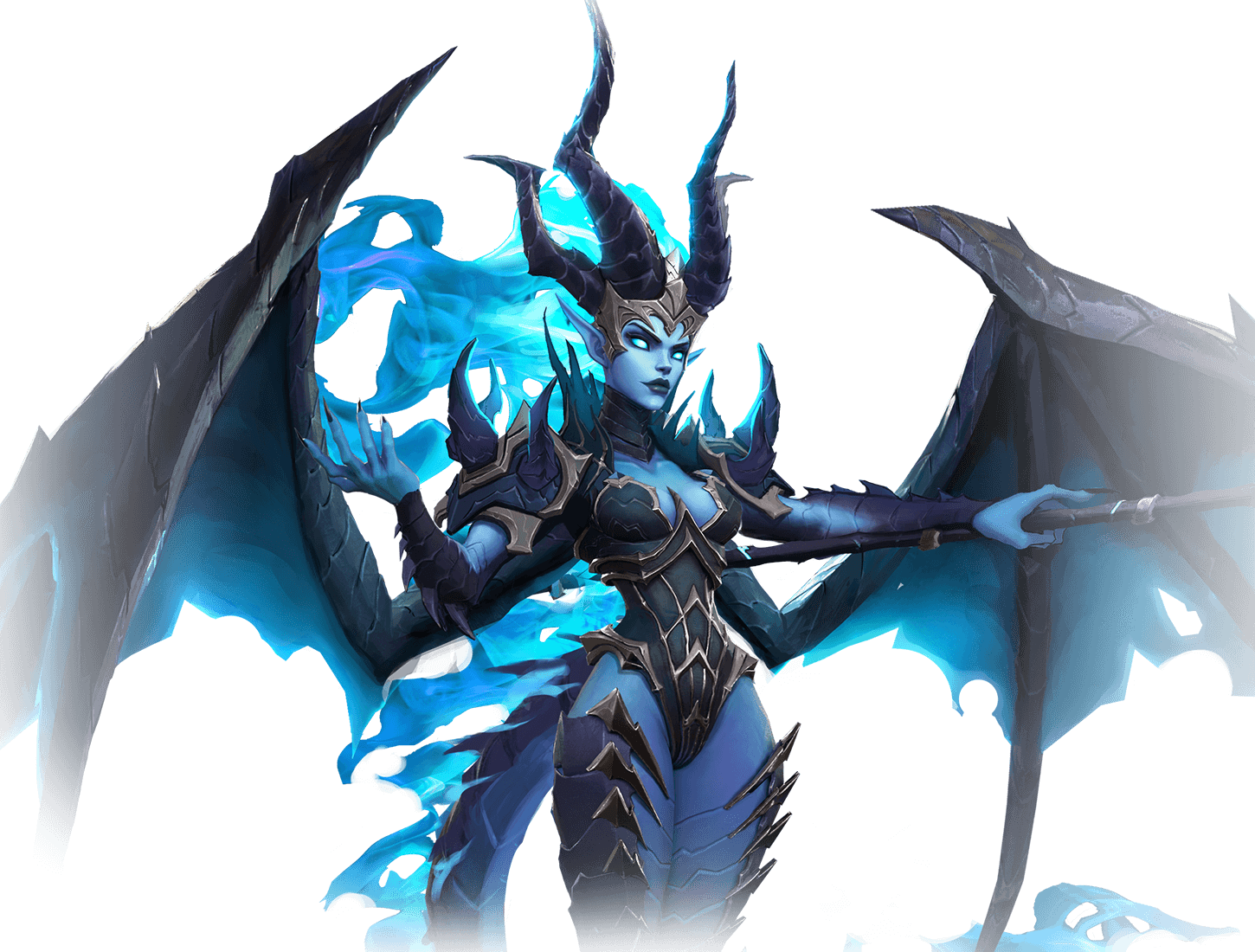
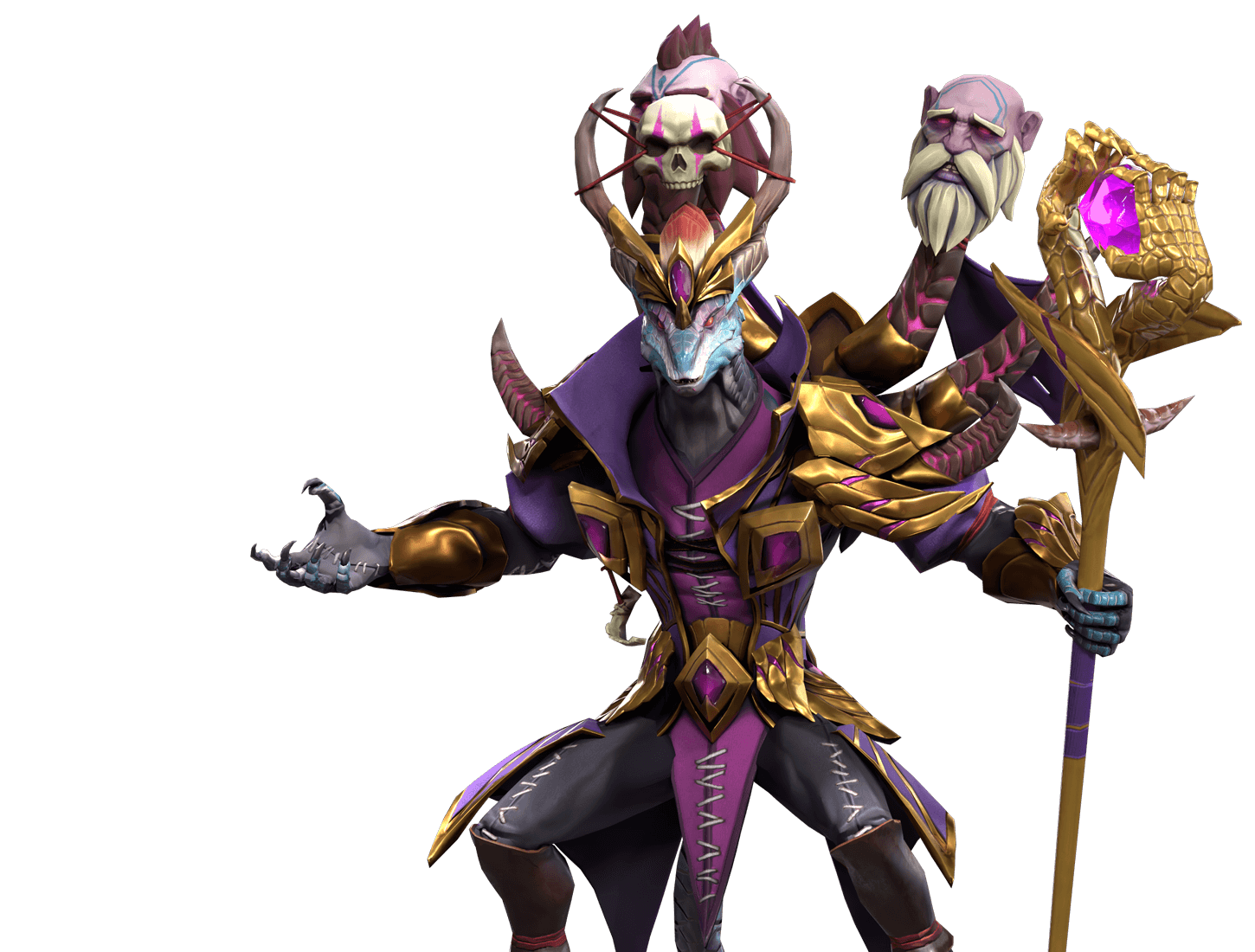
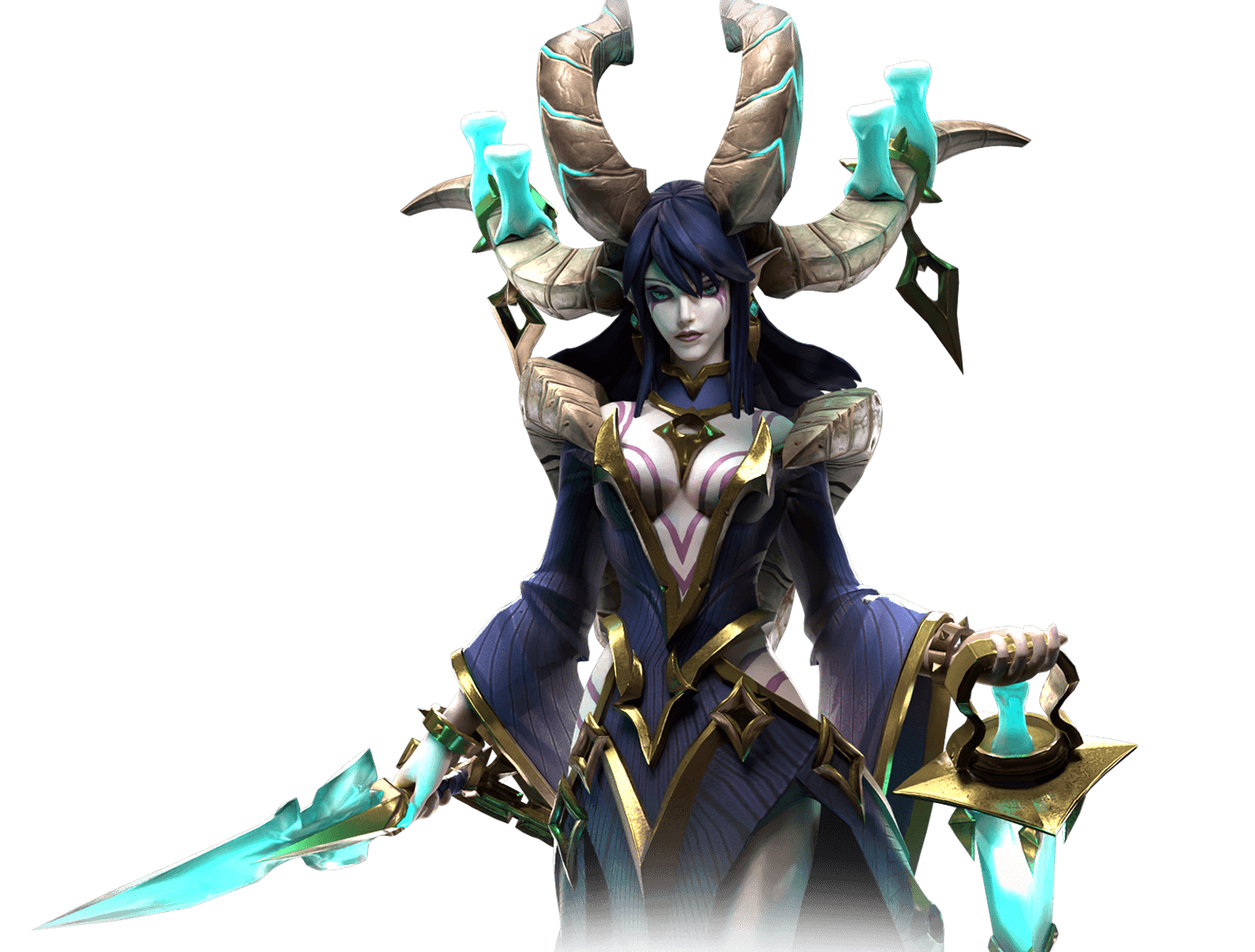
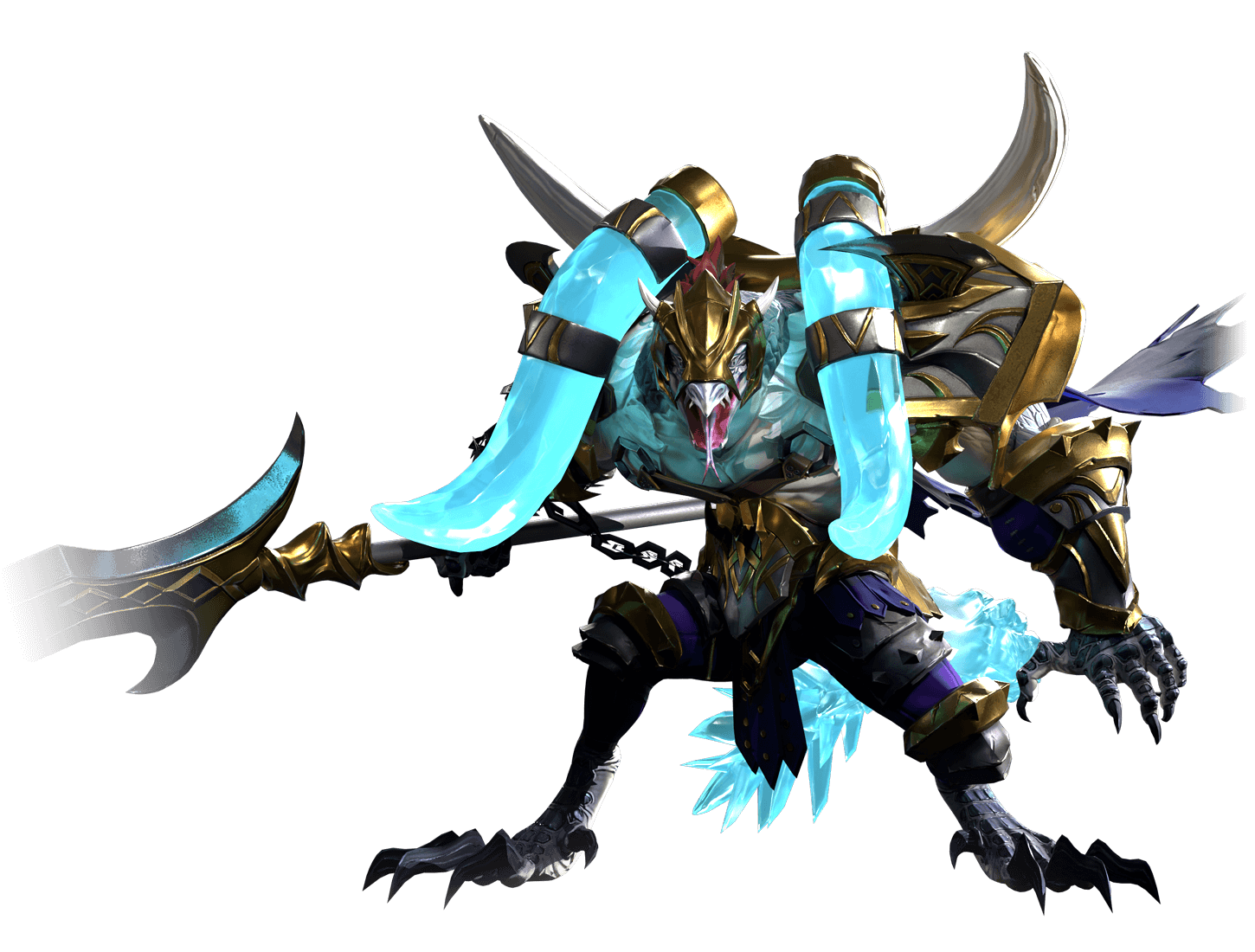
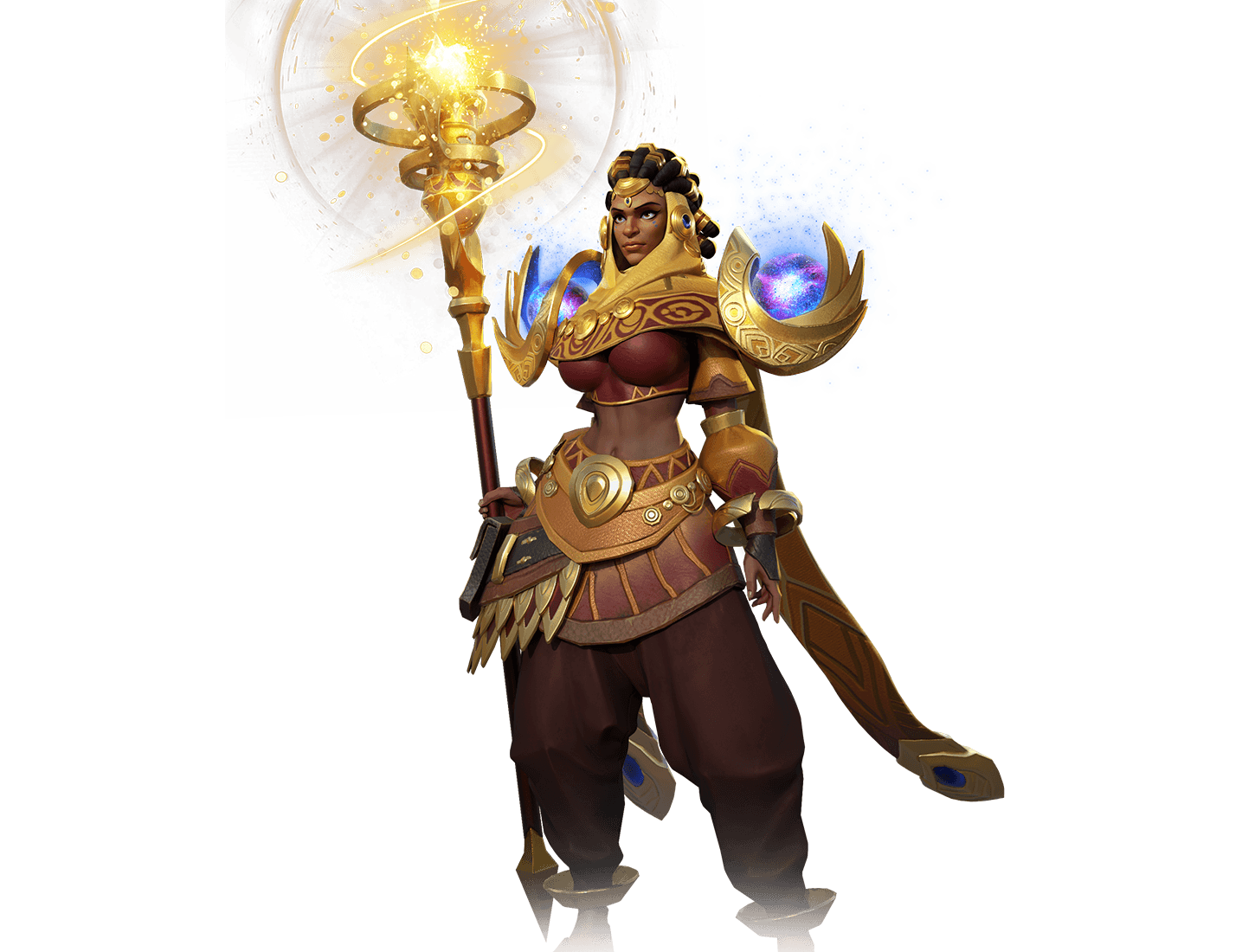
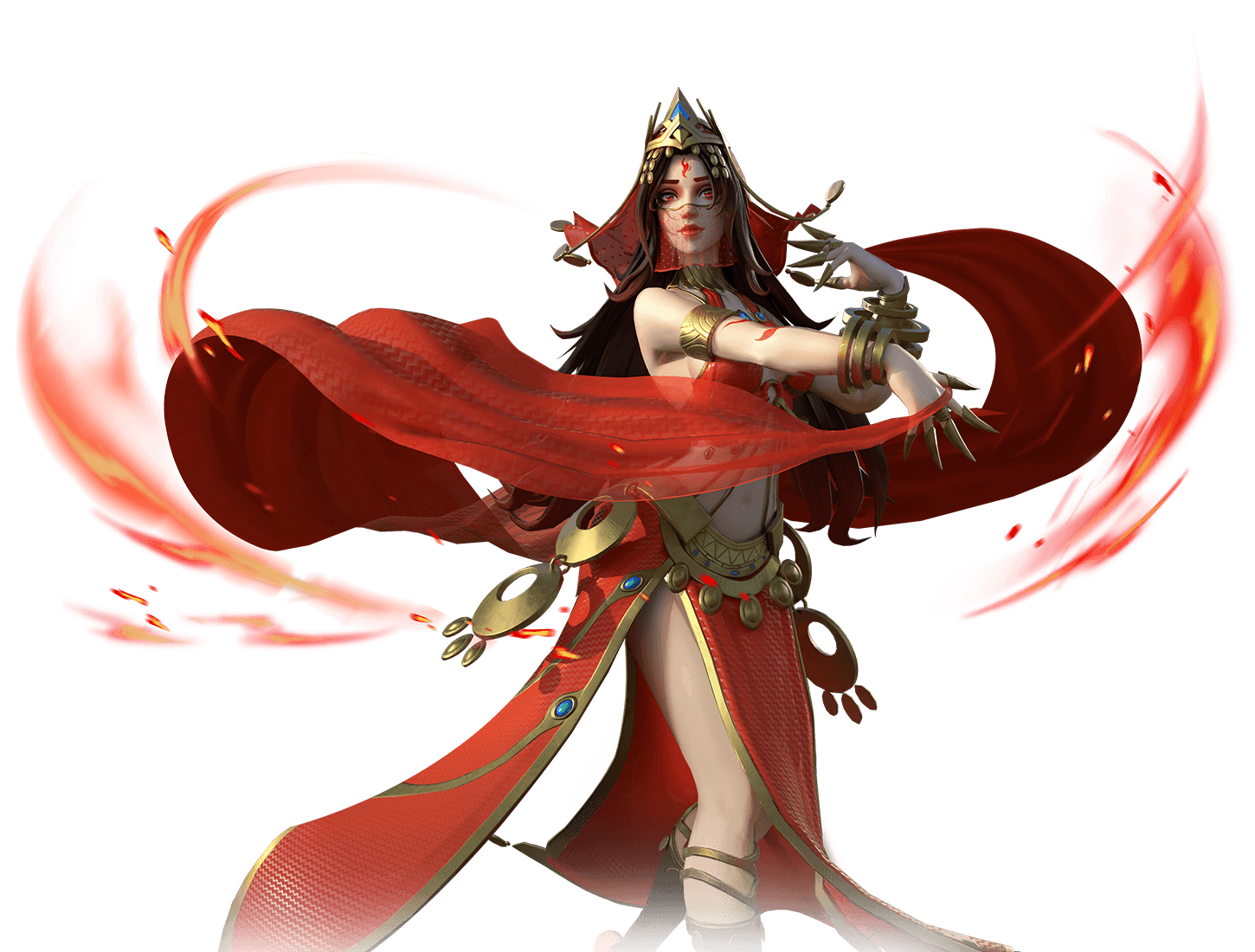
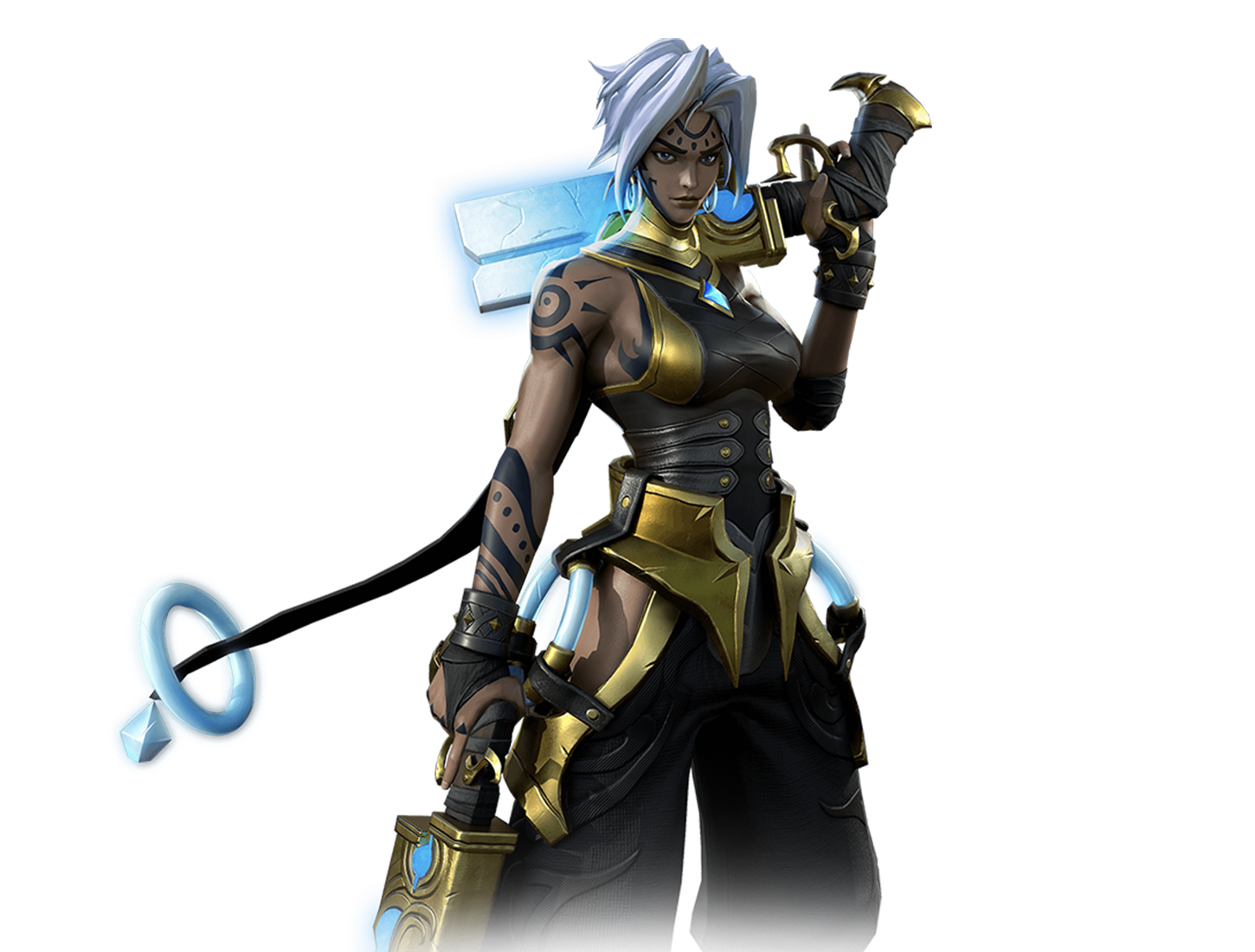
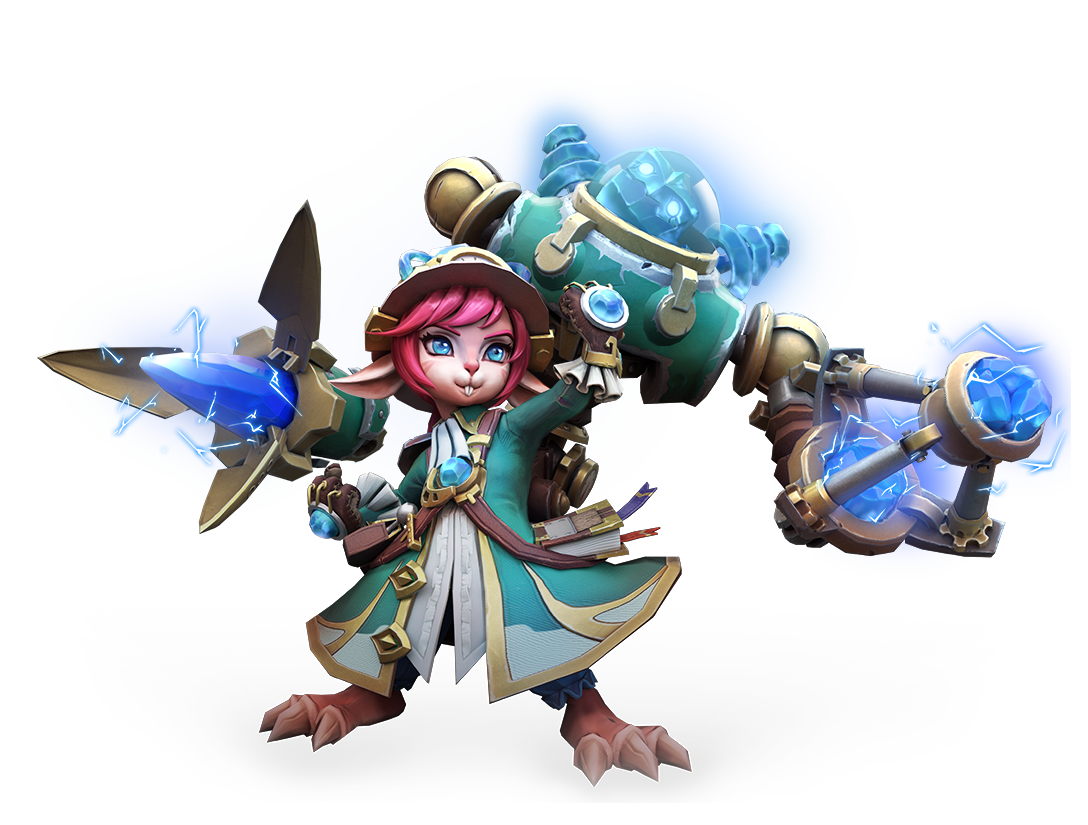
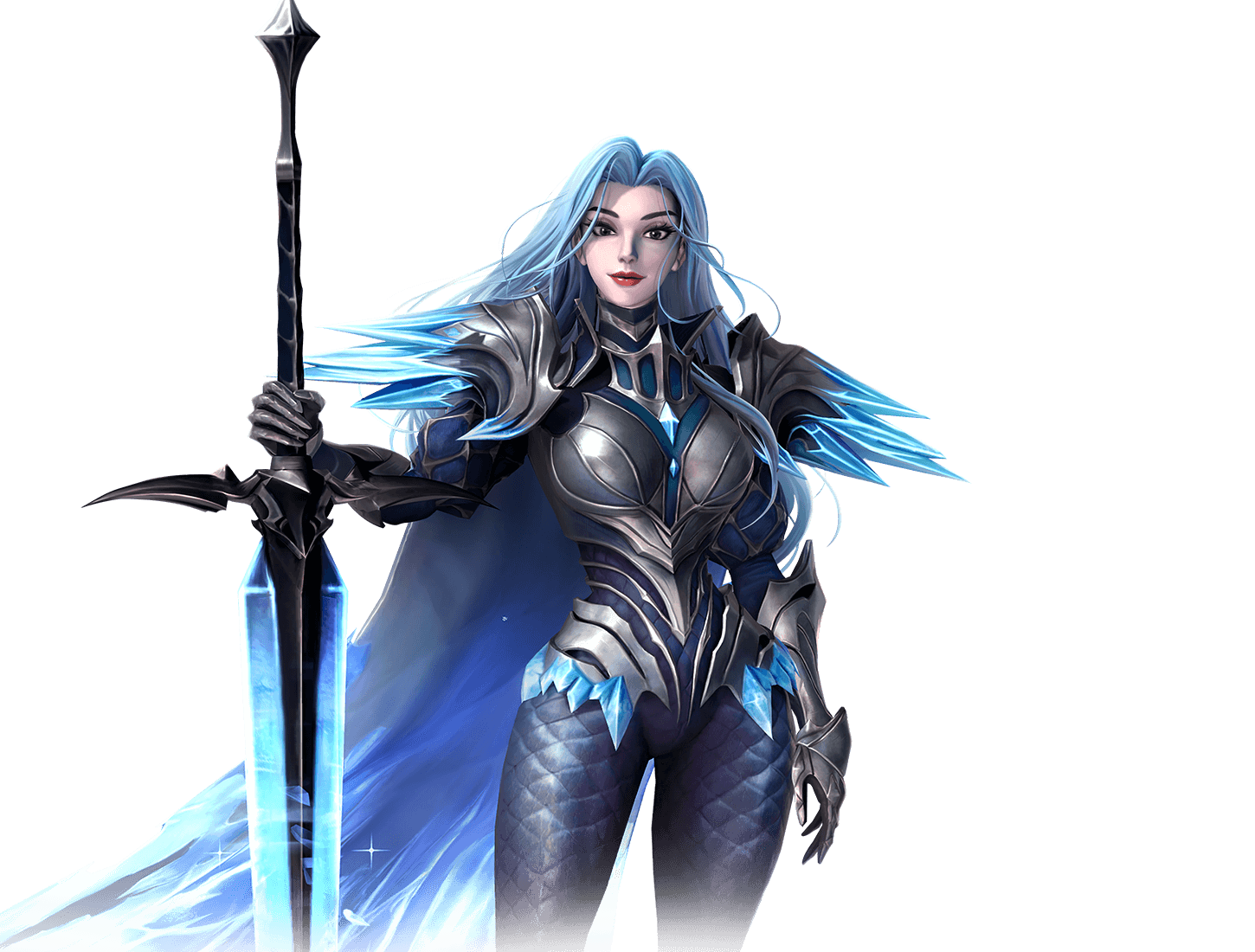
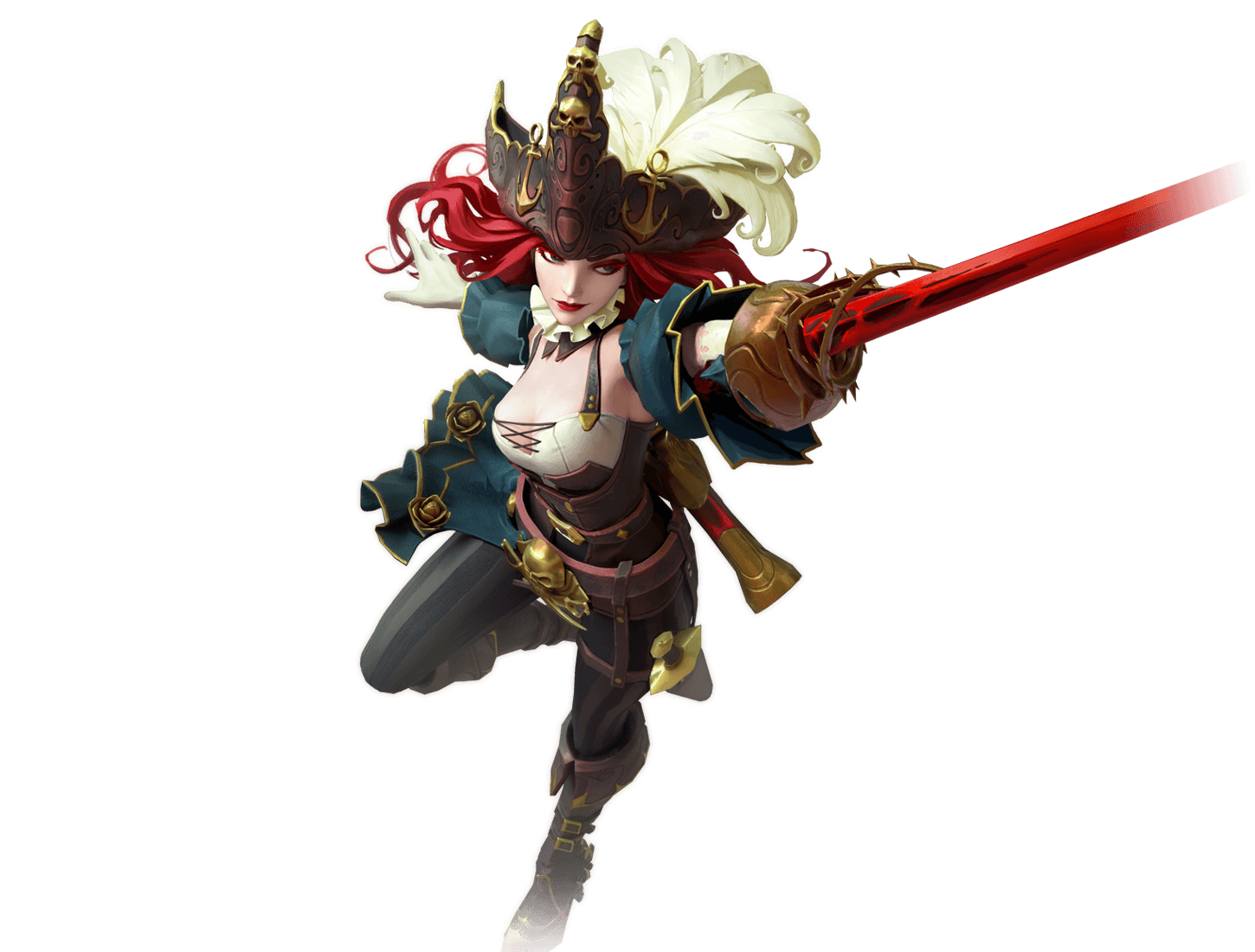
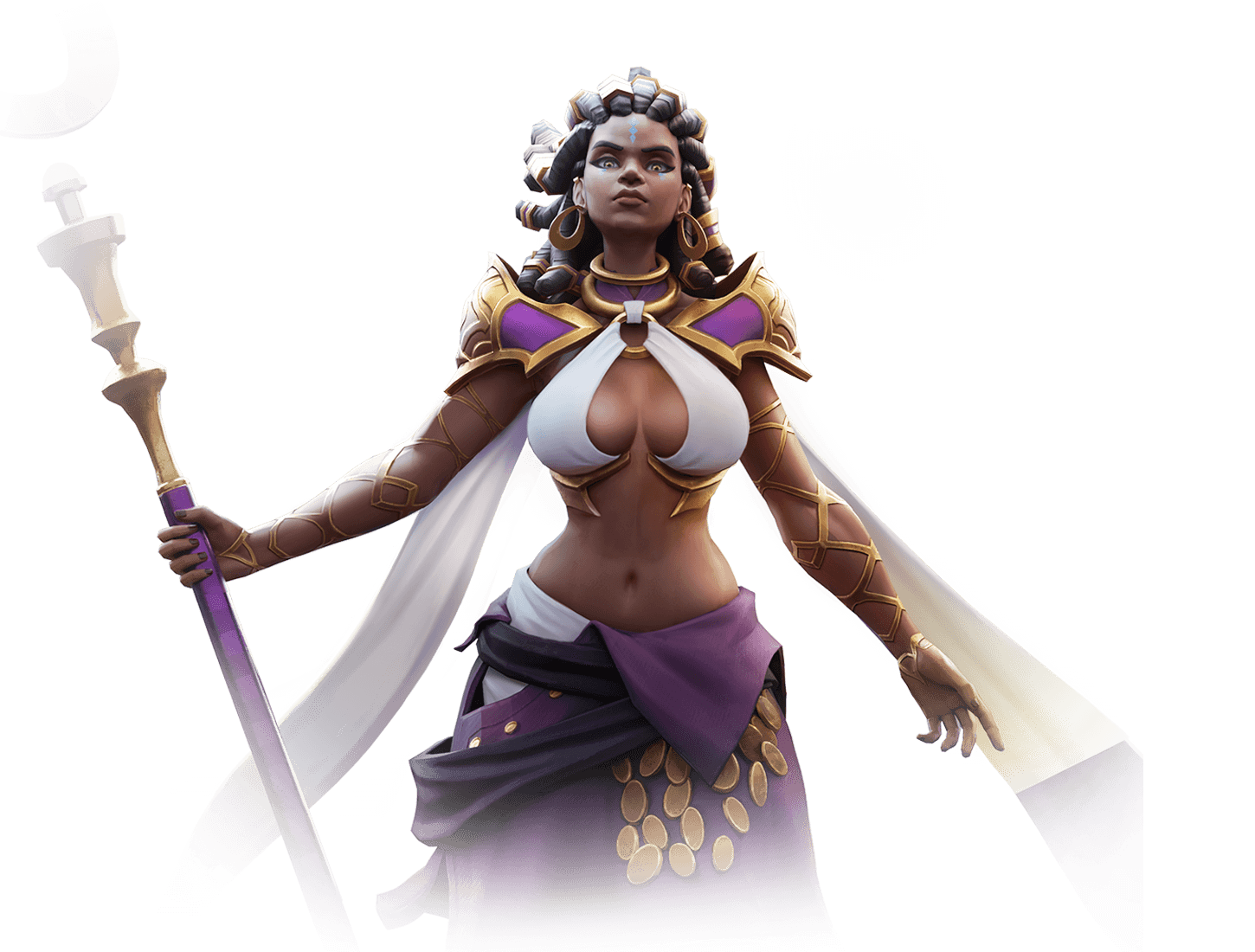
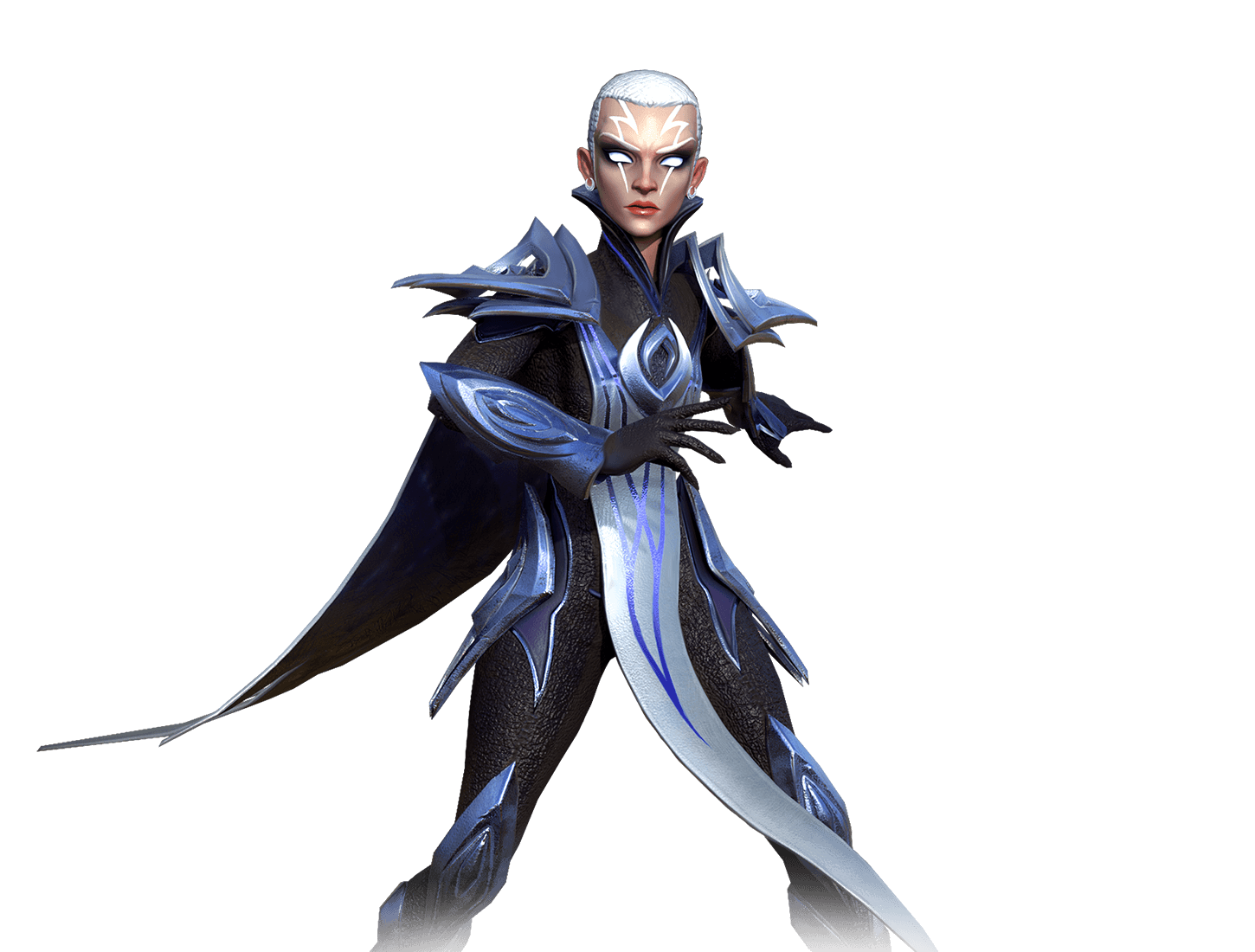
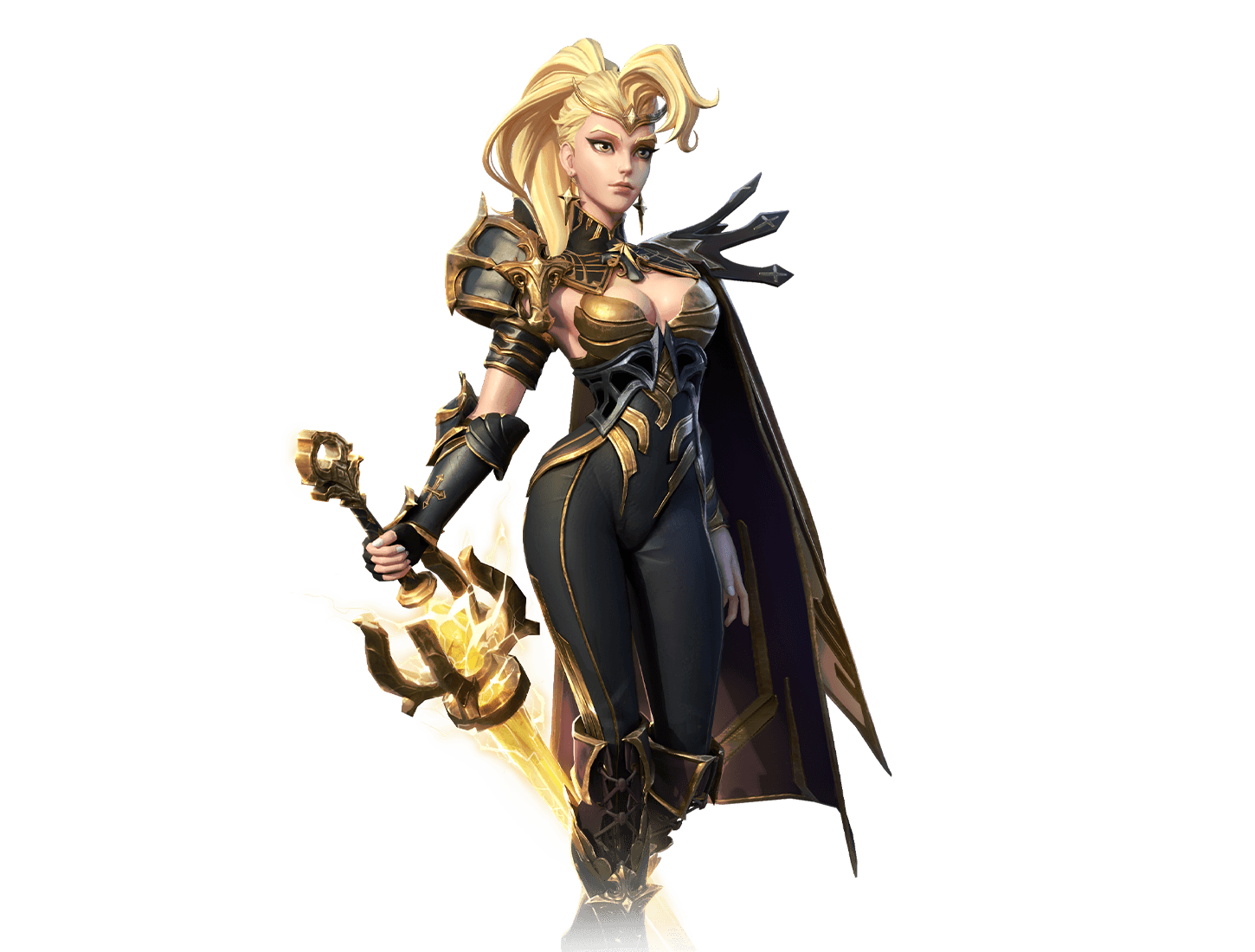
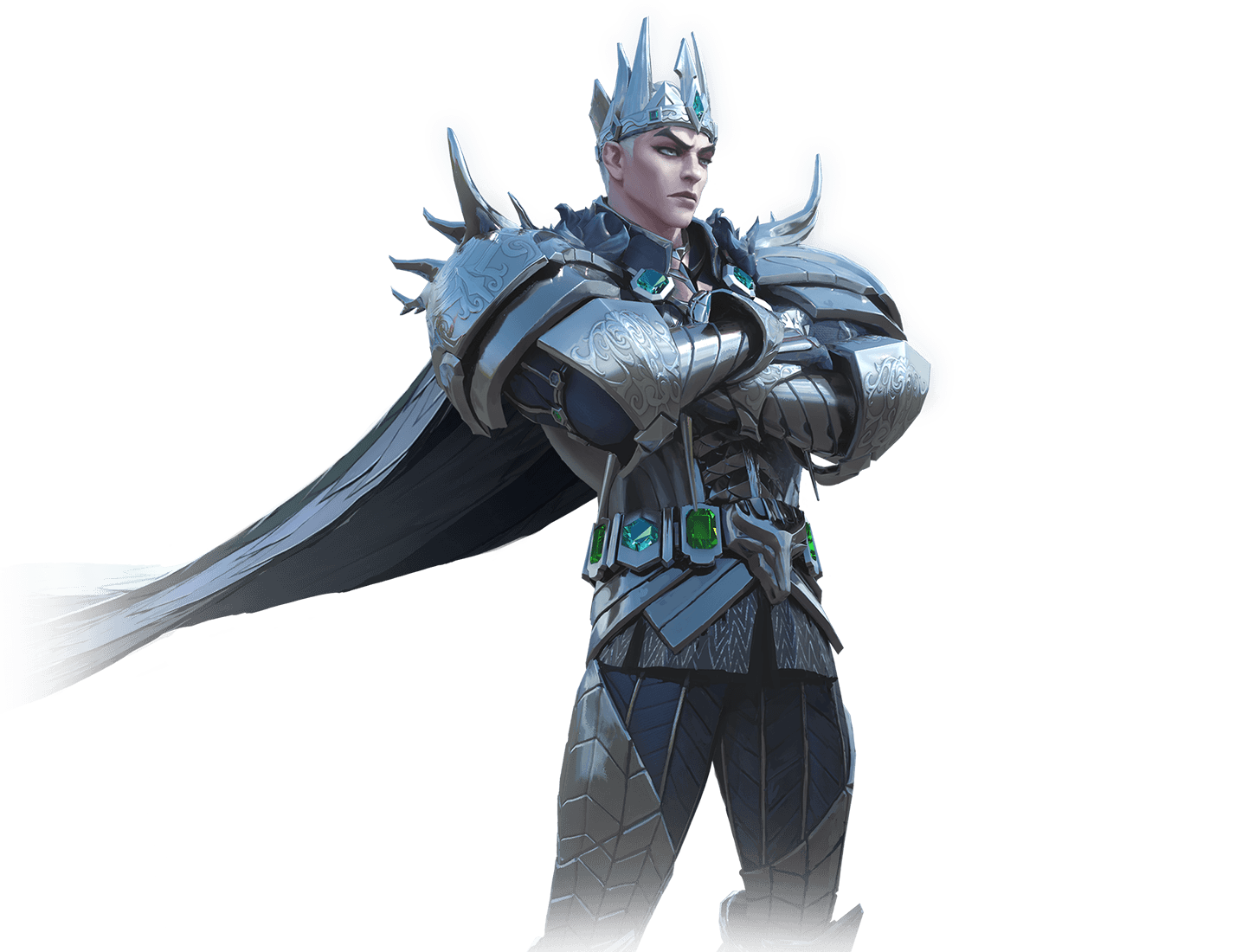
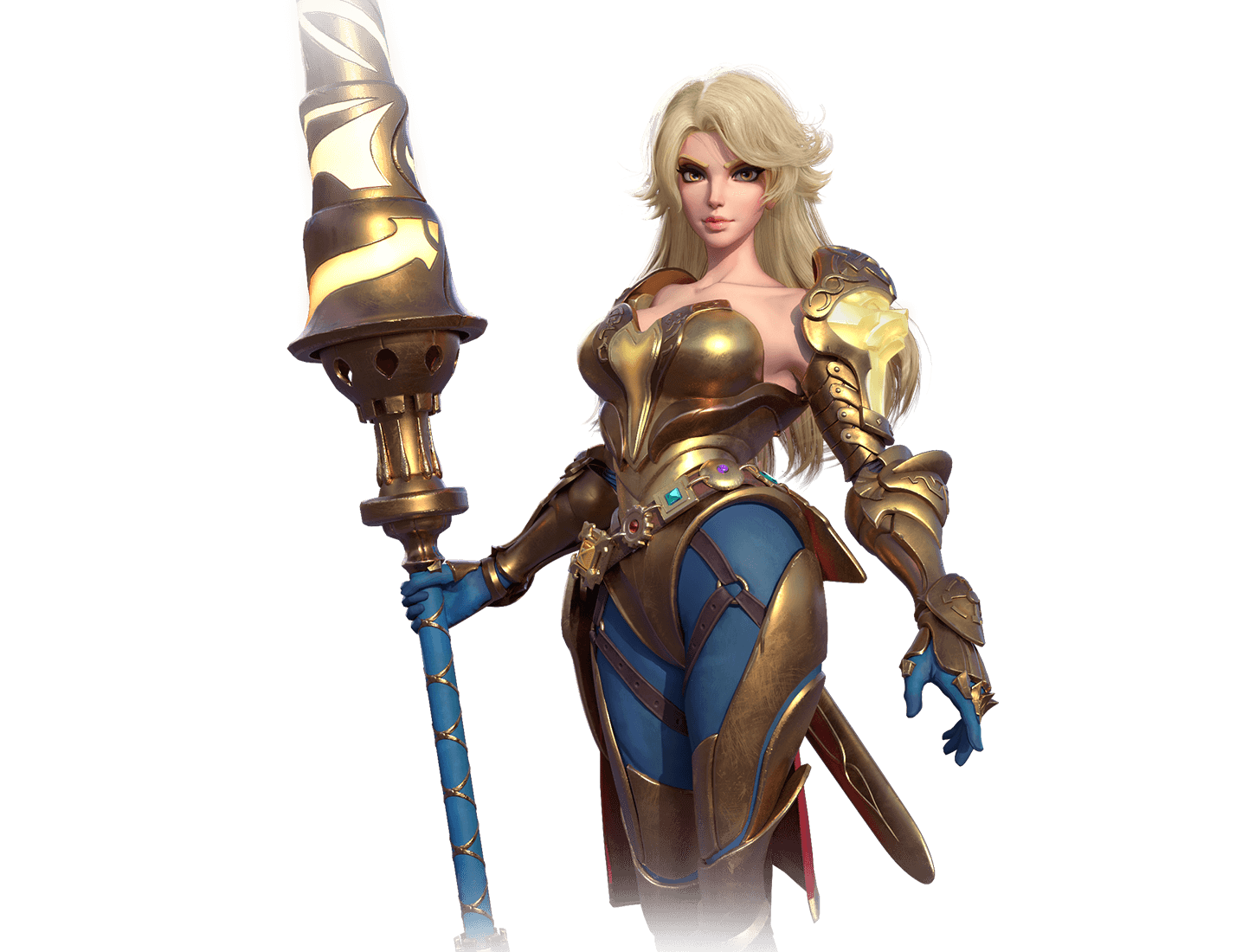
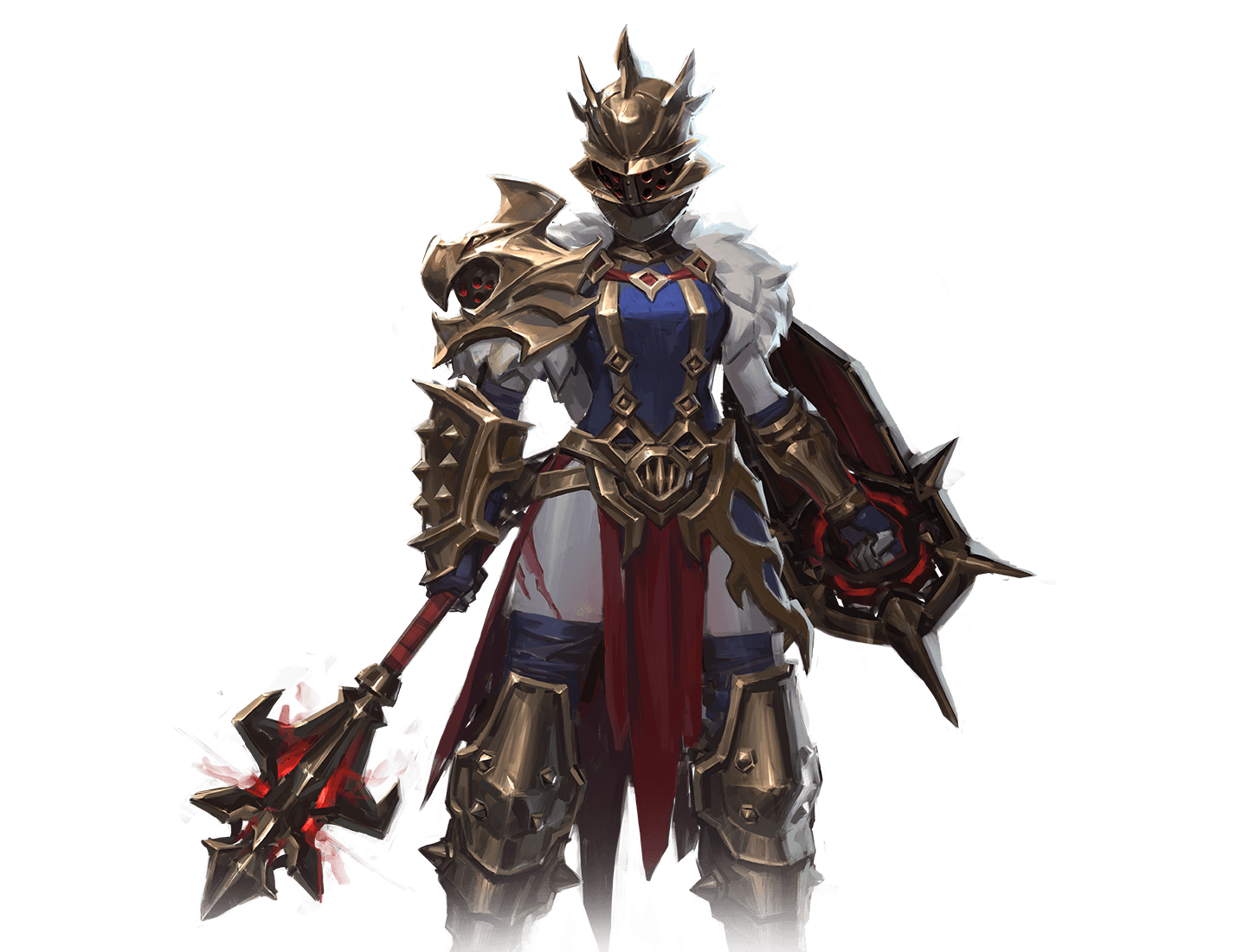
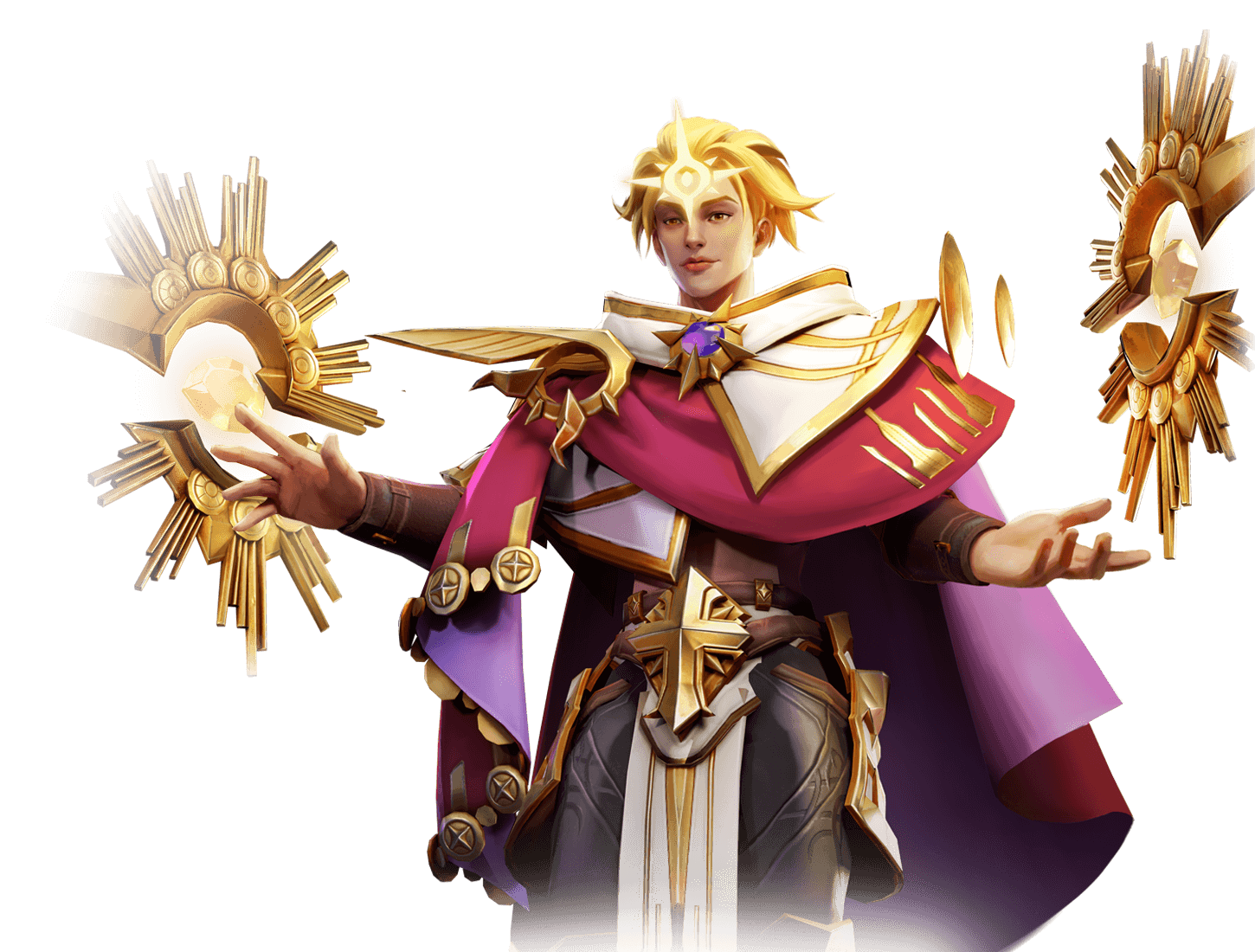
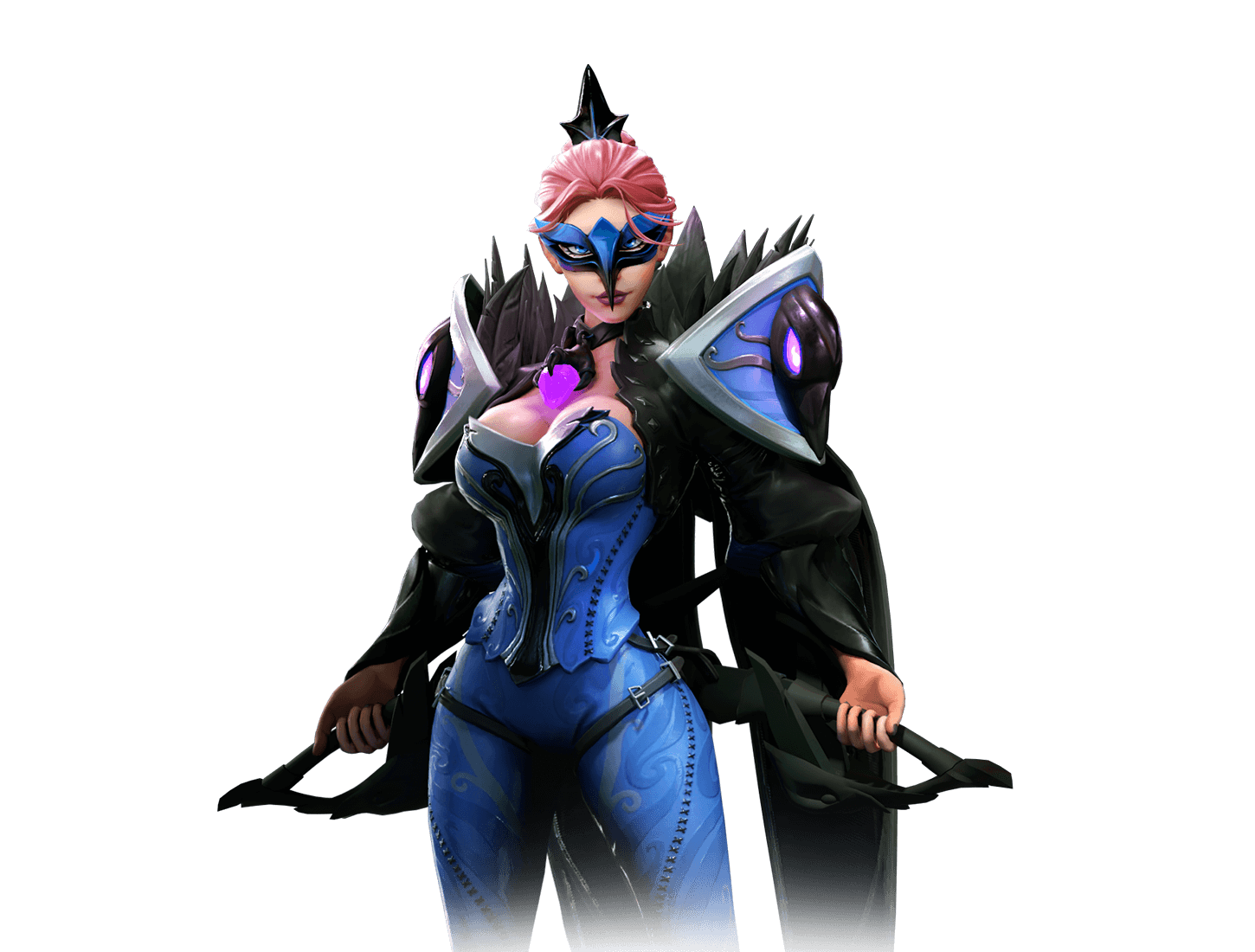
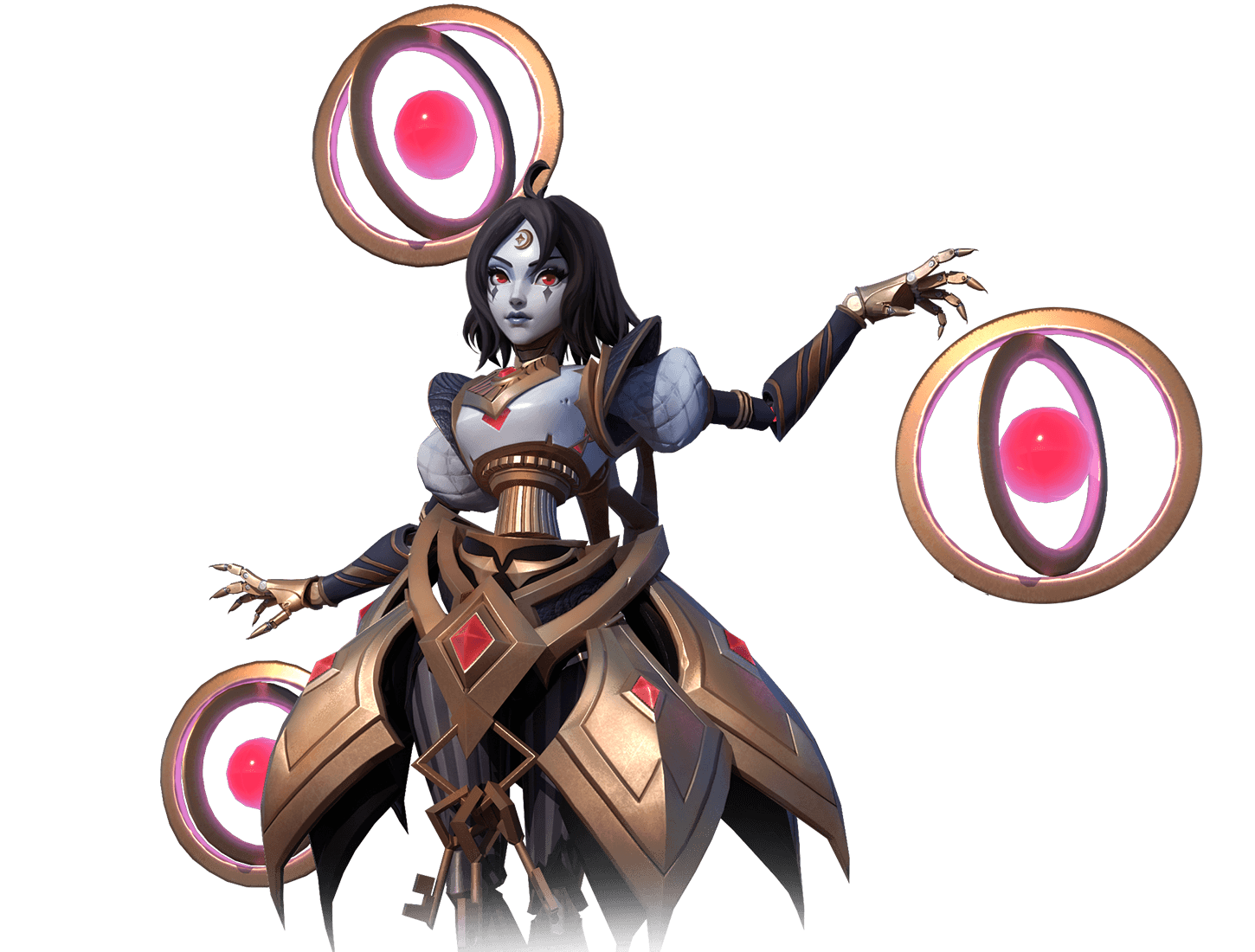
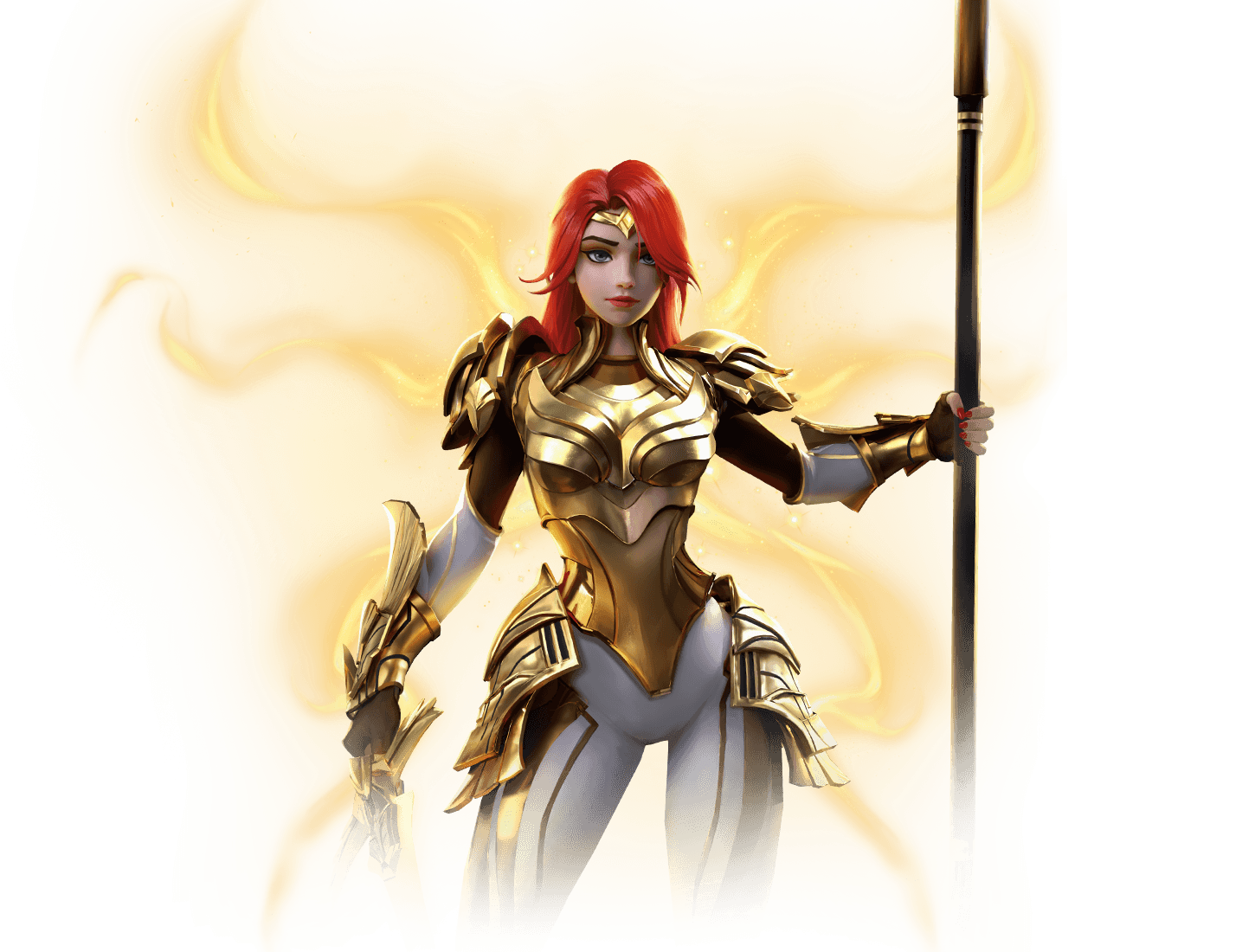
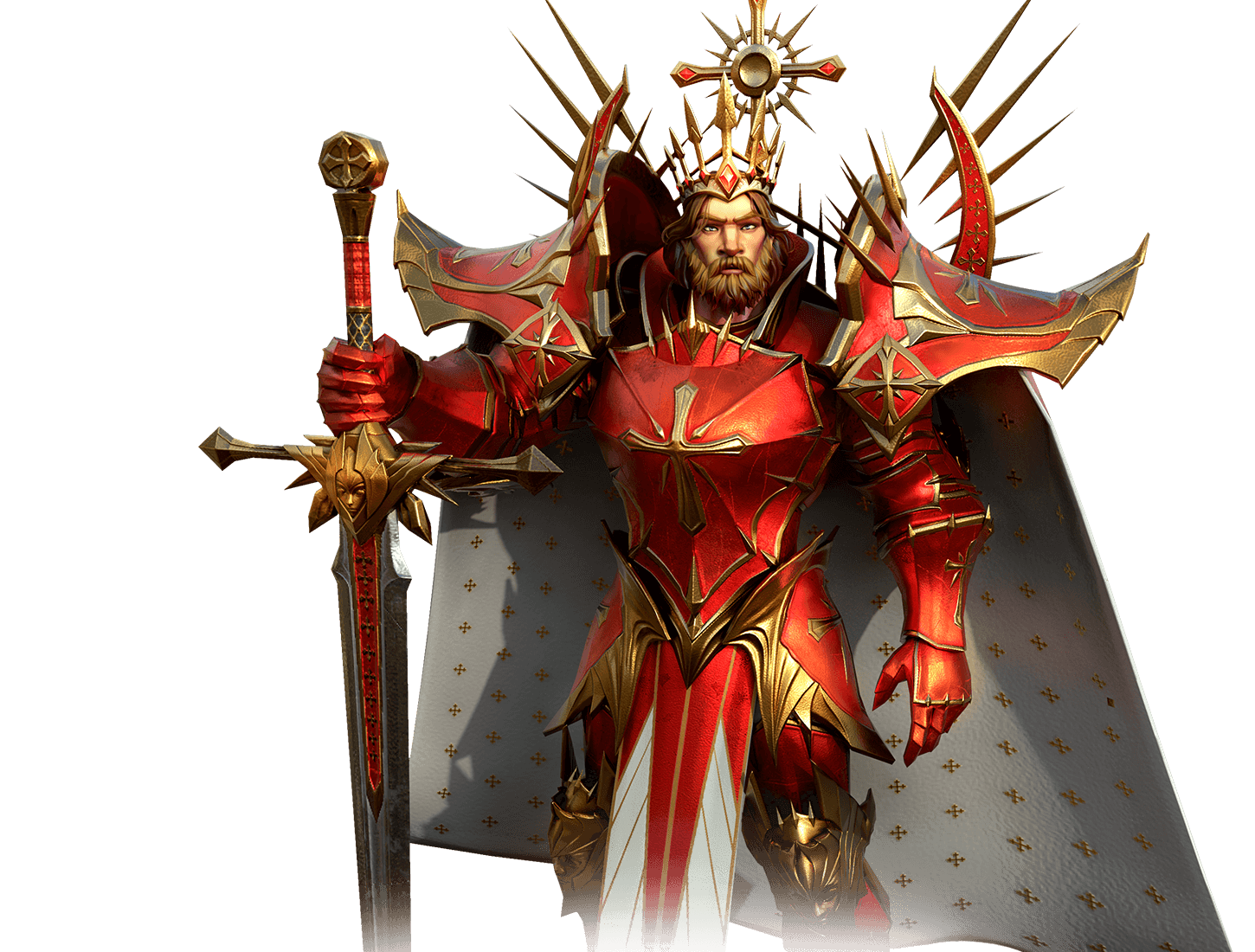
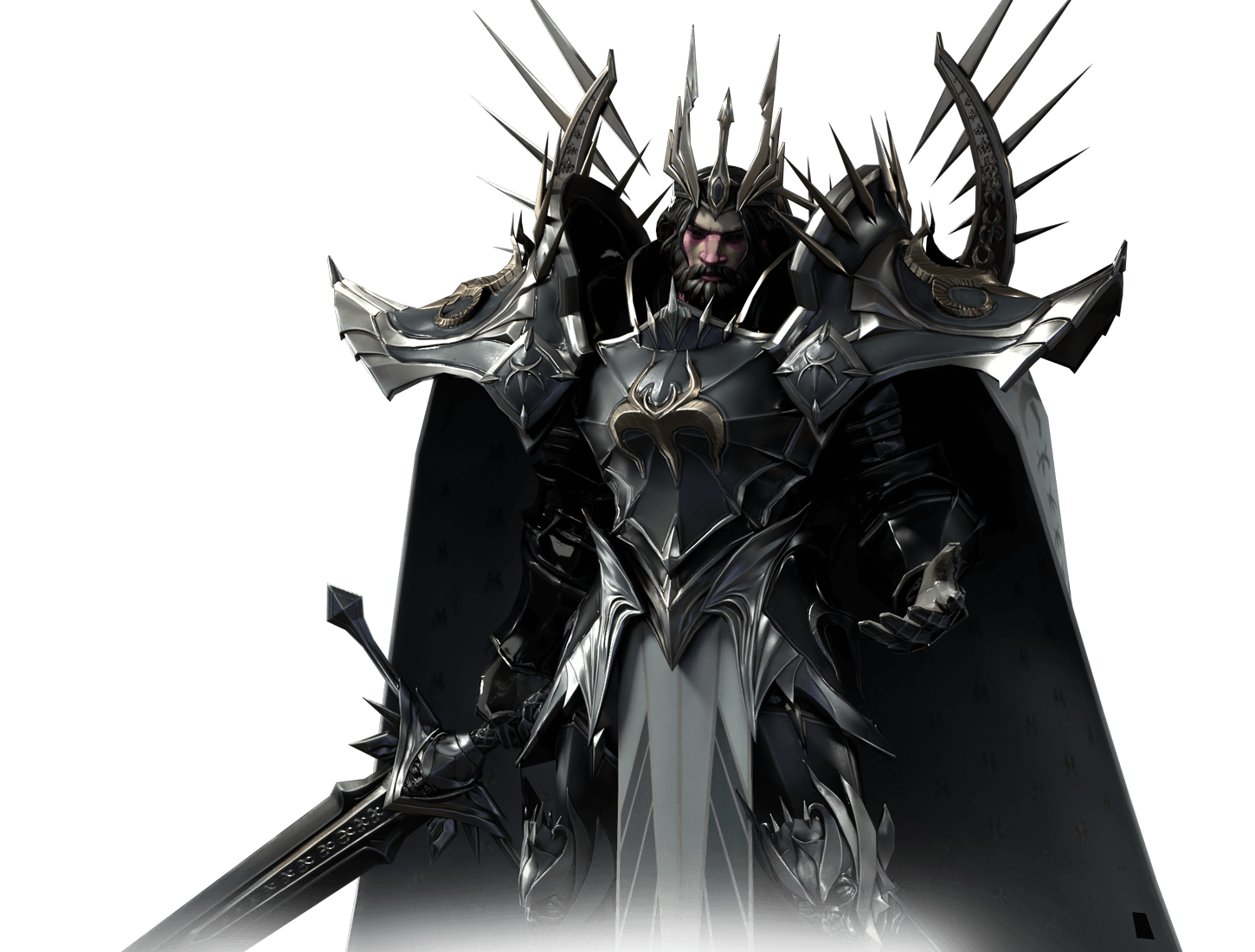
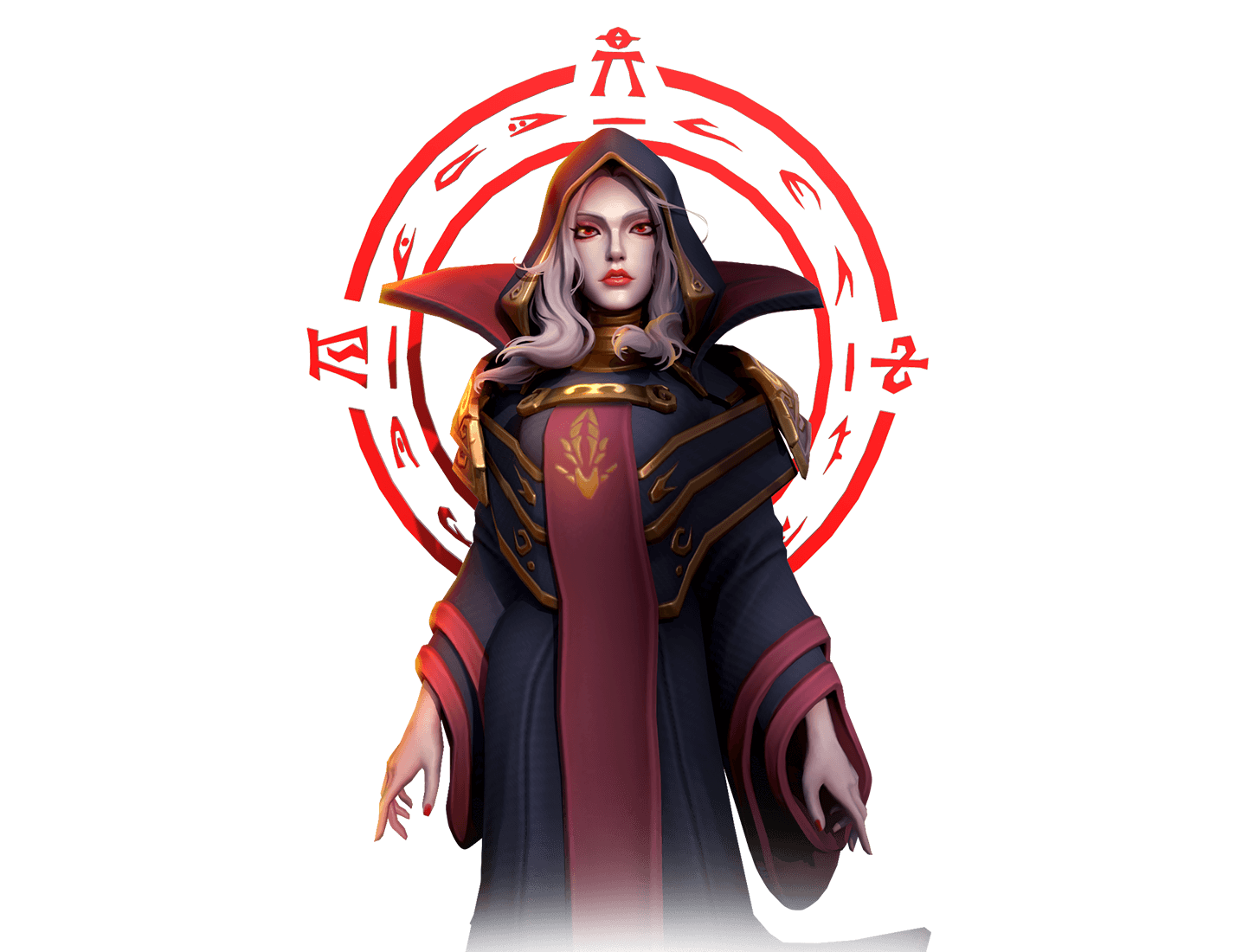
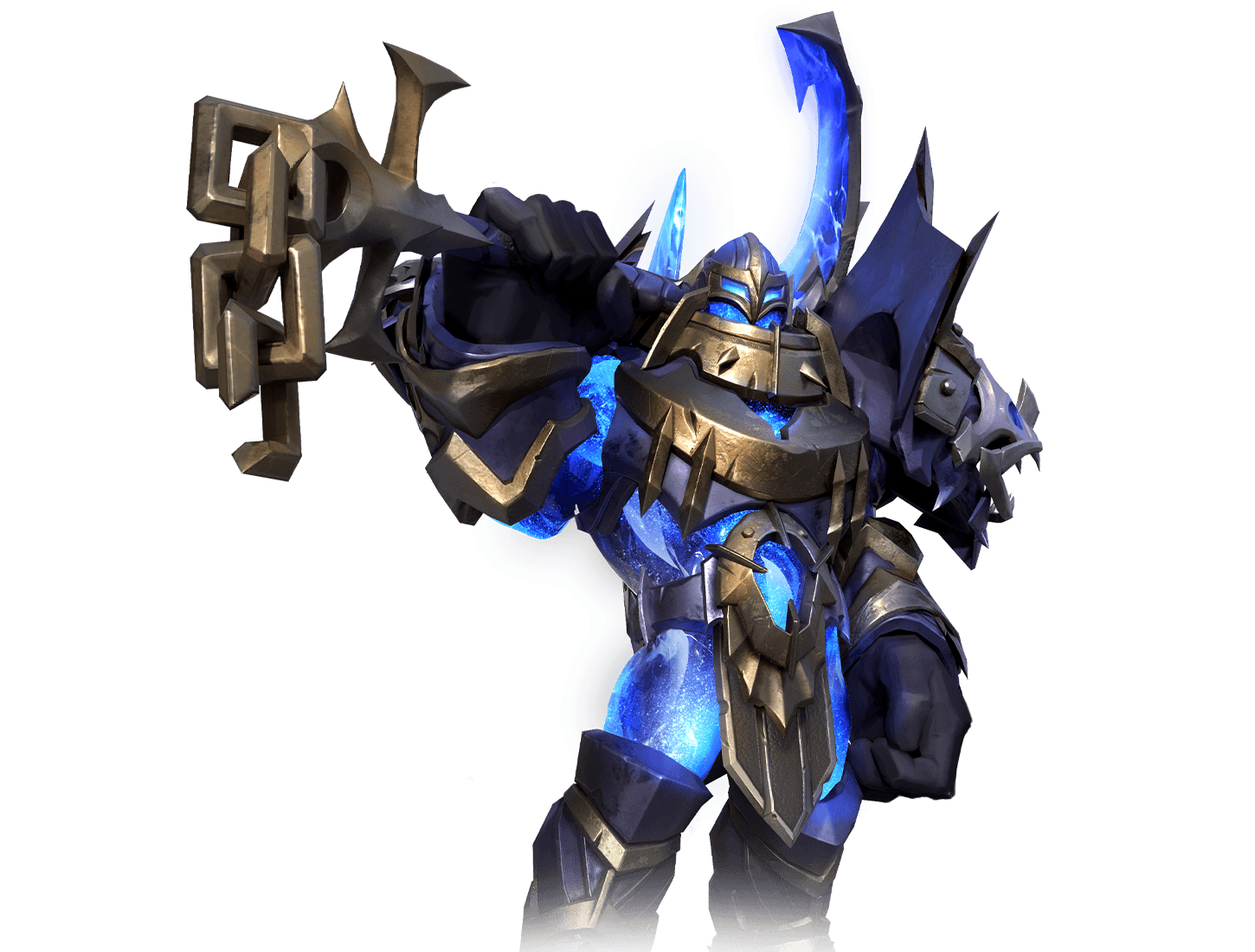
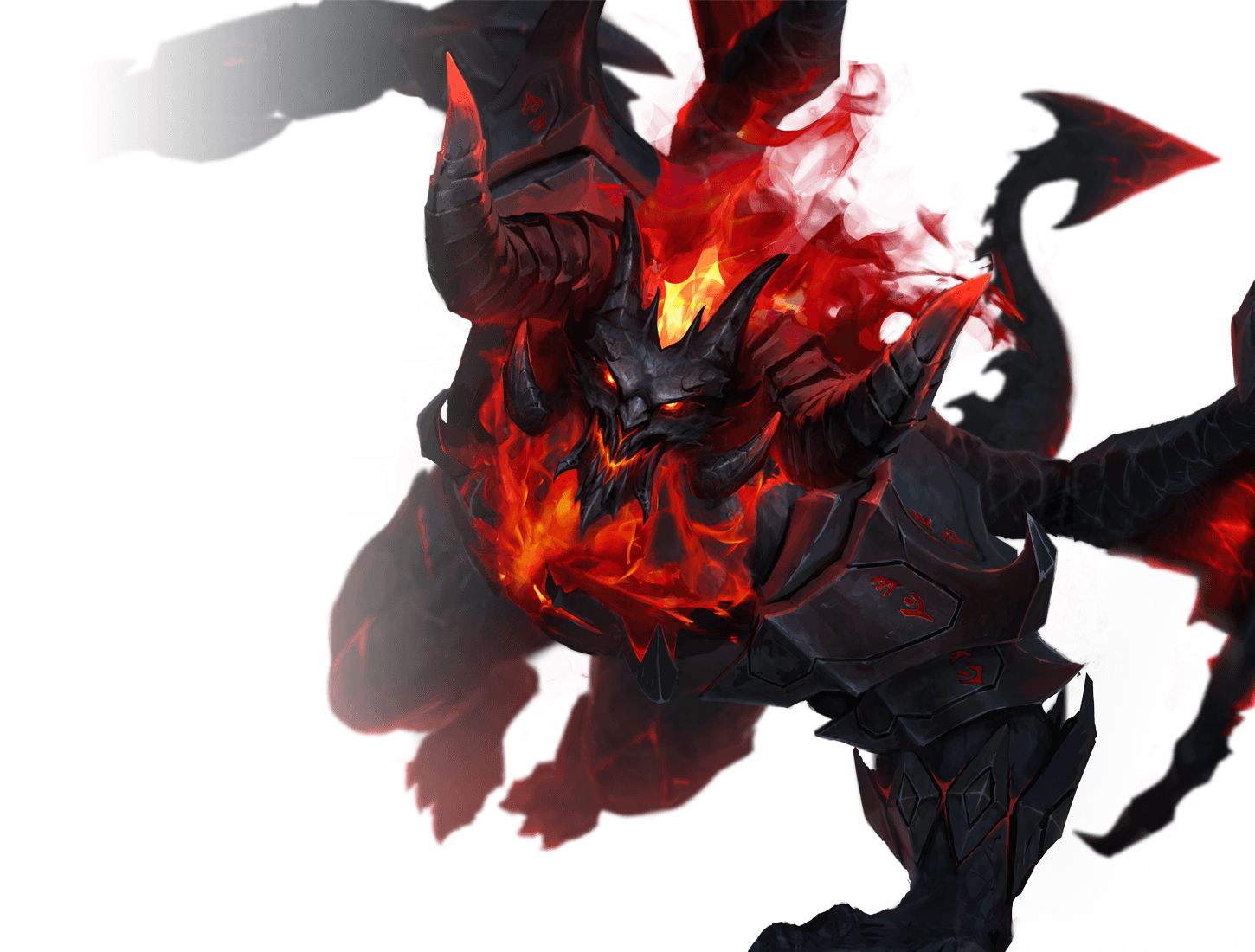
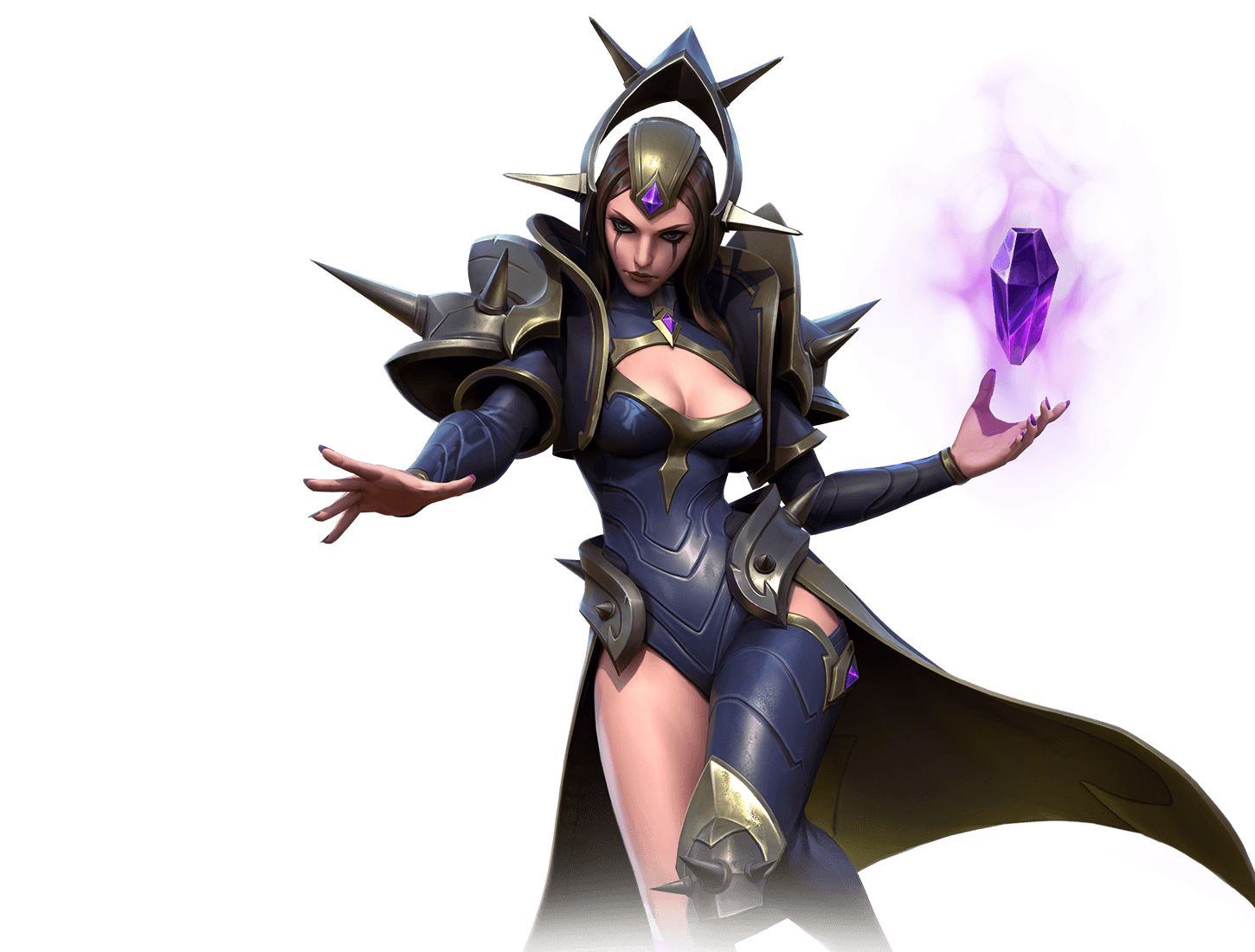
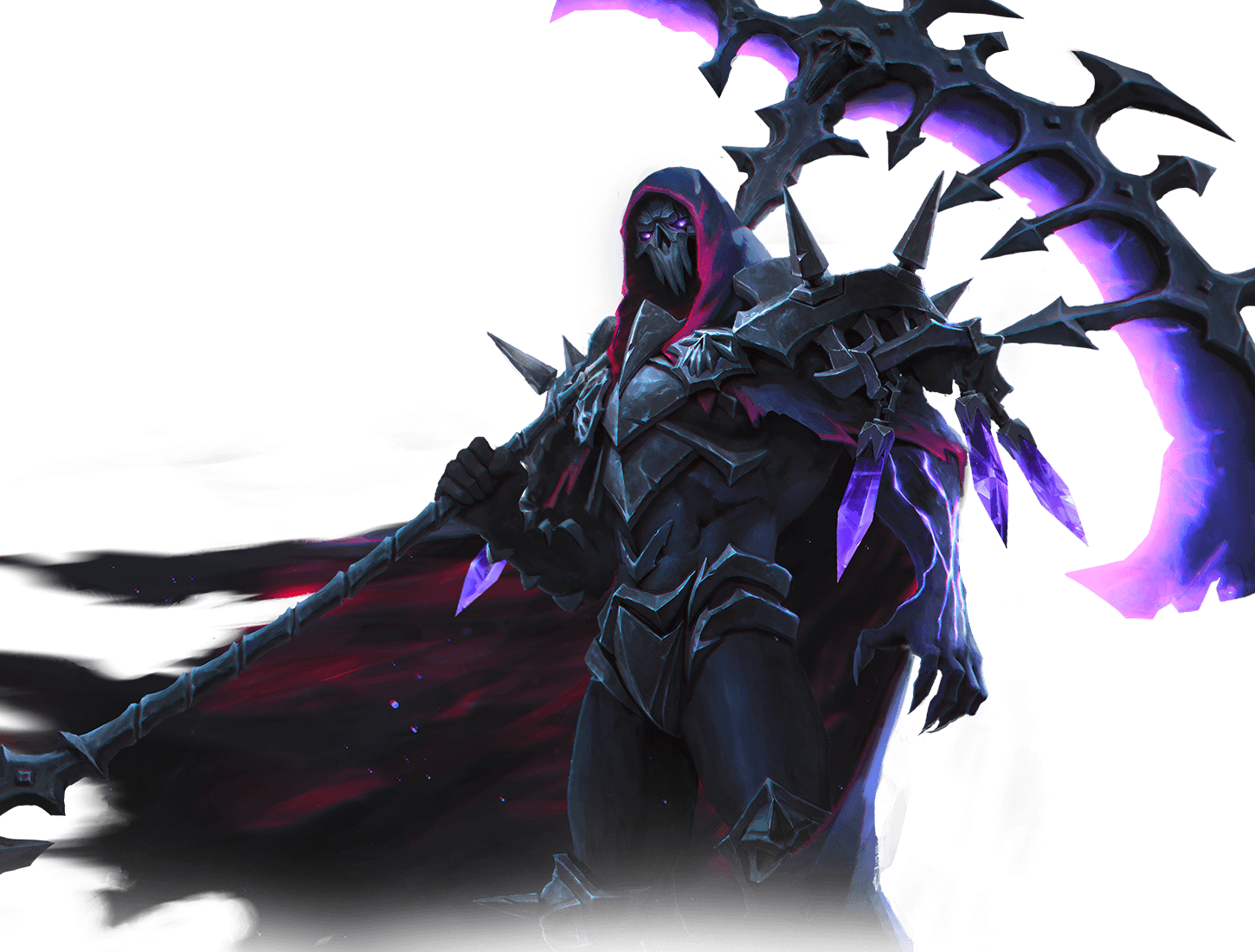
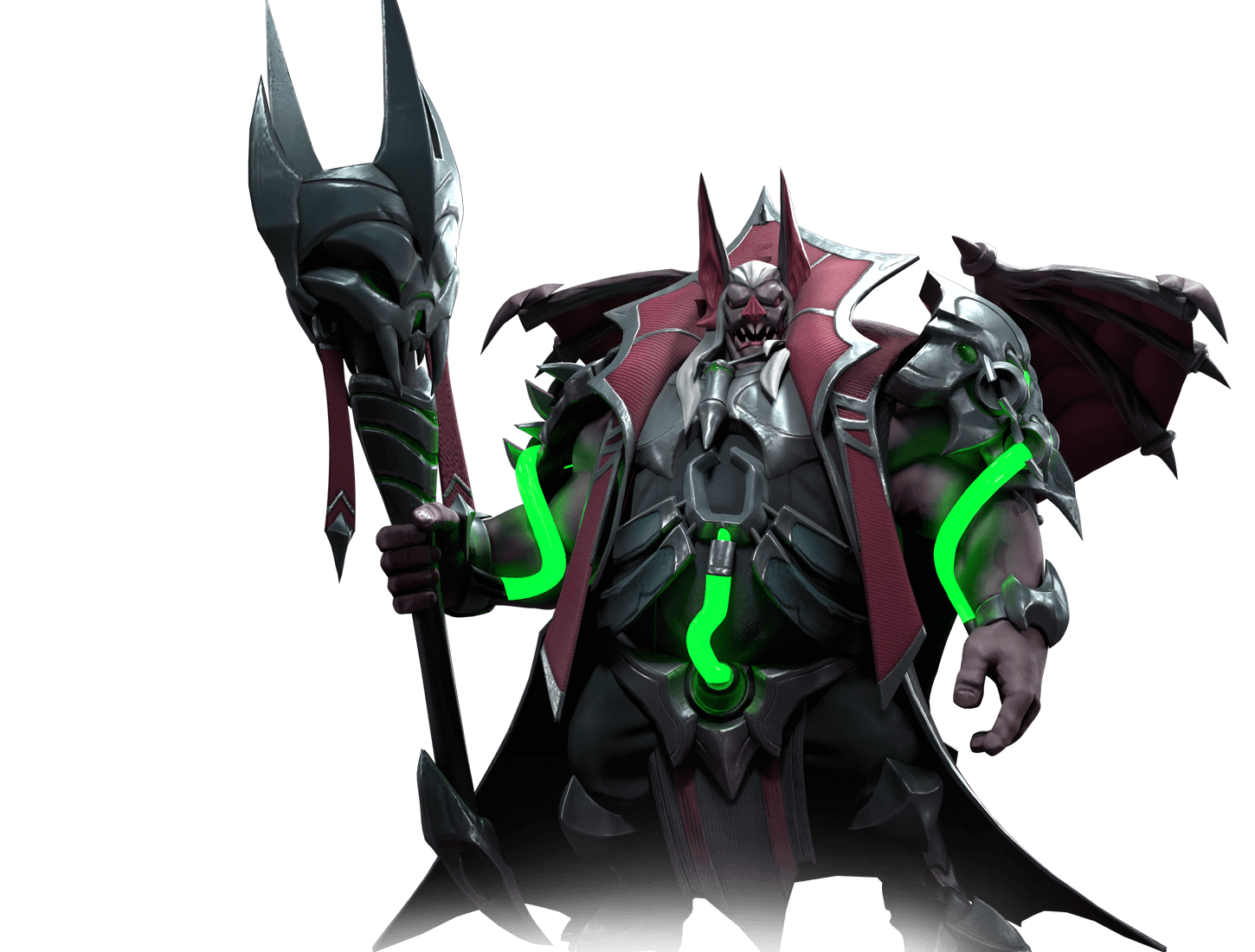
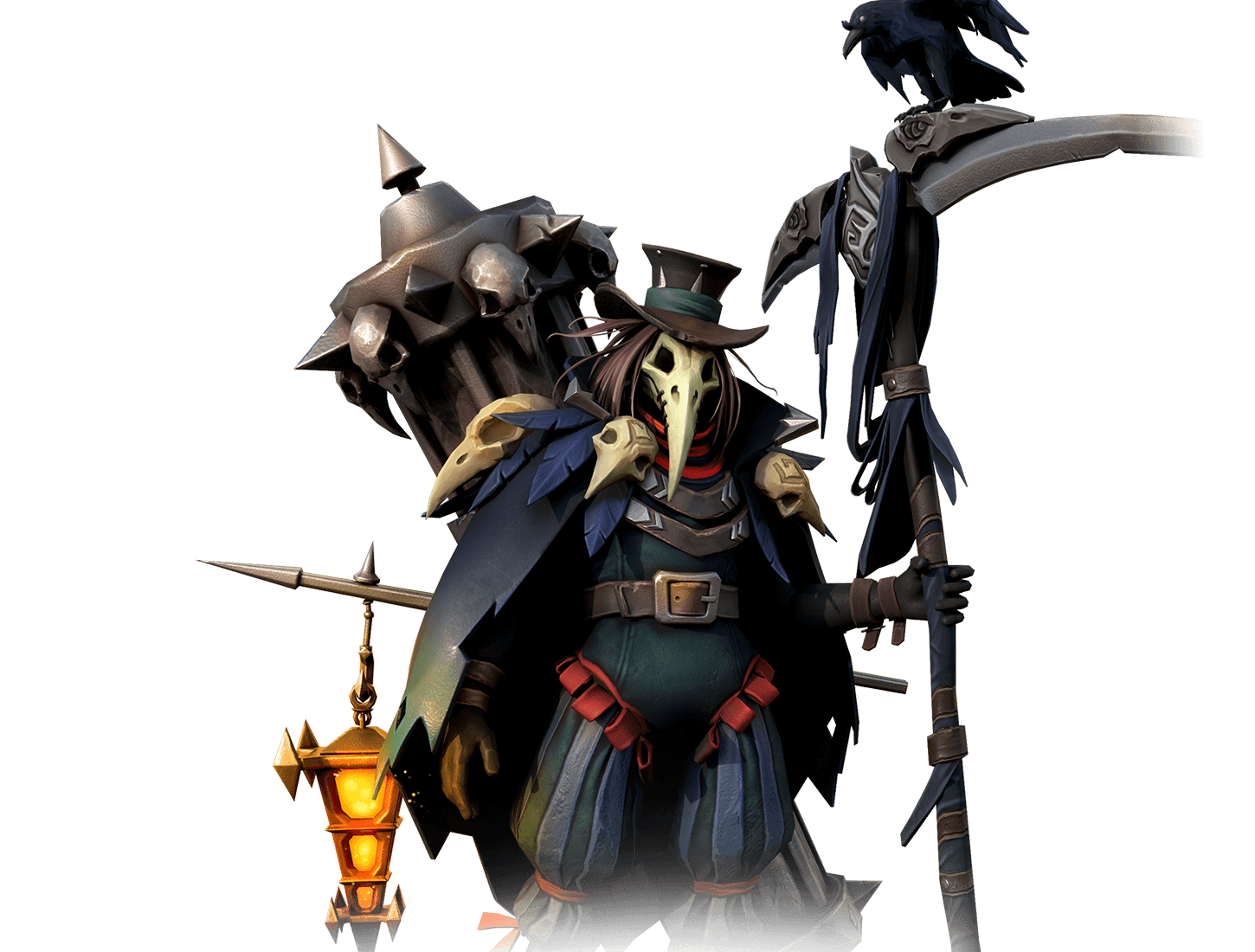
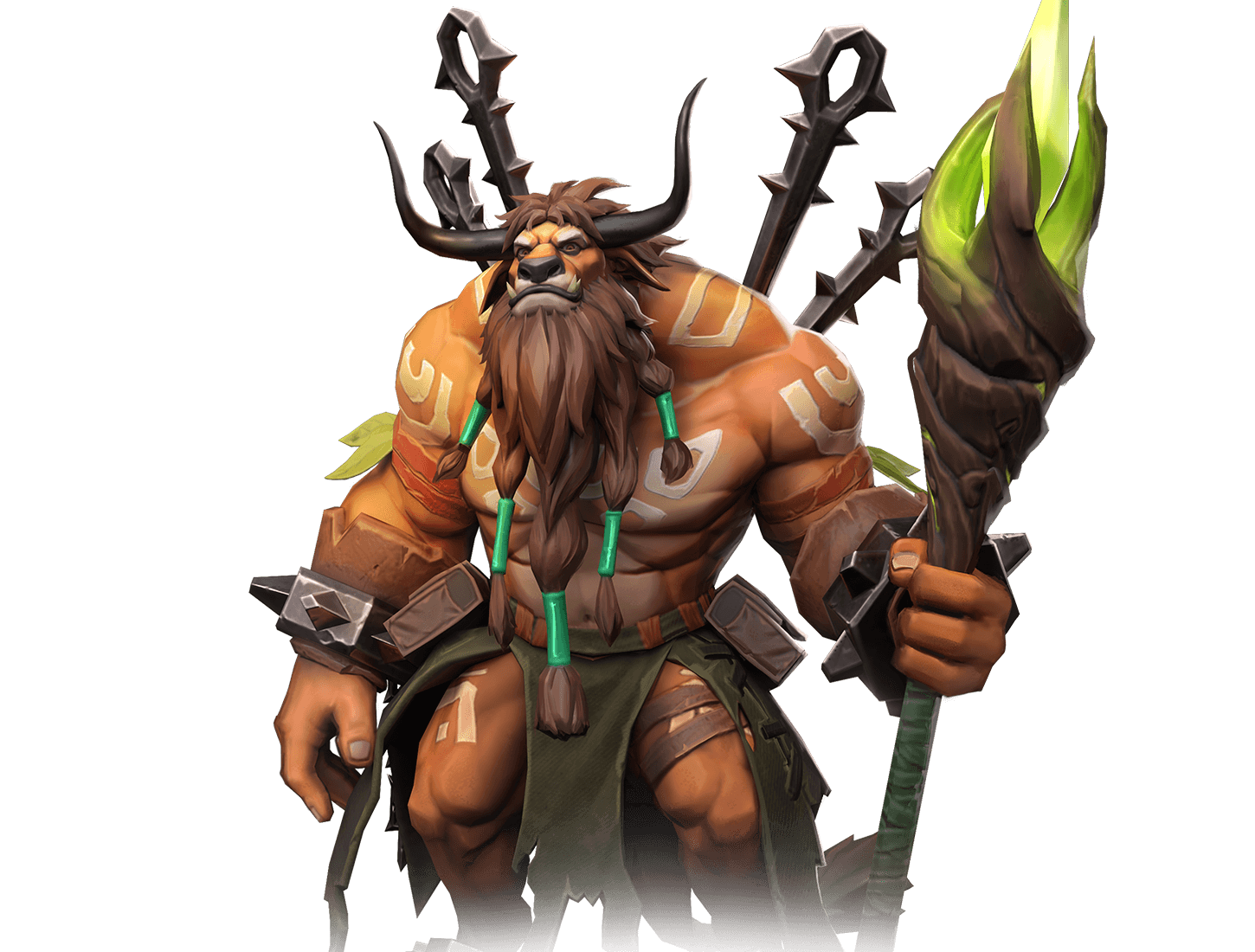
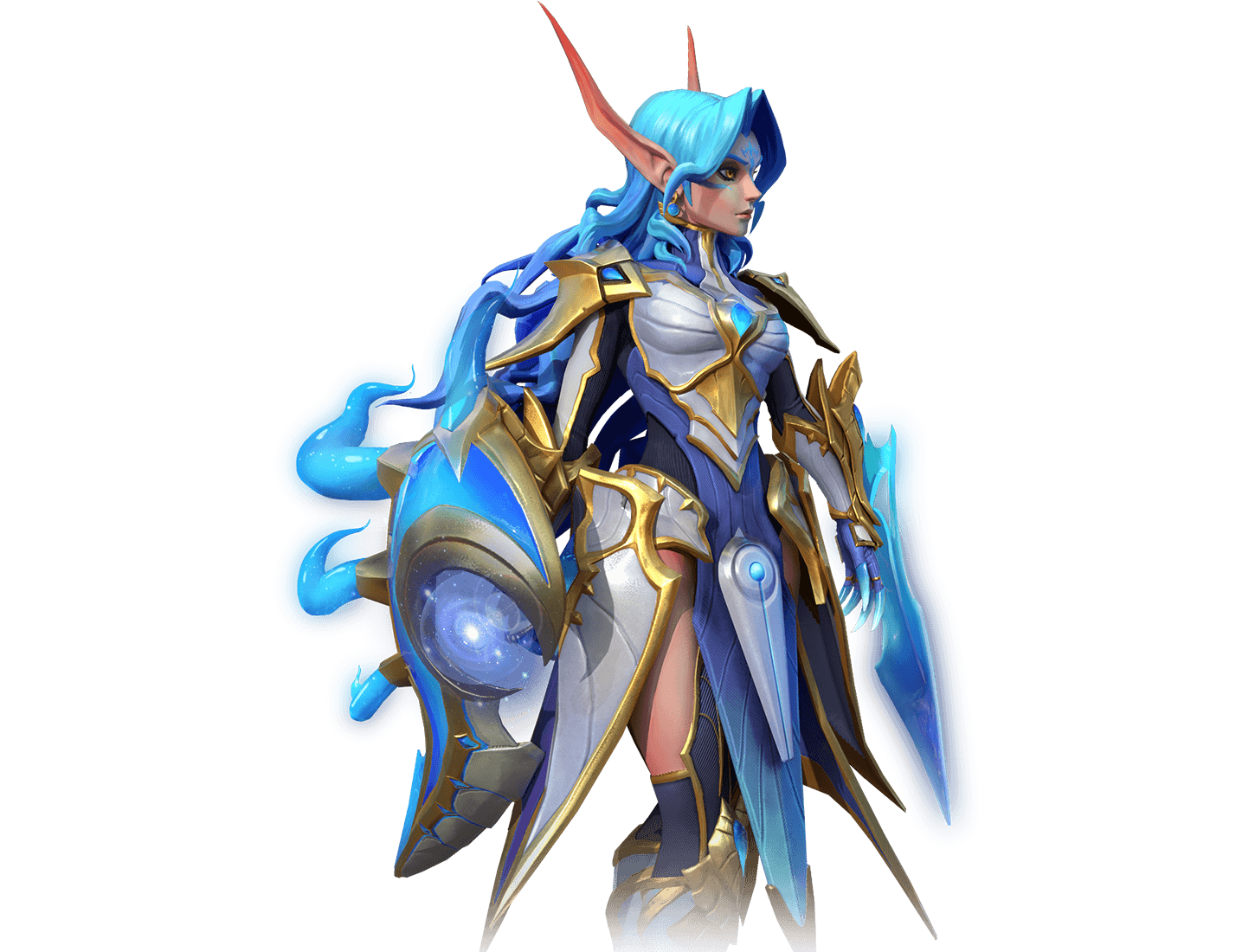
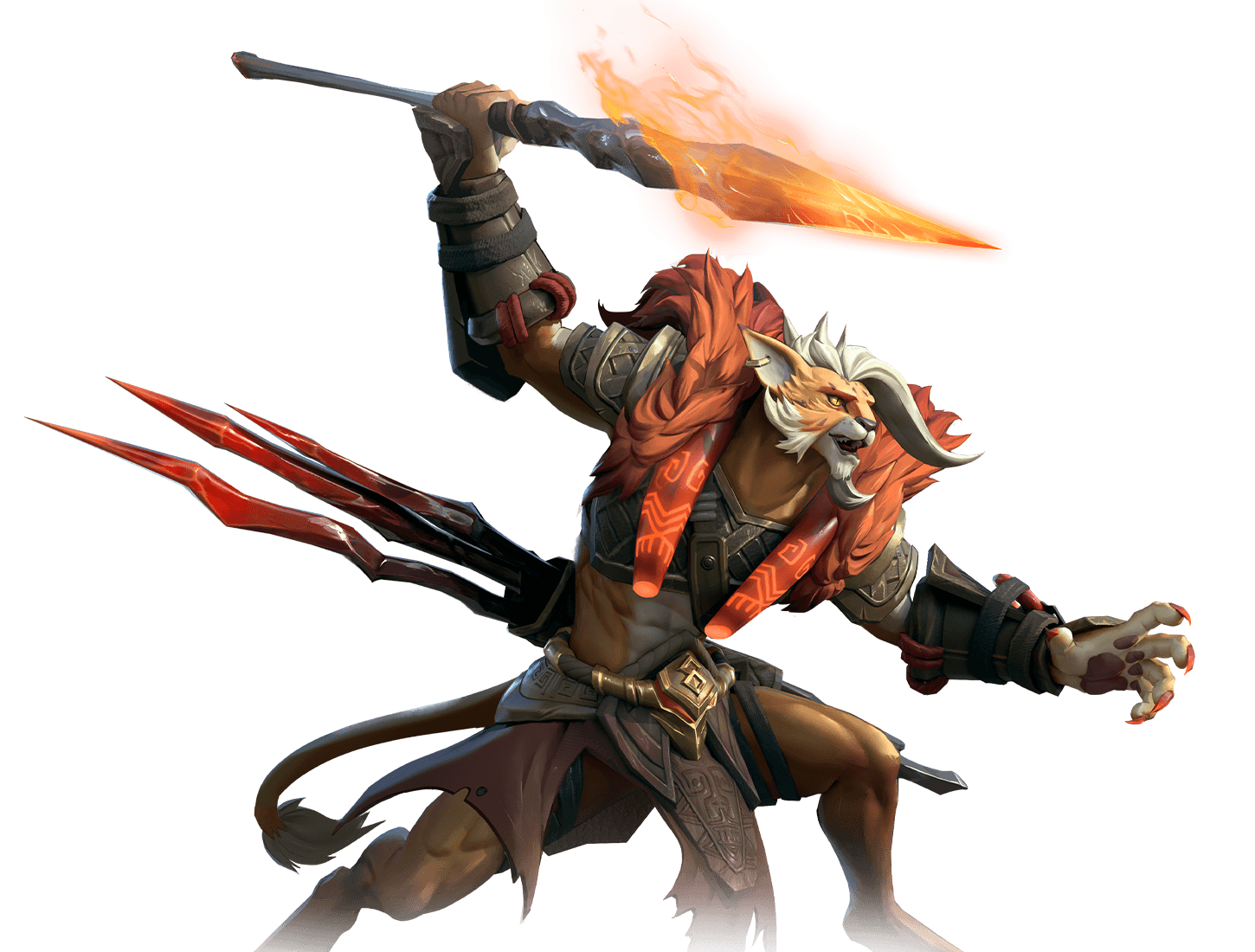
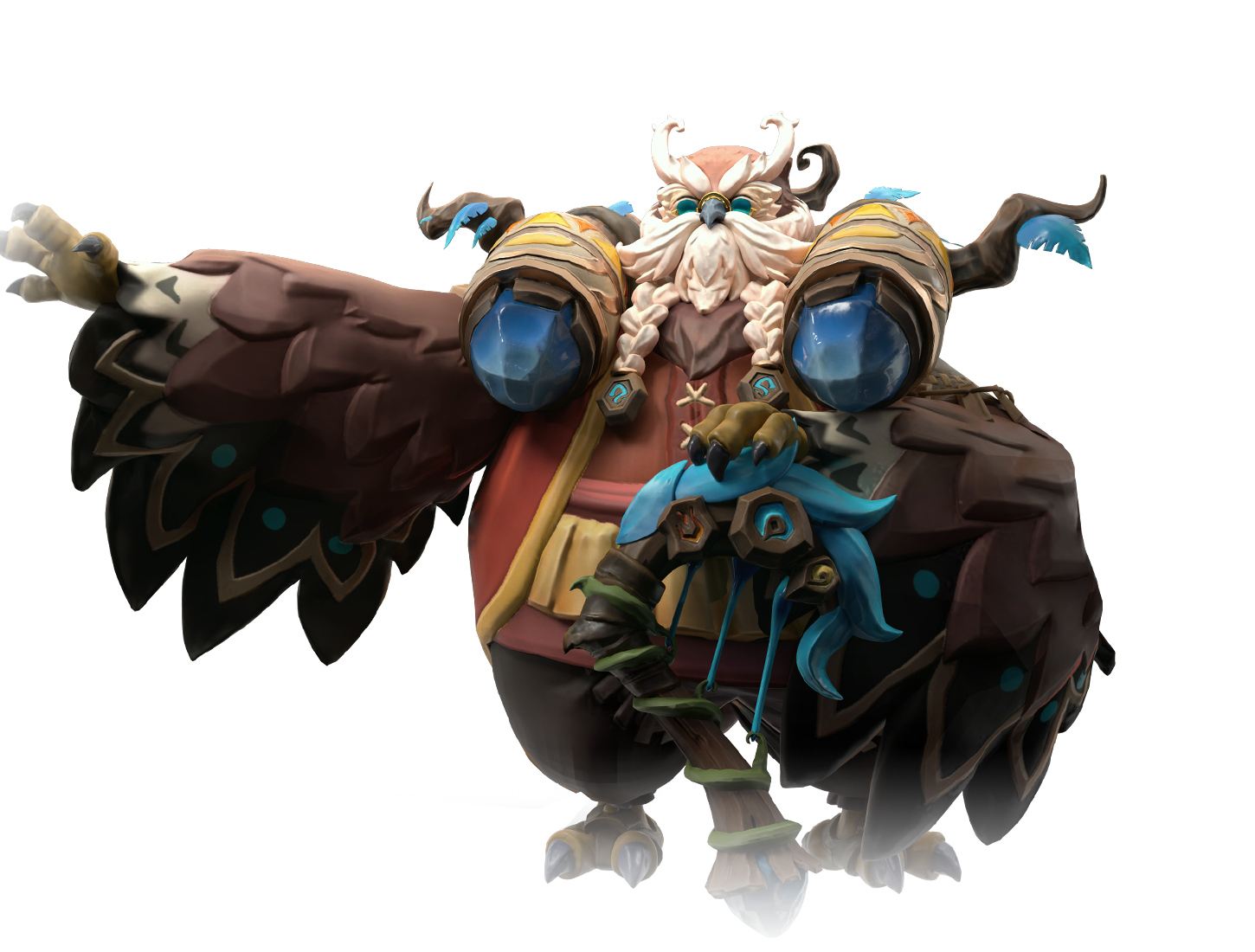
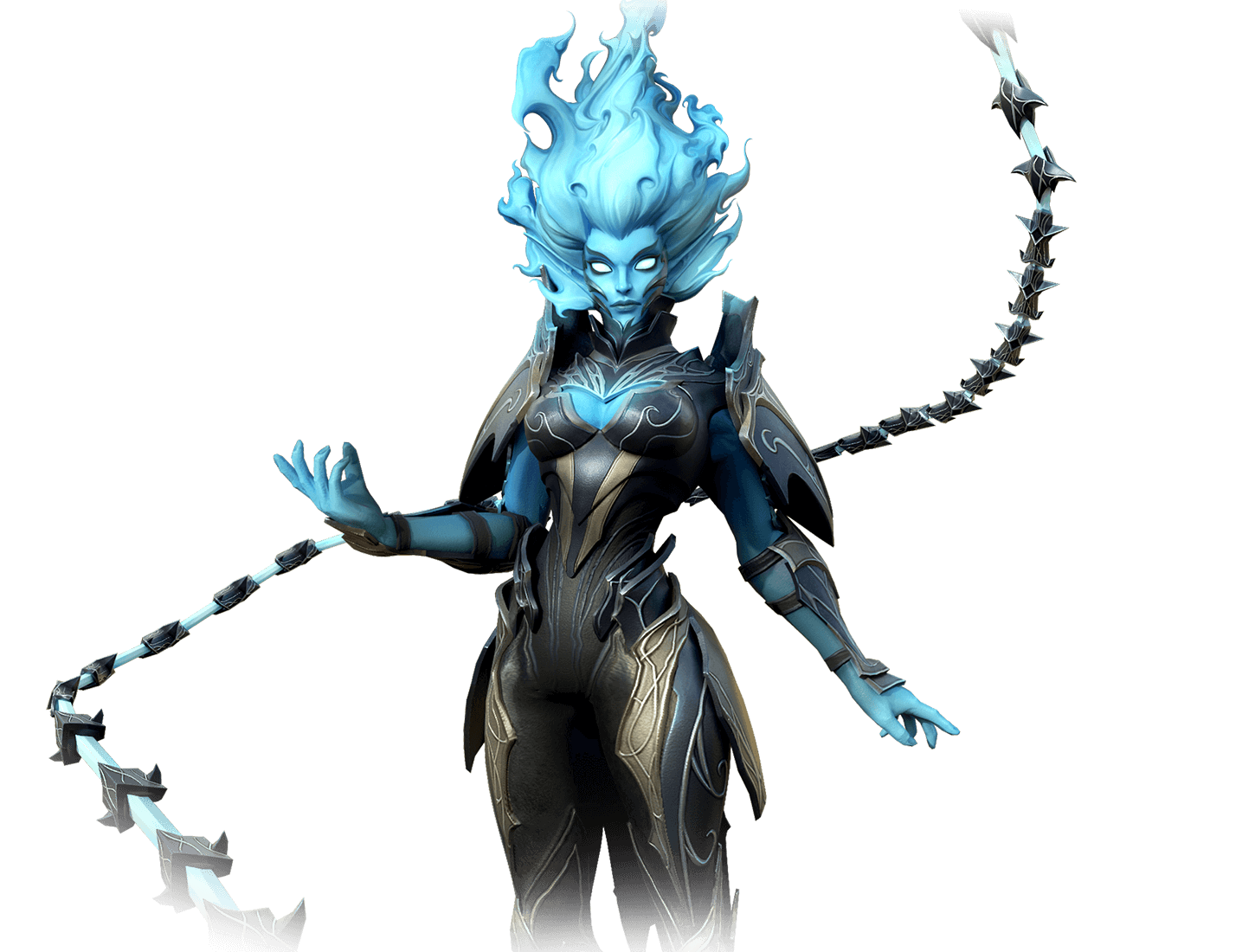
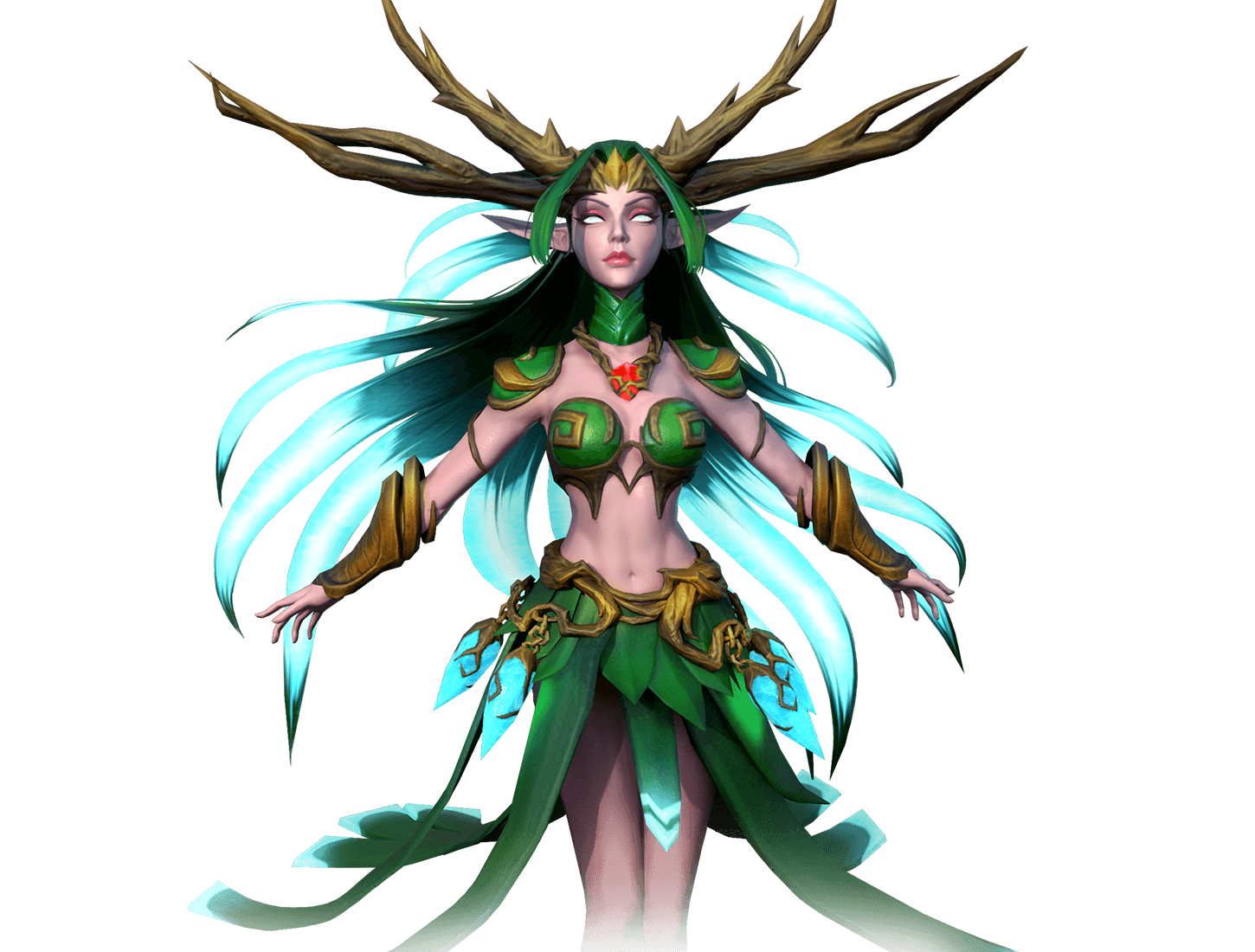
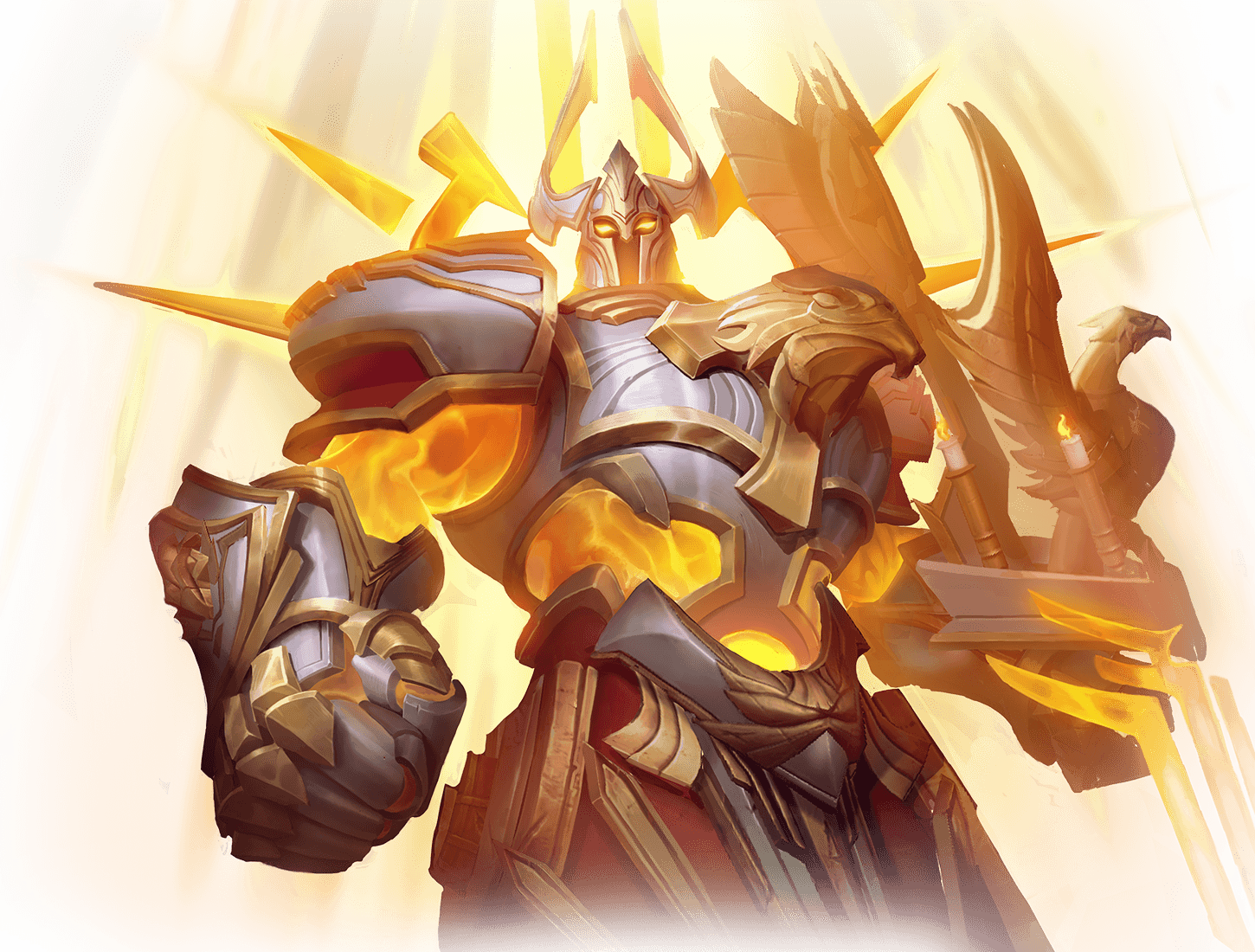
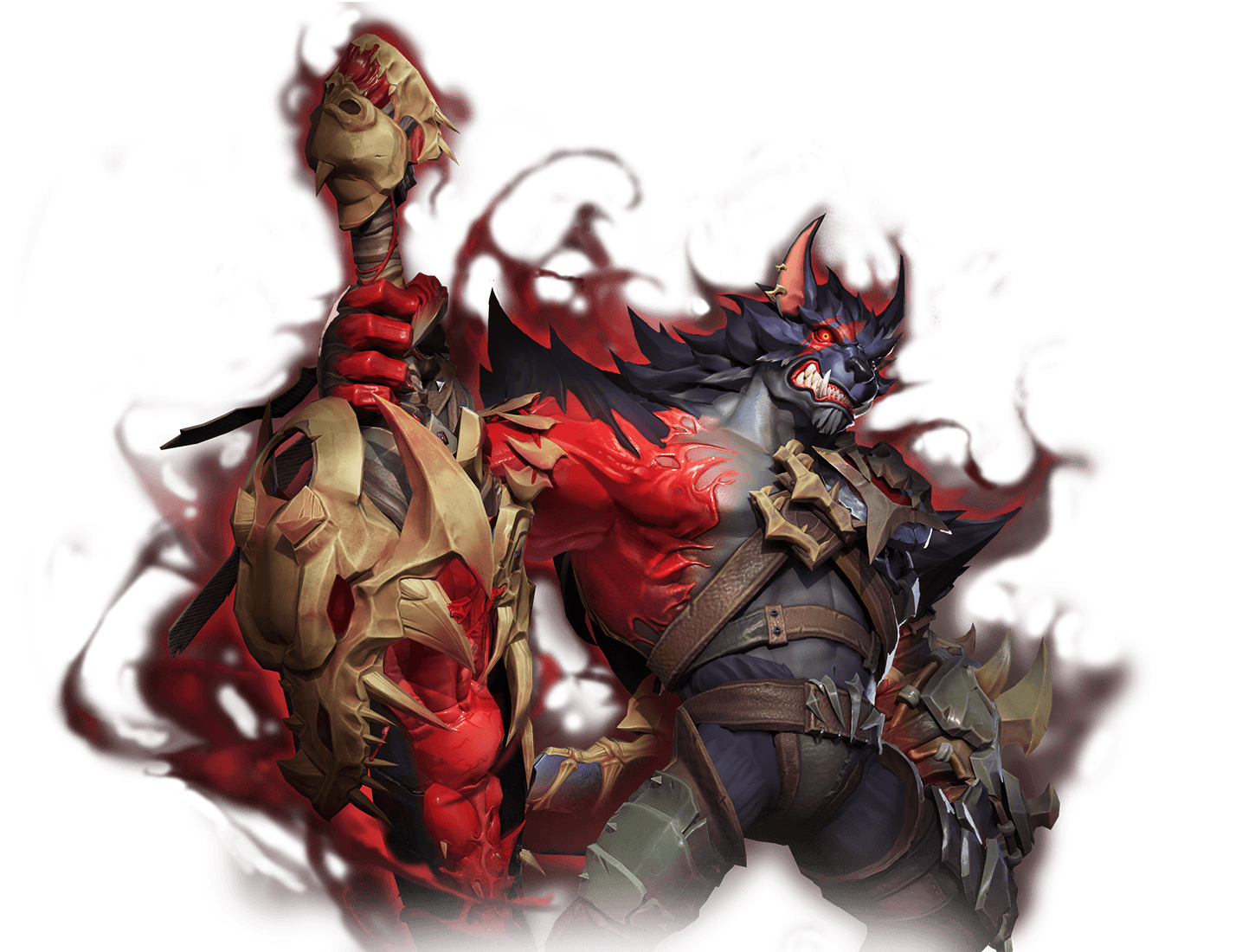

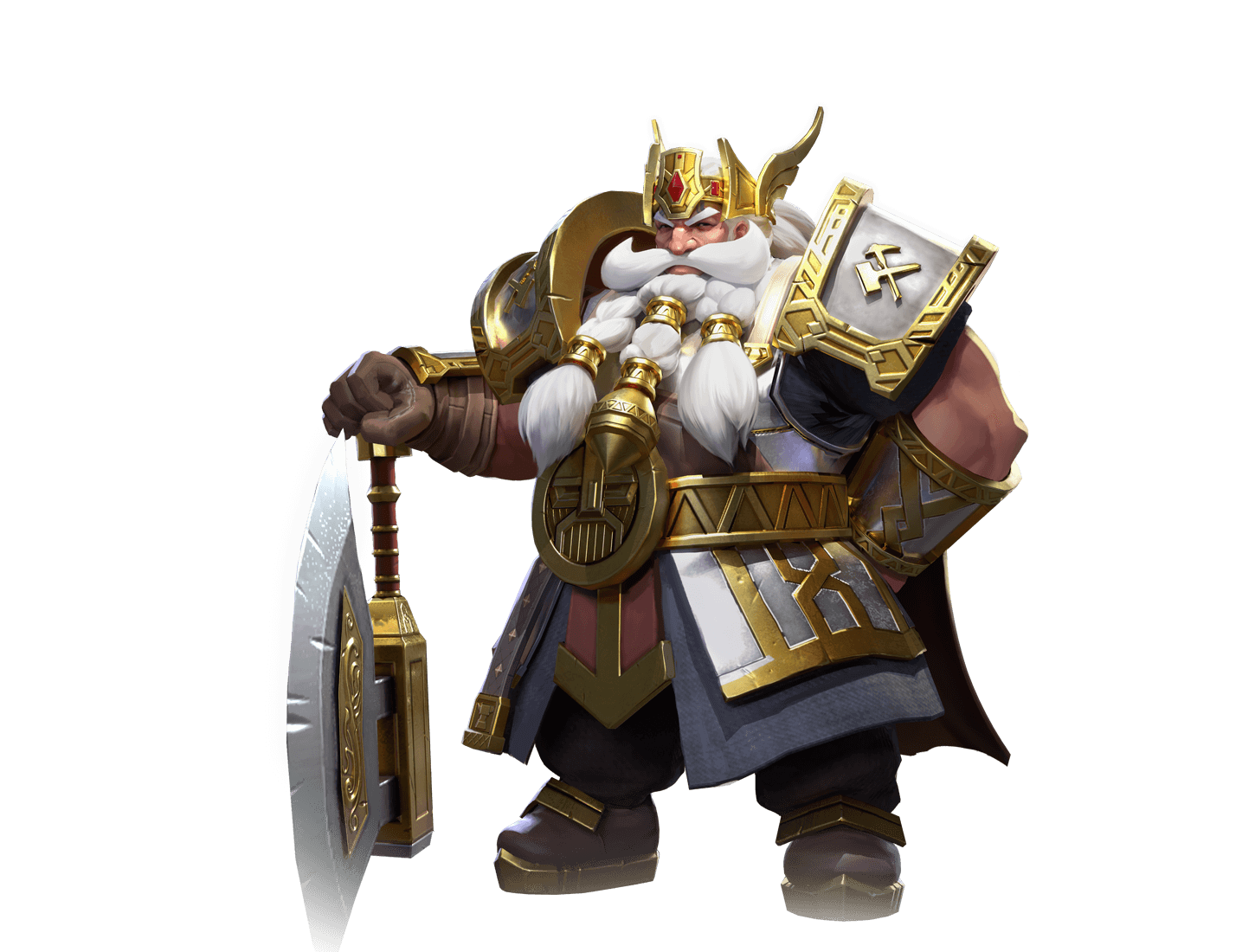
Kasim’s traditional Goblin upbringing instilled two primary convictions in life: of the incomparable value of treasure over everything else and the utmost importance of ceaselessly acquiring it. Kasim hence taught himself in the arts of grave robbing and theft from a young age, and always kept his ear pressed close to the ground – wherever rumors of treasure spread, there Kasim would try his luck.
For all of Kasim’s innumerable enemies throughout Aurelica, it must have the merchant convoys around the Crisas Desert that despite him most as his burgeoning group of goblin thieves have plundered the routes to their heart’s content with magical sleights of hand as to frustrate the most determined guards. Moreover, Kasim is only the most talented of this group of talented thieves covering such specialties as underground tunnel digging and explosive manufacture. Thus, Kasim and his merry band soon accumulated a surprisingly large fortune in just a few years.
Kasim’s band soon graduated to the richest isolated organization within goblin territory, rich enough to force even their supposed leader, Gubeg, to extend the hand of cooperation. Yet Kasim is no fool, and quickly realized Gubeg’s natural cowardice and over-reliance on the beast Horace makes him vulnerable to a change of government. Kazim has hence begun to plot alongside many of the other factions of Crisas for a way to assert himself as the goblin’s rightful leader.
Long gone are the days since the Bantus of Crisas held sway over Aurelica from the seat of their vast empires, or built magnificent structures imbued with magic rarely seen since ancient days. Centuries have come and gone, leaving little else but the sacred Ramoz Temple, still standing tall as an impressive sight to match the setting sun, and the occasional desert ruin. Today’s Bantus are few in number and, like Garrell, mostly devoted to the quiet patronage of ancient tradition from within their secluded Sacred Temple.
Garrell is a proud inheritor of the ancient customs of his Bantu elders, the which he has spent countless years honing with martial vigor within the sanctum of his people’s temple in Crisas. He, like many other Bantus, see the cultivation of mind over matter and the physical body as a means of unlocking the greatest power of all: the corporeal manifestation of one’s spirit in physical form, which the Bantus call the “Makuna”. Decades of training did not disappoint. Like many of his people’s greatest warriors, Garrell at last unlocked an extremely powerful manifestation of his inner spirit – a four-armed avatar of fire and power.
Garrell awoke from the blinding incarnation surrounded by a pool of fire, which radiated outwards from his slumped body on the floor. He stood, eyes aflame, hair flowing upward as if by a magnetic force and behind him the terrifying visage of the four-armed Makuna. Garrell turned his eyes to the horizon beyond the temple windows as he considered the power of his burning avatar. He now had the strength to venture forth and deal with Crisas and perhaps Aurelica as he pleased. But should he come in the manner of an avenging angel or a force of salvation?
Hector is perhaps not so much a warrior as a belligerent force of nature, an aggressor among aggressors and a truly warlike man. Obsessed with combat and competitions, Hector defeated the strongest warriors of his native tribe before venturing further afield for more worthy foes, a pathway that inevitably took him, alongside many others of such an aggressive bent, to the “Holy Land” of gladiators – the Bloody Arena. The other warriors of Hector’s tribe had always spoken of the place in legendary tones, telling of its era of glory and the unequalled strength of the warriors there from across Aurelica. Regardless of the source of these stories, the sometimes ill-maintained Arena filled with desperados, slaves, exiles, and general lowlifes did not and could not live up to such glorious expectations. Hector finally arrived at Crisas after some time to discover a far more commercial and cost-focused organization than he had expected. A dream is a dream, however. Hector signed himself up, determined at least to conquer every challenger here as he had done for his own people. A new legend was born on that day, one in some ways more substantial than stories of the Bloody Arena’s might – for Hector soon after dominated all competition and made history as the Arena’s longest reigning champion!
Gubeg, the chief of the desert goblins, obtained his crown by being more ruthlessly cunning and more cleverly deceptive than his only somewhat less crafty brethren, many of whom were sacrificed to Gubeg’s ascension. Such is the way of goblinkind. Gubeg possesses one advantage that those under him lack: a very powerful, poisonous little pet nicknamed “Horace”. Gubeg stumbled into a dangerous mantar lair on a poorly directed hunting expedition, but was lucky to escape both with his life and a small mantar egg on the verge of hatching, which became Horace.
The mantar are a rare, cold-blooded, and somewhat worm-like rotund species capped with horns and fish scales which inhabit the southern and western areas of the desert. The creature would be harmless enough were it not for the deadly poisons concealed behind their fangs, which can even kill an orc with one bite. Gubeg effectively adopted the orphan Horace by maternal imprint upon the creature’s birth, who has since become extremely attached to Gubeg as his dangerous animal bodyguard that Gubeg can also parade around his fiefdom upon his back. Goblins are, as a general rule, a somewhat disloyal race, and so it is perhaps thanks to Horace that Gubeg has lasted uncommonly long in his position.
An unlikely leader in some sense, Urzag found himself in the position of Warchief of the Horde after narrowly defeating his former friend and warchief Orakh in a desperate struggle to save his people from the corrupting Dark. To his brothers, Urzag possesses far too many human qualities: compassion, a slight touch of introversion and unwillingness to fight. Yet his love and concern for the Horde and breadth of vision cannot be denied, and thus Urzag’s less “orcish” qualities can be tolerated. Urzag’s long journey to the rank of War Chieftain has provided greater insight than typically afforded the average ruling orc, a skillset he put to good use in the first challenge of his new reign: the invasion of the Azure Dragon. Urzag led Bruszakk and the other brothers in a great battle against Azure the Great, who had an unfortunate penchant for feeding on orcs and goblins. The mighty band eventually slew the dragon, with Urzag delivering the final blow. In true orchish fashion, Urzag then bathed in the dragon’s blood, confident that he is increasingly becoming the strong leader his warriors require.
Former Warchief of the Horde, Orakh’s rule over his people can be characterized largely by his obsessive desire to return to their ancestral home – the Windtalker Plains, which is today firmly ensheathed within the territory of the Hirschbach Empire and guarded by its near-impregnable Solar Fort. Such ambitions would have remained mere wishes had it not been for an extraordinary new power revealed to Orakh by the Duke Nicklaus, who had made it his diplomatic mission to convert Orakh and his Horde to the Duke’s side in his battle against the Empire. Nicklaus revealed such power to Orakh at the Isle and burial place of the Holy King Carlos that would “easily allow your Horde to grind that cursed Solar Fort into powder”. And Orakh knew it to be true.
Nicklaus had found a willing recipient and, in time, Orakh and his brothers came to possess this dark source of power too under the guiding hands of his strange and terrifying High Priestess Valeria. Imbued by the power of the Chaos Shard, which Orakh had consumed into his body to wield the same power controlled by Nicklaus and Valeria, Orakh found himself transformed into the most powerful Warchief the Horde had seen in generations. Orakh realized he and his Dark-turned brethren now had the unquestionable ability to take back their ancestral lands and destroy the cursed Urzag, the last remaining thorn in his side.
Barely a millenia old, it would normally be unthinkable for such a young Ice Dragon Princess to ascend to the position of Queen. These are not normal times, however, since the rapacious hunters of the Hirschbuck Empire have brought her kin to the brink of extinction. Hydrissea has often been tempted by Savanna’s path of vengeance, and yet seems to possess more forgiveness then her years would suggest. Unwilling to walk the Dark path of her esteemed friend, Hydrissea has instead withdrawn her people into the recesses of Dragonscale Marsh and away from prying eyes. Yet the Ice Dragons pseudo-retreat from politics has proven short-lived as a new darkness threatens once again to destroy all of Aurelica…
Asrina was marked for suffering from her very birth as an outcast among the elves for her partial dragon heritage as well as an outcast among the dragons owing to her dishonorable half-breed status.
Asrina may have realized her lowly social status, but certainly not the full depravity of the dragon High Priestess Savanna’s plan for her life, one of the few the members of her adopted clan who treated Asrina with any kindness, until much later. Asrina had in fact been marked from birth for a very unusual ceremony handed down through the dragon clans for generations, and which demanded a sacrifice every thousand years to the ancient Dragon God in return for the gift of greater power than had been bestowed upon any of the other races in Aurelica. It was thought that the lack of a sacrifice, were it not met, would immediately call down the wrath of this divinity upon the entire species, and yet could be easily averted by the offering of a sacrificial lamb of sorts.
Thus, Asrina had been groomed from birth as the outcast of her tribe to fulfill her role in this ancient ceremony, marked before her birth by the previous High Priestess, and for her part Savanna felt partially responsible for Asrina’s unenviable sacrifice and an occasional moment of pity for the young lady destined for the flames. Yet somehow the sacrifice did not eventuate. A new and powerful faction never yet seen during the days of the dragons arose in Aurelica – the Hirschbuck Empire, and with them a powerful and dedicated contingent of mages specializing in hunting dragons. These dragon hunters had wiped out much of High Priestess Savanna’s people before her very eyes, prompting the once pious priestess to join the dragon liches in a desperate bid to save her people through a union with the Dark.
News of Savanna’s departure from the Light prompted Asrina to locate and plead with her former Priestess to turn back to their Dragon God. Savanna couldn’t care less about the Dragon God’s sacrifice or pleasing her wayward charge at this point, and bluntly revealed the true nature of Asrina’s ultimate fate had the empire’s Dragon Hunters never invaded their land. Asrina left her presence deeply shaken, determined to investigate the truth of the matter. True enough, the terrible destruction of her people had in fact saved Asrina from an even worse fate at the hands of her supposed kin. The invasion had liberated her to decide her own fate, neither elf nor dragon, nor beholden to anyone else in Aurelica…
Ultimately, Asrina survived the date that was supposed to have been the day of her sacrifice, on which there was no evidence of the Dragon God’s displeasure. Quite the reverse, in fact, as Asrina was struck by a bolt of lightning on that day which left her essentially unharmed and with a suite of new magical powers. Newly strengthened by her additional magical sensitivities, although greatly confused by their source and nature, Asrina is determined to turn the hatred for her former people, who would have rather sacrificed her than incorporate her into the community, into a campaign of destruction against all dragonkind…
The cold-blooded Lizardmen dwell in the dense swamps of Dragonscale Marsh where thousands upon thousands of eggs are laid, incubated, and then hatched in vast birthing pools regulated by the humidity of the inhospitable bog. Tens of thousands of eggs can be expected to introduce new lizardmen to the ranks of the Hive with each birthing cycle. None could identify their parents, and would most likely appear indistinguishable from one another to the human eye outside of the physical differences associated with the four-tier Lizardman cast system. Lizardman eggs hatch randomly into one of four broad castes: Lizardmen, Lizardmen Brutes, Channelers, and Spectrals. Those born into the ordinary and Brute castes are effectively beasts of burden with very limited critical thinking skills. Channelers are capable of independent thought and can wield primitive magics, but the Spectral lizardmen are the brains of the Hive.
The loss of all Spectral Lizardmen over centuries of war with the dwarves dealt an enormous blow to the Lizardmen, giving the dwarves free rein to mine further and further underground and poison the adjacent Marsh with more and more toxic runoff and acidic smog. The recent birth of Ztlin has dramatically improved the Lizardmen’s fortunes, the first Spectral in nearly a century and probably one of the most powerful Lizardman sorcerers of the last thousand years.
Anointed the title of the “Great Prophet” by the Lizardmen soon after his birth and abilities became known, Ztlin, a figure of worship and veneration among his people, has led the Lizardmen out of their dark hiding places and into several successful engagements with the dwarfs. As a Spectral, Ztlin is capable of much more complex thinking than the lower castes, who are naturally obedient to their superior. Ztlin has in fact unified the Hive into an unbreakable unity through the aid of Channelers who telepathically convey his commands to the lower caste Brute and ordinary Lizardmen. Ztlin’s incredible telekinetic powers do not even require conscious intervention: a telltale sign of Ztlin’s ponderous meditations is a wall of shimmering energy that Ztlin’s mind automatically generates to shield itself from potential intrusions when vulnerable. This power can be channeled into violent electrical storms that have been known to tear well-made dwarven armor from their bodies like leaves blown by the wind. For all intents and purposes, the dwarves may appear to control the Mountain Kingdom, but Ztlin might already have the strength to flush these noxious inhabitants out with a concentrated strike with his increasingly massive army. Ztlin is nothing if not a careful planner and must be assured of victory beforehand. His forces have been steadily moving through the mines, attacking peripheral settlements while cutting off escape routes or trapping fleeing warriors with magic. Dwarves can only watch on in horror as contact is lost with one outer settlement after another, and from which no survivors return to tell of what happened. Ztlin knows the hour is coming when the Mountain Kingdom will once again belong entirely to the Lizardmen.
The Fallen Dragon High Priestess Savanna has made a name for herself as an implacable enemy of the Imperial Hirschbuck Dragon Hunters and one dragon these predators truly fear.
A member of Aurelica’s oldest race of cold-blooded creatures with a history far more storied than even the oldest of human empires, Savanna spent many of the first few millennia of her existence following what she believed to be the Lord Dragon’s ancient will in protecting Aurelica and the human race, its younger denizens. Long still might the peace between humans and dragonkind have endured without the rise of Aurelica’s first true superpower, the Hirschbuck Empire with its endless army of fanatical Dragon Hunters able to strike at even the most powerful dragonkind. Vast hunting parties from the Imperial City soon culled great numbers of the ancient race.
The cruel slaughter laid the seeds of Savanna’s dramatic change. Slowly but surely, Savanna began to realize vengeance might be a necessary evil against the might of the Empire. It was this very path that has since drawn Savanna into the Dark One’s embrace, the life of a Dragon Lich, and an uneasy partnership with Nicklaus, who shares her hatred…
The subterranean darkness under the rocks of the Mountain Kingdom conceal an ancient species known in the human tongue as “Lizardmen”. This peculiar species of cold-blooded reptiles lives in vast, subterranean habitats that no light has touched, close to the beating heart of the planet’s warm, magna core. Thousands upon thousands of eggs are laid, incubated, and then hatched in vast birthing pools regulated by the humidity of the deep underground and heat from the distant rivers of magma. Tens of thousands of eggs can be expected to introduce new lizardmen to the ranks of the Hive with each birthing cycle. None could identify their parents, and would most likely appear indistinguishable from one another to the human eye outside of the physical differences associated with the four-tier Lizardman cast system. Lizardman eggs hatch randomly into one of four broad castes: Lizardmen, Lizardmen Brutes, Channelers, and Spectrals.
Brutes are by far the physically strongest and largest of their species, capable of great acts of physical strength and none moreso than Mulhex, who towers above even the strongest of the other Brute Lizardmen. Mulhex’s mighty exploits against the hated dwarves of the Mountain Kingdom include the destruction of an entire battalion of well-armed dwarven scouts, which Mulhex achieved by laying extremely still in the deep ice for such an extraordinary length of time that even the Dwarven patrolmen became convinced of the safety of their surroundings. Nightfall came and Mulhex prepared to attack the sleeping patrol only to discover that his tail had effectively frozen into a block of ice. He ripped it off and then fell upon the sleeping warriors with fury in a battle from which few, among them future Elder of the Coldsteel Clan, Lordrec, escaped.
Mulhex brought the severed heads of the dwarves before the Lizardmen at the Hive, and Ztlin the Prophet declared that a notable marvel had been performed among them. Ztlin crafted a tail of shimmering ice and bestowed upon Mulhex a symbol of strength – the “Spear of the Prophet”. Mulhex has since achieved many further victories for the Lizardmen soldiers under Ztlin’s command, who has declared that the appearance of such a mighty Brute to be evidence enough of the gods’ will for the Lizardmen to finally drive the dwarves out of the Mountain Kingdom altogether.
Yolanda sat cross-legged in an isolated corner of the Sacred Temple of Dawn. The complete silence was interrupted only by the rhythmic noise of her breathing as she focused her mind inward in deep meditation. Her spirit might as well have been in another world and, in a very real sense, it was. “Oh Light of the Dawn that I love and serve with all my heart, your most loyal follower pleads for your help! Our land, which has already endured much torment, is about to be struck by a fresh disaster of extraordinary brutality. I humbly ask for more power to withstand the Chaos and protect Aurelica.” Yolanda strained anxiously to hear whatever answer may come. She was sorely pressed.
“What power you have is enough.” A pure, gentle voice drifted into Yolanda’s consciousness with the unmistakable signature of the Goddess of the Dawn herself. “Is it enough? I feel completely helpless against the raging Chaos.” “Yolanda, you are a practitioner of the highest order in Light magic. You are a wielder of sorceries powerful and terrifying. They carry not only the power to save but also purge the evil of Chaos.” “Yet how do I make more effective use of such powers?” Yolanda replied in her mind’s eye. “You need not seek beyond the borders of what you have, Yolanda. Your powers are sufficient. You have styled yourself as the protector and healer of others until now. Perhaps you have forgotten you are more than a trustworthy guardian, but a fearsome warrior. Remember, the Light can both save and destroy.”
“Do not fear the all-consuming fire channeled by your Inner Light. Release it in full! And you will become a Sword of Judgment.” Yolanda suddenly became aware of the air against her face, the hardness of the floor, and her own breathing as she felt her spirit return, answer gained. The Goddess had revealed an alternative pathway Yolanda had little explored. No longer should Yolanda feel obligated to serve as the protector of all life. She must listen to what her Goddess had said. Clearly, the Holy Light had tremendous destructive power too. She must seek to become not just Aurelica’s protector, but Judgment Incarnate of the Light in the great war to come!
Flarence is the legendary lead dancer of Ruby Tavern, whose extraordinary skills and beguiling beauty has captivated the minds of the islands’ cynics on more than one occasion, particularly during their raucous annual festivals.
Many an unhappy drunk or degenerate gambler has passed a slightly more pleasant time on the pirate island of infamy thanks to Flarence’s presence, which would not be so curious were she not so talented an outlander who seems to be in search of someone or something.
The reality is Flarence is the Mysterious fifth leader behind the Island’s secretive ruling organization: The Hive, and in charge of intelligence gathering. Of course, Flarence is a popular topic of gossip for other reasons too, not least for her enigmatic relationship with the Ruby’s owner, Pluto, which unreliable witnesses have sworn involves late night dances and explains Pluto’s merciless, no-holds-barred treatment of any man that would dare besmirch Flarence’s good name.
Opal was fortunate enough to be born into a family with an unusually dignified pedigree – both her parents were captains within the Hirschbuck Empire’s Capital Guard. This imbued Opal’s early life with an extraordinary sense of parental expectation, reinforced when Opal was a mere 4 year old toddler with a dedicated training regimen combining military discipline, swordsmanship, and martial arts into the finest military education the imperium could offer as to hopefully transform Opal into one of its finest warriors. Her father’s crushing defeat in the Imperial Jousting Tournament at Lasir soldier Vance’s hands, whose magical abilities proved physical skills would never produce the mightiest warriors in the empire, proved a rude awakening. This revelation culminated in Opal’s transfer to the Imperial Academy, where her exhausting martial arts training would now be complemented by spellcasting.
Opal’s physical dedication and natural intelligence soon won plenty of admiration at the Academy. Yet Opal found something else as well: her first taste of freedom outside her family’s rigorous strictures. Alone and far from her overbearing father, Opal was free to discover other interests besides fighting.
It was in the Magical Artificer course at the Academy where Opal showed the most talent, earning the appreciation and friendship of her powerful mage-lecturer, Ankor. Ankor nurtured Opal’s talents toward the crafting of the unique magical weapon she still uses today – a ranged lance imbued with such unusual energies as to have quickly earned her a very fast captaincy in one of the empire’s border guard regiments.
It often happens that the fastest way to lose one’s dreams is to achieve them, and so it proved for Opal whose stint as guardswoman and chaperone to some of the most important, or corrupt, aristocratic families in the empire or imperial house quickly gave rise to a sinking feeling of despair in Opal’s heart. Opal’s unique magical education had allowed her to reinterpret many of the Guard’s enforcement actions as tyrannical plays to reinforce the status quo that rode roughshod over the peasantry. The noble ideas that Opal’s father had inculcated into her of loyalty to imperial house and empire began to fissure under the weight of cynicism. Opal found herself reexamining the Guard’s real role in the empire. Opal’s cognitive dissonance finally came to a head one day when her subordinates visited her chambers to find their captain had skipped town. Opal had finally seized the opportunity to leave the empire and its mechanisms of oppression behind…
Boolin is a member of the Tachonians, a highly sophisticated civilization whose technology is largely built on an extremely powerful network of energy crystals providing nearly limitless cheap and accessible power.
Boolin and several of her colleagues at the Interdimensional Teleportation Laboratories Incorporated Lab No. 5 on Collan Street experienced a massive industrial accident some time ago, leading to the formation of a nearby interdimensional rift that deposited her and several other members of her team into the world of Aurelica with no way home and in a place lacking even the rudimentary understanding of subspace atomics.
Boolin and her compatriots have ultimately decided to make the best of the new lives by setting up shop in the Free Cities, where their unusual wares dazzles less sophisticated citizenry familiar only with the arts of magic.
Tia is known by many honorifics among the Talinese: the “Ruler of Talin”, the “Great Reformer of Talin”, and even the “Light of Talin”. Such titles must constitute an impressive pedigree given that Talin is one of the most distinctive and conservative of the human kingdoms of Aurelica – a strongly matriarchal society governed by one of the oldest continuing sets of traditions anywhere in the world, lying in the far southeast of Aurelica’s main continent. In a generally male-dominated world, women in Talin Society occupy all of the major seats of power – economic, political, cultural, and military positions in Talin society are all controlled by women. These Talinese traditions are also reinforced by several other unusual customs, such as an unspoken requirement on men to remain in the house of their bride upon marriage, and that women will remain in their parent’s household forever.
Outsiders may see Talin in rather less welcoming terms: a xenophobic, hyper-traditionalist matriarchy that has chosen to sacrifice the economic wellbeing of their people to maintain a distinctive cultural identity, ruled under the stultifying hand of a council of elderly matrons. However, Talin’s inward focus is as much a result of military considerations as tradition. Talin’s rulers are obsessively concerned with limiting their people’s exposure to foreign societies, powers, and different social structures in order to maintain as much social homogeneity and obedience is possible. The powers that be in Talin also place a high emphasis on martial arts and physical fitness, including compulsory service in the Talin Guard, all of which have contributed to a very hierarchical structure organized around several great Talin Houses or clans.
Tia’s ancestry can be traced back to Talin’s original founder – Anna Animalaya, and she has remained close to the center of power in Talinese society owing to her relationship by marriage to Talin’s previous ruler before her ascension. Tragedy struck Tia and her sister at a young age with the untimely death of their parents, the sisters thereafter raised in the queen’s household. The former queen quickly recognized Tia’s talent, who became the court’s chosen successor. Tia immediately faced a large set of problems at the head of her new kingdom: civil disturbances within and privateering without, the encroaching armies of the Hirschbuck Empire on Talin’s border, the stratified social structure of Talinese society leading to discontent among the lower classes, and constant shortages of supplies owing to Talin’s lack of trade with external powers – not to mention the ever-present threat of forced abdication should Tia try to address any of these issues in a way not approved of by the other major houses.
Rather than take heed of her own safety, Tia launched herself and the kingdom into a dizzying series of reforms in almost all areas of Talinese life alongside her co-descendant of Talinese royalty and “Lunar Blademaster” Imogen, her closest confidante and virtual co-ruler. Aware of the potential danger to her life posed by these reforms, Tia organized a course of study for her sister with the Academy of Magic in the Hirschbuck’s Imperial Capital where she would remain safe if Talin’s politics turned sour. Nathalia proved a quick study at the Academy, where her Coldsteel armor from Queen Anna and Frost Blade drew plenty of admirers from the Wizarding Halls. Nathalia returned later and, alongside Imogen, provided Tia with the backing needed to implement her vision for Talinese society.
Tia abolished many sinecure positions held by the nobility in order to fill their ranks with new talent; she opened Talin’s ports up to commerce with other cities and encouraged trade with the nearby Free Cities and city-state of Pegasus in order to provide greater employment and a lift in material living standards; she instituted free and fair reforms to the Talin Civil Administration to remove the bias against male examinees and the influence of connections and clout on civil service appointments to hasten Talinese development. Tia’s burning ambition to see Talin transformed into a modern and prosperous society drove a substantial improvement in the people’s living standards and won her the favorite of all her many honorifics: “Light of Talin”.
Evera’s background, how she came to piracy, and where she acquired her “Sword of Thorns” and “Rose Fire” have remained a mystery since the day she appeared out of nowhere at the head of four pirate galleons to defeat a relatively powerful Imperial Navy expedition in the “Battle of the Gulf of Fire”. Evera’s name has since become synonymous with the “Rose of the Black Night” of Pirate Island throughout the entirety of Aurelica. The Mysterious Evera gained a seat on the “Council of Four” governing the affairs of the Pirate Island soon afterwards, and remains one of its most feared occupants. A lady of uncommon beauty, Evera has found no shortage of suitors, fair and foul, from among the pirates’ ranks, one of whom infamously went to the trouble of establishing a giant statue in the main town center to win her affections, which was then blasted apart by her musket as she declared, “A barrel of gunpowder is worth much more than a man’s love, and it will take much more than stones to win my heart”. Far from dissuading potential suitors, Evera’s confidence has only served to further confirm her reputation as the Island’s most eligible and yet most unattainable woman…
The Halo of Dawn is a truly ancient organization. Even its chroniclers are unsure of exactly when it was founded or by whom, but there is little doubt as to its mission: to protect the peoples of Aurelica from the encroachment of the Dark One. The organization is well known and has been frequently called upon throughout the centuries to aid various kingdoms in their battles against the Dark. Most members of the Halo of Dawn work secretly behind the scenes to better perform their essential tasks. Some members, however, do choose to reveal their identities publicly, the most prominent of whom must be the Archmage of the Sacred Light, Yolanda.
Yolanda is one of the most powerful archmages in Aurelica, and probably its most powerful “Light” practitioner, a school of magic inherited from her mentor and well-placed to deal with the Dark.
Yolanda was born and raised a member of the Bantus many centuries ago on an entirely different continent. She was known as a light-hearted and inquisitive child, gifted in magic but unwilling to restrain herself to the animus magics practiced by her Paladin brethren due to her obsessive study of magic for its own sake. Her inquisitive nature as to its deep mysteries eventually led her to charter passage to the Hirschbuck Empire, where she enrolled in the Imperial Academy of Magic. Yet even their professors were unable to satiate her curiosity, and she began to explore other magical relics and notable mages around Aurelica. Her journey eventually led her to Sylvia, the mother of her apprentice Evelyn who, like Yolanda, shared a passion for research except, in Sylvia’s case, orientated entirely against the Dark One. The pair became inseparable.
Yolanda and Sylvia’s journey eventually led them to a small town on the outskirts of Talin that Sylvia suspected had been corrupted by the Dark. The pair were awoken from a troubled sleep to find themselves surrounded by aggressive villagers, that had been twisted somehow into darkling shadows of their former selves.
Yolanda realized that a portal to another plane lay open and exposed to the air within the village’s chapel courtyard. Invisible to the eye of the non-magic user, she could observe dark beams of poisonous energy snaking through the air, spreading a corrupting influence over all flesh. A blood-curdling scream came from somewhere deep within the Rift-world, and a pair of claws and demonic figure emerged. The young sorcerers knew their combat skills were about to be put to the ultimate test.
Yolanda deployed all her knowledge of the arcane to wound the demonic creature, which somehow shrugged off her attacks as if almost harmless, fully recovering from any blow of lightning or fire in seconds of regeneration. The Dark energy from within the portal appeared to be granting the demon renewed strength, and Sylvia barely managed to weave a protective enchantment of Light magic to keep the creature at bay. But time was running out. It was then that an overwhelming burst of Light magic enveloped the town, and burned the demonic creature to a crisp. Another mage? But who could possibly wield such magics? The new arrival dispelled the Dark around the village and returned the Rift back to whence it came. Thus was Yolanda inducted into the Halo of Dawn by her new archmage-mentor, and devoted to the same great work of saving the world.
There is little doubt the new Queen of Talin could not have carried out so many impressive reforms were it not for the backing of her close friend Imogen, a Lunar Blademaster in the ancient ways and fellow descendant of Talin’s founders, and who worked behind the scenes to shore up her Tia’s powerbase. Imogen’s devotion to her queen is not without hesitation, however. As a disciple of the Lunar Blades, Imogen is well-aware of the story of the oath sworn by the first Lunar Blademaster with Queen Anna Animalaya to create a matriarchal society characterized by female empowerment. So the story goes that Talin’s founding as a matriarchy in Aurelica’s northeast was written into its founding moment.
Imogen differs from her queen substantially in temperament also, the coldness of years of harsh training in the Lunar Blademasters having tempered her propensity to smile, displayed particularly against Tia’s ebullient positivity. After all, Talinese folk myths have always held a special connection exists between the definitively female Goddess of the Moon and those women called into the rigorous life of a Lunar Blademaster, a profession said to be inaccessible to all men who lack the blessings of the matriarchal Lunar Goddess. There is no doubt that some strange sorcery is at play as this mysterious order of female ninjas can seemingly annihilate powerful enemies with odd, moon-shaped blades. Female empowerment is as much a source of pride as responsibility to the traditionalist Lunar Blademasters responsible in large part for Talin’s safety over the centuries.
It was Imogen perhaps more than any other of the new queen’s closest aides and advisors who worked behind the scenes to ensure her friend’s hold on power remained intact throughout her titanic reformations of Talinese society. A traditionalist at heart and representative of a highly traditional organization, Imogen could not disguise her growing discomfort with Tia’s pace of reform, nor her organization’s founding mission to ensure Talin’s matriarchy. Unlike some of her brethren, Imogen does however recognize that certain aspects of Talinese society needs to change, and supports and respects her queen’s desire to do so. Unfortunately, Imogen’s doubts have only continued to grow as Talinese society grows increasingly unrecognizable to many of their elders and similar to surrounding cities.
The Order of the Holy Citadel claims to embody the “still-living will” of the Goddess of Light over Aurelica and dispense her boons to the rest of humanity. In their retelling, the Goddess never fell to earth during the War in Heaven, but remains present to guide and protect her pious followers.
Although the Holy Order shares the same roots with the Halo of Dawn, the two organizations have long since parted ways due to what the former considers the Halo of Dawn’s “unorthodox” embrace of powers outside the pure Light. One of the first steps of the first Archcleric of the Holy Citadel, Vane, was to declare any so-called “alternative guidance” and belief except in the Goddess herself an “anathema” to be wiped out. Vane’s chance to obtain religious purity came quickly enough when the two groups splintered.
As Vane’s Holy Citadel had come from the Goddess of Light, so too did he insist his clerics must unshackle themselves from any other power. The power of the Light must be enough; if it wasn’t, then it must be amplified by arcane ritual. Thus, the Holy Citadel organized great assemblies of clerics to magnify Aurelica’s Light element. However, as the rituals grew and magnified the strength of the Light, so too the Dark followed – particularly within the hearts of humankind. Of course, this was known only to the highest members of the Order – and then hoped against rather than openly admitted.
Time has whittled away at the Holy Citadel’s once-mighty edifice, today officially run by the kind-hearted and devoted Archcleric Rachel. She has only started to suspect the truth of her Order’s terrible choices throughout history and her role as a figurehead to its cynical factions. Nevertheless, Rachel is determined to replace the Order’s fervent propaganda and indoctrination machine with concrete actions to protect the land on behalf of the Light. She has also begun to realize the ill-effects of the Order’s rituals to augment the power of the Light, and would see the practice investigated and halted. For this reason, whatever true power of the Goddess resides in Aurelica can surely be said to reside by her side.
Archcleric Rachel may represent little more than a figurehead to the most powerful factional rivals – Edicris of the old guard conservatives and Urion of the pro-imperialists. Each seeks to use Rachel’s popularity to advance their own ends. On the other hand, Rachel has wisdom far more remarkable than her years and the courage to stick to her convictions in both the Light and her own sense of right and wrong above such petty squabbles. Indeed, her objective is nothing less than reforming the entire Order from within.
Before Nero finally ascended to the Hirschbuck Empire throne, not one member of the royal family had ever cared about this lowly son of a commoner. In the eyes of everyone, he was but a small pawn in a power struggle for the throne. Of former King Reinhardt’s 11 princes, both the seventh prince, with the backing of the imperial High Exchequer, and the first prince, who enjoyed close relations with the Holy Citadel, held an overwhelming advantage in this treacherous battle for the throne.
Nero was able to live a life in the royal court despite being the son of a concubine simply because of his special status as a “child born on the eclipse moon”. But still, no one but the superstitious Reinhardt believed the Master Astrologer’s words that “a child born on the eclipse moon was destined to possess formidable but destructive power.” Perhaps it was this prophecy that changed Nero’s fate.
He grew up accustomed to living alone under the contemptuous eyes of the powerful without anyone caring if he lived or died. To keep him safe during the cruel power struggle, his mother, an ordinary maid, began serving Princess Maisie, the highly favored mother of the seventh prince. She was a proud and domineering woman who showed great disdain for Nero and his mother while pretending to accept them only to show Reinhardt a picture of her generosity and kindness. Nero recalled that his mother would spend her daytime hours enduring miserable torture and humiliation under the court of Princess Maisie only to ensure he could accompany the seventh prince in receiving tuition at the magic and palace Academies. By night, she would doggedly order him to practice his spells, combat and all the other skills needed to make him stronger.
Ultimately, when Nero awakened the power of ice from his bloodline during a brutal and bloody battle, he realized that the Astrologer’s prophecy had always been true. Nero, who had rested dormant for many years, finally reached the moment to strike back. With Reinhardt seriously ill, those who had indifferently despised him in the past would pay for their actions…
Geironul was once a mighty paladin of the Order of the Sacred Temple, inducted by baptismal ceremony into her Order by the Sacred Spear as its wielder with the imprint of the Order’s patron, the Divinity of Fire.
Geironul is no stranger to the savagery of field, having been rescued by a Temple paladin from her first battle at the age of 10 after which her induction soon followed. It was an era of darkness in which the powers of Chaos seemed on the cusp of prevailing over Aurelica, and during which Geironul solemnly swore to protect her land with all her strength against the Dark.
Geironul fought well, above and beyond the call of duty, but sadly lost her physical body and strength in the battle that claimed her. She should have died, but didn’t. The Sacred Spear provided a passageway of survival. What Geironul found on the other side was not death, but a long slumber in the Void.
Geironul felt herself alive a millennia later, strength restored. She immediately knew why she had been brought back: to guard Aurelica once more.
Once the most distinguished female general in the empire, no noble nor official could hold a candle to her. She became a hero drawing everyone’s praise for her efforts to defeat the incoming invaders at the border. However, as fate would have it, she could have never imagined that it would be her integrity and self-restraint that would make her a thorn in the side of quite a few nobles.
To keep the family’s smuggling business from being discovered, Lydia had tried to bribe the iron-faced female general countless times, but was always turned away. However, one night she had to fight her way her way out of the situation, scarred and bruised. She was forced to blend in with a group of lowly slaves to escape her pursuers and was eventually sold into the Imperial Gladiator Arena.
Knowing that even if she did escape, there was no place for her in the Empire, she adorned an iron-faced helmet and became a rising star in the arena under the name Darcy. From then on, the Empire lost a valiant female general but gained a brave and ruthless woman fighter in the arena..
As the last person remaining from the former city of Talinfall, Urion is one of a kind in many ways. Having survived, or rather – being the cause of, the downfall of Talinfall. Urion has lived a life of scrutiny.
Urion’s life started when he was created in a lab by Edicris and Gloria. Edicris and Gloria both were dedicated to channeling the powers of the Titans. Urion is the first being to be created purely out of Light Energy, aside from the Titans.
Lydia is the daughter of the former High Exchequer of the Empire. She inherited her father’s position at a young age and so was appointed Manager of Finances of one of the wealthiest houses in the Empire while still in her late teens. The wealth associated with Lydia’s position has afforded her ample opportunity to give into every vice associated with greed imaginable, and Lydia has continued to build the family’s fortunes by engaging in morally ambiguous or unethical trade untouched by the other houses, chief among them her enormous trade in orcish slaves, which has quickly made her family perhaps the wealthiest in all Aurelica. Of course, with great wealth comes great friendships. The few enemies who would dare oppose Lydia will be silenced if not by the promise of vast wealth, then at the bidding of one of thousands of assassins or disloyal subordinates willing to take her offer.
Lydia’s family has come to symbolize the concentration of Imperial wealth in the hands of a very small number of aristocratic houses, a trend that appears set to continue as Lydia turns her able money management skills and administrative eye to the acquisition of new races and new territories for the Empire to expand her family’s “business” to the farthest reaches of Aurelica.
Garnet spent most of her early days locked away within her adoptive parent’s estate due to the sickly disposition with which she had been cursed, with little else to do but study the piles of astrology scrolls and instruments littering her parents’ study due to their prestigious position as court astrologers. Garnet’s adoptive parents soon began to resent the needs of their sickly girl, a coldness soon reciprocated. The mother eventually gave birth to a son, Garnet’s “younger brother”, who thenceforth became the sole recipient of the entire household’s attention. It was on a routine astrology consultation that Muriel, the wife of a local duke, spied out the seemingly-insignificant Garnet from the large banqueting hall, and was immediately struck by her quiet and mature disposition. She found herself rather astonished the girl had not been introduced, something about whom reminded Muriel of a child she had lost years ago. She could not help but approach Garnet and, warmly extending her hands, asked: “Would you like to come with me? I’ll take you to see more of the world than these four walls.” Garnet was no fool and knew her options at home were decidedly limited. She agreed and, oddly enough, departed with Muriel the same day on the condition she be allowed to bring her astrology implements. Muriel quickly realized Garnet had the ability to become someone truly extraordinary without her sickly physique, and thus went to great expense to commission a mechanical marvel from the hands of renowned dwarven forgemaster Harbeg Moltenfire which, with a little magical help, transformed Garnet’s body into a half-copper, half-magical contraption capable of protecting her from the dangers of the outside world. Garnet’s adoptive parents never realized the true source of her sickness: tremendous magicks within Garnet’s body were simply too great for her human constitution to withstand, also explaining her aptitude for magical astrology. Muriel, delighted with her new “project”, drew upon her considerable resources to provide an excellent mage’s training with the benefit of Harbeg’s protective sheath. A strange symbiosis has since formed between Muriel and Garnet over the years. Garnet is happy enough to act as Muriel’s assassin on points of aristocratic business as long as she can spend the remainder of her time studying the stars.
It was Valeria who turned my father into the Dark. I had always cherished the hope that something could bring him back… but now must acknowledge its futility.
I am not only a daughter of Nicklaus, but a descendant of the Priestesses of the Light and, like my mother, entrusted with a sacred obligation to protect our land. My father’s quest for revenge will never be satisfied until Aurelica lies in ruins. I still love my father even as I condemn his actions. I do not want to fight my father, but this is the cup that has been given to me – and a fight is all but inevitable.
Yolanda once told me it is better to store up strength to fight against the Dark One than to expend it to bring a soul back from his grip, but now I find myself unable to do either. I can feel the Darkness has snaked its way inside of me somehow. The connection I have to the Sacred Light through my mother is still inside, and yet when I try to commune with it I find it escapes my grasp. What is happening to me?
Yolanda has asked me to find an heirloom left to me by my mother – it is not just token of her love, but a tool that can help me channel my connection to the Light. Lasir’s crown tells me who I ought to be, the banners on the Holy King’s Isle tell me in what I should put my trust; the great longsword of Crisas what courage means; and the golden armor of the Dwarven Kings what it means to protect others.
I could not have awakened my inner Light without the support of my loyal friends, who gave me wings at my back. It is time to raise our swords against the Dark One! Onward!
The visionary statesman known to later generations as the “Holy King Carlos” was the founder of the Kingdom of Lasir, yet his untimely death still left his people relatively unprepared for the incursions of other powerful city-states. Lasir eventually crumbled in time to might of the up-and-coming Hirschbuck Empire, which had quickly expanded into the neighboring kingdoms with overwhelming might. The former superpower of Lasir had been reduced to a mere vassal state of the empire and Nicklaus, a direct descendant of the Holy King, was forced to curry favor with the imperial court from a young age in order to guarantee his people’s safety.
Nicklaus proved a capable right-hand man to his fatherly duke: strong, confident, and keen of mind with grand ambitions of recovering Lasir’s lost glories. Nicklaus even develop something of a following among the Imperial Guardsmen during his long stint as a Captain in the Hirschbuck Regiment as appropriate to the son of a ruler of any subservient vassal state. Nicklaus’ military command, experience on the field and the statecraft offered by his trusted advisor, the High Pontiff Valeria, saw Lasir’s fortunes rise quickly in comparison to its “mother” empire and engineered its upgrade to a “duchy republic”. Unfortunately, the Duke’s newfound popularity later became a wretched thorn in the side of the young new Emperor Nero, who was keenly aware that the internecine squabbles of the Court could make his position highly vulnerable at the first sign of weakness. The Emperor hatched a plan to deprive the Duke of his wife and daughter, and then had him removed from imperial command and his regiment in humiliating fashion. Even then Nicklaus’ fate had been somehow bound up already with the dark power beyond the seal near his ancestor’s tomb – whether because of the deeds of the Holy King or some other reason. Nicklaus began to hear faint voices, whispers in the dead of night encouraging him on a path of vengeance and further and further away from the ideal concept of the ruler set down by the Holy King. The sword of the Imperial Guard hung perpetually over the Kingdom of Lasir like a knife at the people’s throat, and so desperate was Nicklaus for a solution to his troubles that he gave ear to Valeria’s most sacrilegious and terrible scheme.
The Duke Nicklaus’ betrayal of the Hirschbuck Empire would hardly come as a surprise to any noble with a keen eye for current affairs. The new Emperor Nero of the Hirschbuck Dynasty had already built up a reputation for resentment against the descendants of the Holy King and their duchy by the time the vassal state severed itself from the empire in open rebellion. Yet the Emperor had underestimated the strength of Nicklaus’ determination, and there was much mourning in the Imperial Capital on the day of the Declaration of Severance among generals and soldiers wiser than he.
Yet the might of the empire prevailed, and Lasir soon found itself bereft of more than half of its former territories. It was at this despairing juncture that High Pontiff Valeria of the Order of the Sacred Fire found an opportunity to move her long-awaited suggestion: a visit to the Isle of the Holy King Carlos in the hope that some great power may have been locked away in his tomb. The expedition forced its way to the dark magical seal near the Holy King’s sepulcher and immediately made two discoveries: a rift had been opened here at some point in the past into our world from a plane of pure, chaotic energy and that, secondly, any force to wield such an energy would become effectively invincible! This was reason enough for Nicklaus to dabble in a magic that he did not understand to save his people and avenge himself on the hated Hirschbucks.
Valeria is the High Priestess of Lasir, Pontiff of the Sacred Fire, and the highest ranking official in the land with the exception of the Duke of Lasir himself. Valeria’s control over the Order of the Sacred Fire, a religious organization founded by the Holy King Carlos himself during his battle against the Dark One, conveys unquestioned legitimacy to her authority. The people of Lasir can be confident that the Order, worshippers of the Sacred Light and Fire, will continue to guide the kingdom on its way forward through these difficult times and that the Duke has the loyal support of his High Priestess in the defense of their people.
Valeria played the part of a loyal emissary of the Order for many years before her ascension to the Pontificate – travelling Lasir, spreading the Light of the Sacred Fire to the people, hearing civic complaints, resolving issues, and recruiting more acolytes.
Her decades of service were finally rewarded many years later with a coronation as the new High Pontiff to the acclaim of the people and her colleagues, delighted at the prospect of such a pious new leader of the Order. Nicklaus quickly recognized Valeria’s keen eye for politics and economics, and Lasir began to prosper greatly under Valeria’s various reforms, eventually earning a promotion from vassal state to “Duchy” within the suzerainty of the Empire. Valeria appeared as nothing if not a pious servant to the great Duke Nicklaus at court during this time, and even he perhaps did not realize the true extent of Valeria’s power in Lasir and just how many of her objectives were quickly coming to fruition.
“Hear the will of the Goddess and be guided, oh poor souls, oh lost travelers!”
The dark ship on dark waters had travelled many leagues to dispatch its cursed cargo into the quiet stillness of the sea. It was believed physical distance and extremity could do away with the artifact where destructive spells had failed. As the sailors above gleefully rowed back, another presence beneath jumped for joy. Liberation!
The enchanted armor given the name “Andre” was a product of arcane brilliance as frustrating to the inferior sorcerers that superseded its creator as it was impossible to replicate or nullify. Unable to destroy the artifact, the other mages decided to dispose of it where evil could never reach. Little did they realize the same method had been followed many times in ages past and, as fate would have it, the same coordinates in this instance.
The “Megalodon”, the bloodthirsty shark-like sorcerer near where the armor landed, was now a white carcass of bones attached to a chain on the ocean floor. Yet he had learned the secret of maintaining conscious beyond the physical in his day. The “Doomanchor”, attached to the other end of the chain, had been meant to bind the entity to the ocean trench according to the early human sorcerers who had crafted it. Although weakened, Megalodon’s powers were sufficient to perform a simple transmigration. He immediately entered the enchanted armor and, more fortunate still, realized its elemental attunement also granted control over the Doomanchor. It was a surprisingly decent weapon.
“Your forefathers may be dead, but I will not forgive you, humans, for centuries of captivity! Prepare to meet your doom!” Megalodon lifted the Doomanchor with Andre’s hands in triumph. Revenge would be simple and sweet…
A daemon commander from the ancient world, Balberith existed before the continent of Aurelica was formed and will likely persist after its destruction. A cunning Emissary of Chaos, Balberith is a far more dangerous opponent than virtually any other known creature. His two scimitars are enchanted with demonic energy to strike fear into weak-kneed opponents and his wings of bone are themselves dangerous blades, although few could survive an encounter with Balberith to inform others of this fact.
Little is known about Balberith except that at some point he was defeated during the War in Heaven, and cast down into Aurelica, where he worked tirelessly to grant the Dark One unfettered access to our plane of existence. Balberith soon gathered numerous Dark-aligned species into an unholy legion, which he flung against the dwarves of the Mountain Kingdom and their “impregnable” fortresses surrounding the Rift.
While Darklings threw themselves against the battlements, Balberith soared to the ramparts and made a cruel slaughter of its defenders and their mechanisms. The dwarves looked on in horror as Balberith’s army leveled the so-called “key” to the Mountain Kingdom, the Bastion Gate, exposing the Rift and the dwarven cities to the Hand of Chaos.
Yet the dwarves did not fight alone that day. For the first time in many millennia, the Titan of Iron personally intervened in the affairs of mortals. The Titan cast Balberith into the Rift after extracting the daemon’s heart, which was to be kept safe by the ruling Molten Clan. The Titan then strictly charged his servants with the safeguarding of both the Rift and now “Heart of Fire”, warning the dwarves that neither the Dark One nor Balberith must ever be allowed to set foot once again in Aurelica without dire consequences.
Ciara’s early life was characterized by an absurd mix of privilege as a member of the nobility and powerlessness as a woman living under the highly patriarchal society of the Hirschbuck Empire. As Ciara noted with bitter irony, commoner imperials and peasantfolk were often blessed with freer, more independent lives than the relative highborn. She came to appreciate this fact through the loveless marriage forced upon her mother and the tragic death of her betrothed sister. Ciara knew that any hope of relieving her plight would have to come through magic – the ultimate meritocracy that allowed spell casters of any background to transcend their circumstances. Ciara spent long nights obsessively studying the magical arts, building a powerful skill set that could realistically grant her an independent life within the harsh Imperial society. Ciara’s drive and determination did not go unnoticed by High Priestess Valeria, who took the most unusual step of seeking a private audience with Ciara in her chambers at the Academy. Valeria revealed the full extent of the power she could access simply by bending the knee to the Dark One, an offer the desperate and somewhat ruthless young noblewoman was only too eager to accept. Her father’s ham-fisted attempt to cement the family’s fortunes by marrying Ciara off to the same cruel prince whose disrespect had been the original cause of her older sister’s death became the grim occasion by which the public learned of Ciara’s frightening new powers. Ciara played the part of an obedient aristocrat by attending the engagement banquet. She chose her acceptance speech as the moment to reveal her newly acquired skills, unleashing a hellfire of fire magic against her betrothed’s family which the royal house guards were powerless to prevent. This infamous massacre forever cut Ciara off from the society of her birth. She fled the Imperial Enforcer Mages under cover of night and threw herself upon Valeria, who took the aspiring but rather bloodthirsty young mage under her wing. Ciara has pledged herself to Valeria and to the Dark, and even now works in the shadows on behalf of Nicklaus and his grand plan.
When people tell stories of the legendary companions of the Holy King, perhaps the first member of his inner circle to come to mind is the Great Archmage Micah, who fashioned the legendary enchantments on his holy tomb, or perhaps the now cursed black dragon Agulis, flying high in the sky? Fewer commoners will be aware of his other trusted aide, Abaddon who Dwells in Darkness a terrifying figure wielding a grim reaper’s scythe who often struck fear into the hearts of the King’s enemies.
If we can say the Holy King brought the True Light to Lasir, then Abaddon did the same from the shadows, removing Carlos’ enemies and clearing obstacles away so that his greater purpose could be fulfilled. As Abaddon said himself, he moved among the people like a reaper during those heady days when Carlos was founding his kingdom, enabling Carlos’ plans by the terror he would inspire. Abaddon’s own identity and past have likewise been concealed in darkness, behind the black armor and gruesome mask with which he shields his face or choice of weapon in combat.
Perhaps only those who have tasted of the true terror of the Dark One can appreciate the lengths that Carlos felt he had to go to in order to protect the people from this apocalyptic, world-ending threat, no matter the human cost. Times were certainly different then. The Dark ran rampant through Aurelica, turning men into beasts with all the unstoppable motion of a tidal wave. Abaddon, a pious priest in the service of the Goddess, had taken refuge with some of his people in her chapel and, while praying for protection, came face to face with the power of the Dark’s servants who began massacring his companions. He struggled valiantly with his loyal band of clerics, and had almost fallen when Carlos and his disciplined soldiers arrived.
Abaddon’s prayers had been answered in miraculous fashion, from which point he began to see Carlos as a kind of Son of the Light held aloft by the Goddess. So great was Abaddon’s devotion to the Goddess and her “Anointed One” that his faith remained even throughout the less than noble acts the Holy King took in defense of his Kingdom – murder, execution, and blackmail were seen as necessary to uphold the fraying civil and social order. Abaddon served without complaint as one of Carlos’ most trusted right-hand men behind the shadows, a man of faith to a Holy King who had none, as Carlos often said: “The Goddess may not save us. We have to rely on ourselves, and that is exactly the kingdom I’m going to be building for them.” Carlos’ increasing ruthlessness as king was met and matched by Abaddon’s dark presence behind the scenes “for the greater good.”
Young Gangelo was born into an aristocratic family in the Imperium and rose to prominence for his talents in alchemy, particularly original research. However, Gangelo’s pursuit of new recipes changed his life forever when a new concoction suddenly exploded, flattening his estate, seriously injuring Gangelo, and killing most of the members of his family except his younger brother, Agzul, whom Gangelo awakened to find had barely survived.
A desperate Gangelo spared no concoction, experimentation, or school of black magic in his attempt to save his brother’s life, and finally succeeded in creating a new host for Agzul’s barely functional, fading body: a human, semi-insectlike creature to which Gangelo could safely transplant Agzul’s vital organs.
The creature, half-Agzul, half-monstrosity, managed to stand and move about with some independence, but discovery of Gangelo’s “experiment” forced the Imperium to prosecute and imprison the wayward alchemist as a threat to “public safety”. Agzul escaped the Imperium’s attention and teamed up with another unorthodox “scientist” named “Desmond”. The pair ultimately succeeded in breaking Gangelo out of prison, providing him a new life as Soulplunder’s chief alchemist.
Desmond graduated a young healer mage from the Imperial Academy with specializations in healing, potion-making, and summoning, and quickly became highly a sought-after expert. If Desmond’s clients could complain about one thing, it was perhaps that he tended to focus only on those patients least curable or closest to death, a strange habit that began to arouse a general suspicion owing to the unexpected deterioration in many of his cases, which could not be explained by the use of ordinary healing magics. Desmond had, in fact, been experimenting on his sickest patients with entirely new, unpredictable concoctions. Desmond’s first brush with expulsion occurred at the hands of a colleague who threatened to expose him upon the discovery of the unethical potion experimentations. Desmond managed to delay his colleague’s report to the authorities with an artful appeal to his compassionate practice of euthanasia for critically-ill patients, but then took the opportunity afforded by nightfall to quietly slip in and assassinate his colleague.
This was only the first in a series of inexplicable events at the hospital that raised general suspicions Desmond’s way. Indeed, Desmond began to sense that he was not long for the medical profession. It is true that Desmond had initially only experimented on those subjects that were, for all intents and purposes, merely hours or days away from certain death, but he felt that even this defense would not win over his colleagues and he had, moreover, also taken a peculiar, twisted delight in the act of accidental murder on several occasions. Desmond realized that he truly enjoyed the feeling of absolute power over people and, in later months, had become truly careless with the types of victims to which he had directed his experimental concoctions.
The day finally came when Desmond was forced to flee as a fugitive from the Empire, but his magical prowess ensured that he remained an elusive target to the Imperial Guard who were often frustrated by his ability to summon a flock of crows seemingly at will to evade capture. Desmond spent years hiding in the far-flung Eastern and western border regions until the prospect of treating an endless host of ill patients attracted him to Pegasus once news of the plague outbreak reached his ears. Desmond found his services as a doctor in high demand once more in Pegasus, and has been thrilled ever since at the prospect of donning his raven skull mask and applying cruel enchantments to despairing plague sufferers.
The taurens are one of the few races in the diverse group known as the “beastmen” of Bloodbeast Jungle to possess an affinity for elemental magic, making taurens effectively the Jungle’s exclusive shamans among whom the Elder Shaman Blackthorn may be the most talented.
Blackhorn is a kind-hearted tauren with the strength of an oak tree and compassion to match, with a natural talent for leadership that stems for his concern for all the creatures of the jungle. Blackhorn’s devotion to the forest has been rewarded in equal measure by the favors of Gaia and the Goddess of Nature, who have liberally bestowed upon him the ability to summon thorns, thistles, the protective powers of nature and woodland creatures. Blackhorn’s reputation for wisdom and philosophical insights has earned him the respect of other leaders, even those far beyond the jungle such as the ordinarily haughty elves of the Astral Forest and the diverse races of Crisas Desert thanks to Blackhorn’s willingness to lend a hand to those in need. He is known far and wide today as the “Kind Master” of the jungle.
The mighty Astral Guard has a long and storied history from before even when the elves began their long migration from Phoenix Mountain, and is open only from the most elite of elven warriors, the movements, decisive actions, and devastating military precision of which has saved the elves of the Astral Forest from potential enemy advances on numerous occasions.
The commander of this legendary outfit is none other than Tashir, a warrior with only around a millennium of experience in the ways to her people, making her a relative newcomer to the Guard compared to her typically longer-lived brethren. Tashir cannot be considered the finest swordswoman, strongest markswoman, nor physically most impressive captain, but any such physical shortcomings are more than compensated by her extraordinary intuition on the battlefield and ability to preserve the lives of her fellow guards, allowing her unit to dominate opponents on many occasions even when significantly outnumbered.
Thus was Tashir selected as commander of the Astral Guard by the sacred starlight artifact. Tashir’s bravery and skill on the field have been a significant part of the reason why life in Sylvan Forest and even areas near Bloodbeast Jungle has become significantly more peaceful of late.
The young Bachelard lived a rather isolated existence alongside his frail and sickly mother on the periphery of the Leopard Clan of Bloodbeast Jungle who prize strength and power above all else and hence found little place for the mother and her son in mainstream society.
A mighty warrior himself, Bachelard’s experience of ostracism provided something an unusual outlook on life and unlikely friendship with fellow outsider Alessia, a human girl taken in by the Chieftain as an act of kindness, but who likewise had trouble integrating. Bachelard spent much of his days as a youth exploring Bloodbeast Jungle with the frail girl, a friendship that might have blossomed into something more were it not for a cruel incident that forever separated her from the Leopard Clan. Years passed as did the vividness of Bachelard’s memory of her.
Even a poor specimen of Leopard Clan strength, such as Bachelard’s mother, could not stop the young cub and now perhaps mightiest Leopard warrior of his generation from winning considerably greater popularity among clansfolk who had in earlier years been happy enough to ostracize the two. Bachelard found himself the recipient significant attention, envy from his male peers and interest from females impressed at his extraordinary feats of strength. Yet Bachelard had in some way grown cool to the favor of his clansfolk and, perhaps from his earliest experiences as an outsider or the unusual friendship of his youth, pined for a life outside the Jungle and to recapture something lost with the departure of his childhood human friend.
Godfery is an ancient entity known by some as the “wildman” or “wiseman” of Sylvan Forest, respected by beastman and elves alike for his gentle temperament, insight, and the occasional peacekeeper role he has been forced to play between the other races.
Perhaps the enigmatic Godfery was once also like one of the hot-blooded younger races, prone to conflict and to the resolution of disagreements by magical spellcasting, but the millennias have taken away Godfery’s harder edges as he is slowly come to understand the significance and importance of maintaining a peaceful forest and thus has taken upon himself the role of the forest’s secret guardian, and frequent “indweller” of the Starlight Altar.
If any mortal is likely to know of his true nature and origins, it may perhaps be Virgil who, along with his fellow warriors, was saved from the hands of the dark elves by one of Godfery’s infrequent interventions into the affairs of other races during the terrible elvish civil war around the time of the destruction of their Phoenix Mountain. Godfery acted behind the scenes, recognizing the threat the dark elves and the Chaos Rift posed to the rest of Aurelica, and provided invaluable insights that allowed Virgil to gain the upper hand during the bloody conflict. At most other times, Godfery is more of a neutral arbiter or bystander to conflict unless it impinges on what he regards as the “side of nature”.
Thus, did Godfery intervene during Virgil’s momentous sacrifice to collapse Phoenix Mountain on his own body in a desperate effort to destroy the Chaos Rift and block the demons’ endless access to the Elvish Realm, which he accomplished by helping Virgil complete his inexpertly-woven spell in such a way as to achieve its desired effect. Godfery also assisted Virgil by keeping his spirit back on the mortal plane, thus allowing Virgil’s associate, Mytheasia, the ability to retain Virgil’s essence in physical form, a most unusual feat.
Godfery returned, as he always does, after this intervention to his quiet home in the forest, although he has been known to play occasional chess games with Virgil’s spirit from within the Starlight Altar on the occasional visit. Thus Godfery has made only a handful of interventions into the mortal realm over the last millennia, although recent events with the renewed rise of the Dark One and Soulplunder may force Godfery’s hand once more.
There is no doubt that Siress is a very powerful dark elf albeit without the allegiances her racial epithet would imply. Unlike her sister Santis, a devotee of the Soulplunder cult, Siress holds little reverence for the Dark One or his powers on account of his numerous failures over the millennia to gain an enduring foothold in Aurelica. To Siress, heady promises of endless life or infinite power associated with these sects pale in comparison to the more enduring promises of self-reliance.
Siress’ philosophy thus conflicts substantially with her sister’s, forcing the two to part ways as Siress – a perpetual loner thanks to her dark elven heritage – seeks ways to strengthen herself against all others. A lengthy exploration in search of ancient, powerful magical artifacts led her at last to an abandoned temple deep in the Jungle of Neftafar containing a sacred alter and a serpentine-shaped sword upon it. Siress became aware immediately after touching the artifact that she may have made a grave mistake as the energies within sprang into her with a power that even she, a lifelong sorcerer, could not control. Siress’ body fell unconscious as her mind entered a perpetual nightmare in which she found herself slowly drowning on a stormy ocean surrounded by never-ending blasts of lightning. In her mind, she imagined that the artifact, perhaps represented by the storm or perhaps by the water, arcing bow after bow of electricity into her drowning body, each one carrying the pain of a thousand Fireburner stings. The water began to suck her deep beneath the waves, but she knew that the enchantment woven around the artifact would take her life if she allowed herself to give up. No! She struggled for air and the chance to take vengeance against all those who had oppressed her.
Weeks passed in this agonizing nightmare, months even. She could not be sure as it appeared to be on a different plane to her mortal body. Eventually, something within her began to absorb the strength of the lightning flashes that arced down upon her defenseless body. She realized the flashes were not punishments from the artifact but individual gifts of power. Siress eventually opened her eyes. She was once again back in the temple under the altar, thirsty, emaciated, starving, sword in hand. She steadied herself and stood up. The sword glowed, and made a full circle before resting once again in her hands: her powers recognized, her strength restored. The only question remaining was what to do next. Siress would need to spend some time in the temple, studying this ancient civilization and the sorceries of whoever had crafted such a weapon. She would need to wield it perfectly for her in the coming battles.
Any elf today would no doubt identify High Priestess Mytheasia as the strongest magic user amongst her people and their greatest living leader. Mytheasia has devoted her life to the elves and indeed all races of Aurelica more broadly with her prodigious magical powers, kindness, compassion, and charisma. She has served for years as a custodian of the Deep Magic of the greatest elven sorcerers and guide to her people through many difficult periods.
Mytheasia was marked from birth by the Protector Goddess of the elves according to legend, who anointed her forehead with a horned mark representing the Spirit Tree – and a token of the Goddess’ blessing upon her. Whether it is for this reason or not, Mytheasia has always enjoyed far greater access to sources of natural magic then her peers, as well as a rare skill to communicate with and command the plants and creatures of the forest.
The elves underwent a period of terrible suffering during their long campaign against the Dark One, culminating in an elven victory over the forces of the Dark at the Battle of Phoenix Mountain. Their homeland destroyed, the elven “Phoenix King” Virgil and his closest advisor Mytheasia made the decision to migrate eastward to Sylvan Forest. The forest’s new masters had to immediately decide what to do with the existing inhabitants of the woodlands and other refugee races from the War Against the Dark, including numerous beastmen who faced their own struggles. The decision was made to leave East Sylvan to the beastmen, which became known as “Bloodbeast Jungle”, who agreed to help protect the forest from any further incursions from the Dark, whereas the elves would settle into West Sylvan Forest, which soon became known as the “Astral Forest”. Trouble began almost immediately afterwards as the servants of the Dark sowed discord amongst the new beastmen arrivals, eventually turning many into twisted versions of their brethren – the so-called “Chaos Beastmen”. Mytheasia made the decision to risk elven lives to prevent the Dark from gaining a foothold in the nearby Bloodbeast Jungle, but the elves were badly stretched by a secondary incursion of dark elves. The Astral Guard eventually prevailed, but the conflict had taken a terminal toll on Virgil the Phoenix King, who fell into a deep slumber within the Starlight Altar. Elven leadership therefore passed to the High Priestess Mytheasia, who now had the dual responsibilities of chief sorcerer and leader of the elves.
Mytheasia used her knowledge of arcane sorcery to construct a great artifact in East Sylvan – the “Moonwell”, with waters to heal the forest from the long war against the Dark, and which gave rise to East Sylvan’s more common name today – the “Astral Forest”. The elvish population, decimated by the war against the Dark and terrible losses at the Battle of Phoenix Peak, began to recover amid the longest period of prosperity and peace their people had yet known. The younger elves know little today of the horrors their parents once battled, now more than a millennia in the past. As Mytheasia surveys the prosperous elvish state, in which her younger brother Antinua is also a major leader, she cannot shake the feeling that the days are coming when her people will need to summon their Phoenix King once more from the Altar.
A blinding flash and tremendous roar from the Starlight Altar nestled within Sylvan Woodlands summoned the elven people with one accord. Its great entrance rolled open with a groan as the assembled people beheld the sight of their once and future king: Virgil. Virgil’s physical body may have been destroyed centuries ago by invaders, but his spirit had been saved in incorporeal form within the Altar thanks to the High Priestess, bound to a protective slumber. Years of pious prayers from Sylvan’s remaining elves were answered with a heavenly sign portending his reawakening. One of the night’s stars dislodged itself unto the altar, its energies filling the enchanted space as a new, improved set of armor began forming around a representation of Virgil’s slumbering spirit. The entity wrapped within gradually woke under its extraordinary power . “Praise the Astrals who have seen fit to protect our righteous king!” The elves chanted as the king re-ascended his throne with wings of outstretched light declaring, “All who dare trespass upon the Elves and Sylvan Woodlands shall be destroyed!”
Thor of the werewolves and Wolf Clan Chieftain is a mighty although reclusive warrior-leader happy enough to remove himself from the affairs of other races except insofar as the dignity of the Wolf Clan is at stake. To this end, Thor, like many of his fellow werewolves, possesses a set of extremely aggressive instincts that, when triggered under the right conditions (such as on a full moon) lend his kind near-supernatural strength at the expense of higher-order faculties. So great is the sheer “brawn” gifted to these werewolves of the clan that the ability of a wolf to trace his or her bloodline back to a bearer of this power has become a mark of great honor, from whose stock the Chieftain of the four great tribes is perpetually chosen as in the case of Thor’s predecessor, uncle Volka. Volka himself arranged Thor’s succession with high hopes on account of Thor’s extraordinary stature among the clan brethren in combat. Of course, Thor’s very “unwolflike” tendencies, such as frequent solitary strolls or swims through forests, lakes, and under the moonlight as would have made any less capable wolf an object of suspicion, were readily overlooked. Strangely enough, Thor has always considered the matter of his chieftainship and werewolf bloodline with ambivalence—a source of pride to others but consternation or even occasional revulsion to Thor himself. The insane fits of anger and transcendent strength with which Thor has been afflicted since a young cub when he would destructively dominate the playfield, gave him a tremendous sense of fear at the prospect of losing all sense of reason at a moment’s notice if the bloodthirsty instincts were to be triggered. Thus, Thor has had to convey a different outward image of his chieftainship than he may sometimes feel.
Young Rick refused to inure himself to the daily prejudices his fellow ratmen of the Sylvan Woodlands seemed resigned to, a powerful spur for Rick to learn the arts of combat as the clearest means of proving the worthiness of his people. Rick failed to transform himself into the ultimate warrior but did succeed in the assassin’s arts far beyond the other beastmen’s wildest dreams. Perhaps now the ratman can have more of a voice in Jungle politics with such talent at the table. What Rick lacks in strength and brawn, particularly in comparison to the mightiest fighters of the other races, such as Thor, he more than makes up for in agility, trickery, speed, and cunning. Rick has learned how to master the shadowy dash and knife from the darkness, with which he has conquered many foes both personal and tribal. Yet Rick is not unaware of his powerful need for greater protection. Rumors of mighty artifacts crafted at the hands of the dwarves of the Titan Icelands have drawn his attention and now to his latest, greatest adventure…
Brand Forgeguard is the Stone King over the Mountain Kingdom, appointed by the Dwarven Council, responsible for the safekeeping of the Titan Icelands and the dwarven race, and last in a long line of respected kings. Brand also successfully navigated his people through a grave crisis 100 years ago, which has only strengthened his belief in the Titan-given right of kings to rule with absolute authority for the sake of the greater good, although this inflexible approach to rulership has not proved popular with some, particularly Hassel, Chief Elder of the Molten Clan. The Forgeguards have produced many of the Mountain Kingdom’s finest warriors over the centuries since Ineras Forgeguard served as personal bodyguard to the first Stone King, George Moltenfire.
Although centuries-old by this point, Brand himself is an extremely capable dwarven warrior determined to exemplify in himself the same strict martial ideals required of his soldiers or, as he often says, “Power comes not from words, but from the edge of the axe”. The crown lies heavy on Brand’s head, and he sometimes can’t help but reflect longingly on the days of his youth and the nights spent in revelry in the taverns under the snowfalls. Yet harsh reality must consign such pleasures to the idyllic realm of youth…